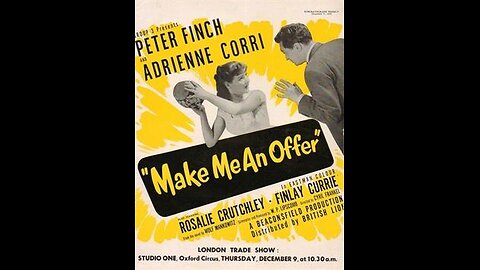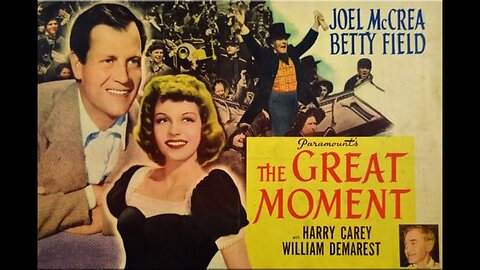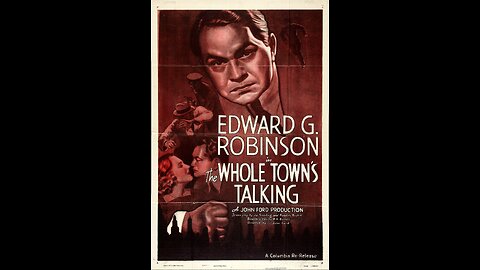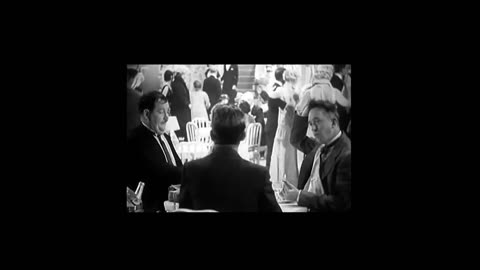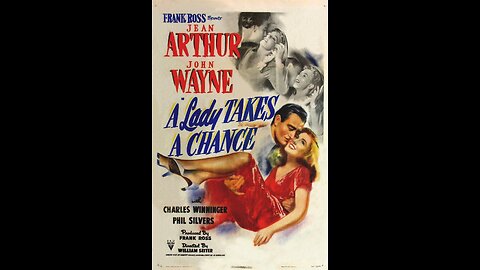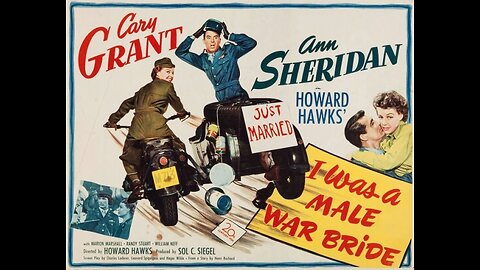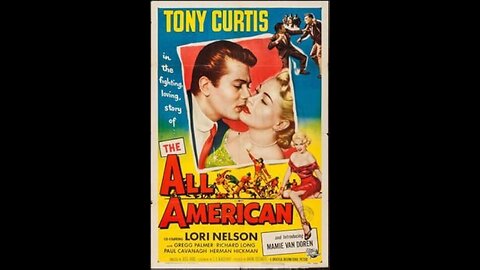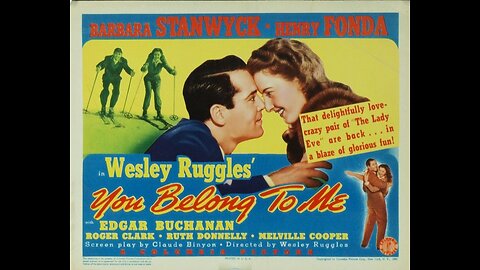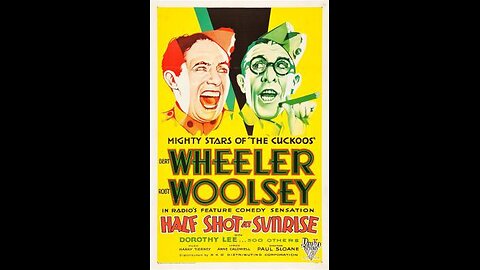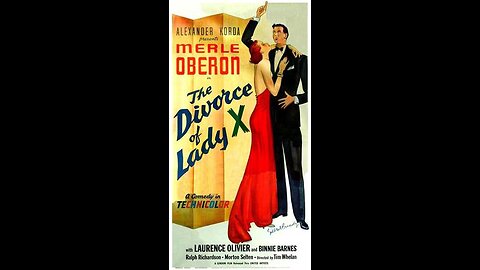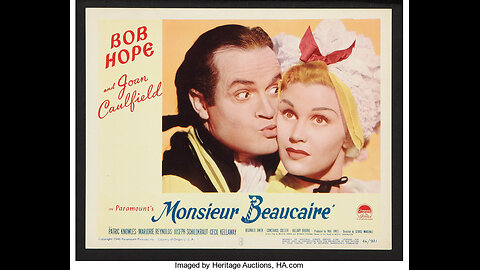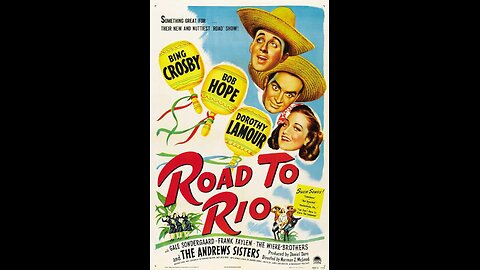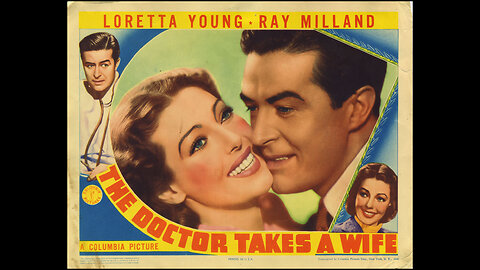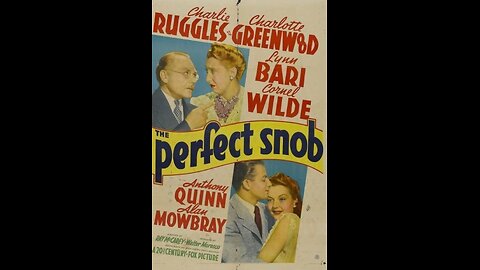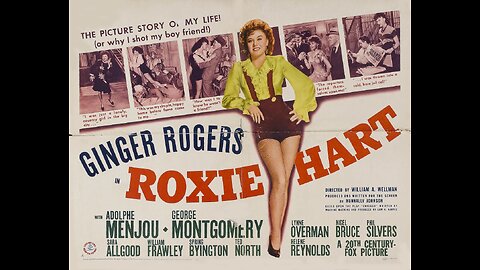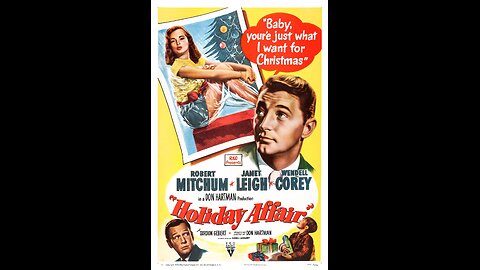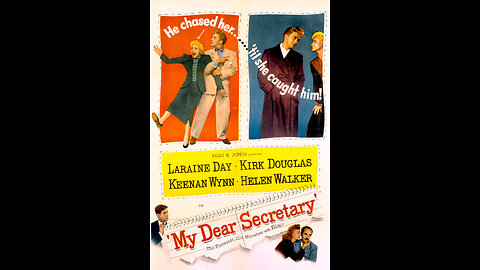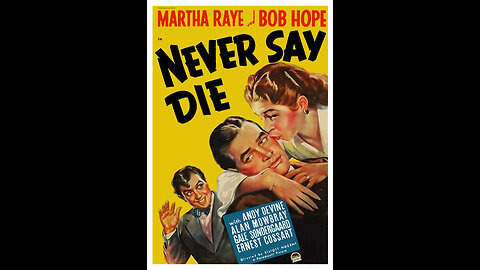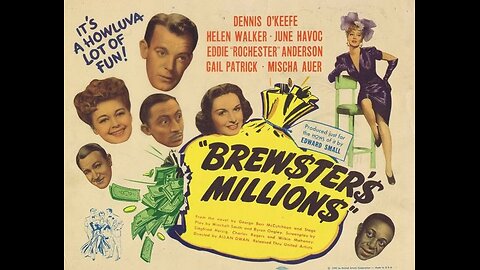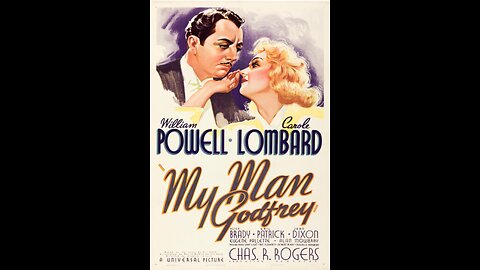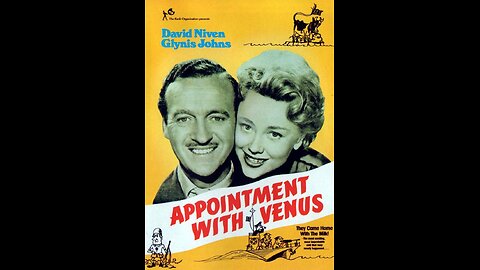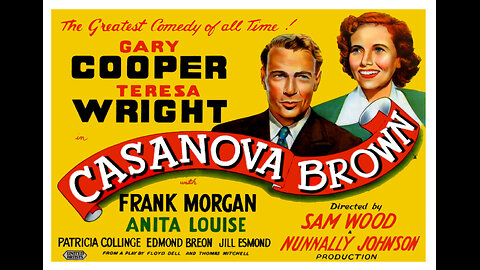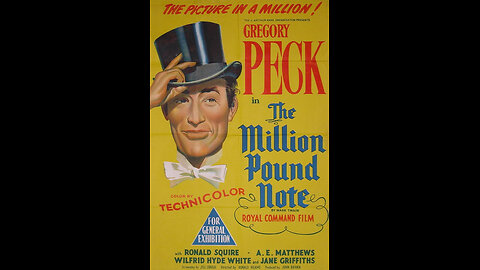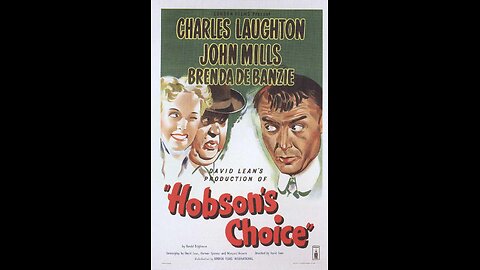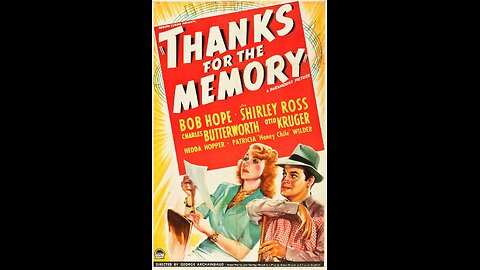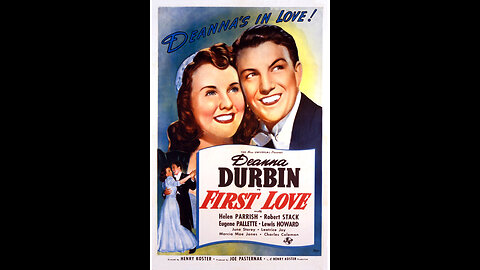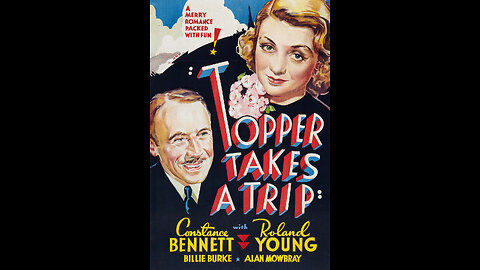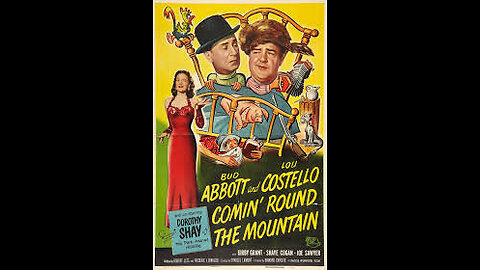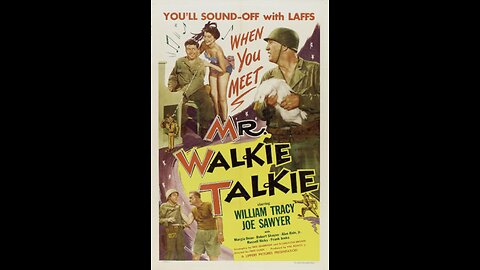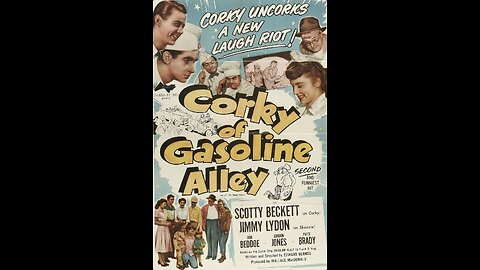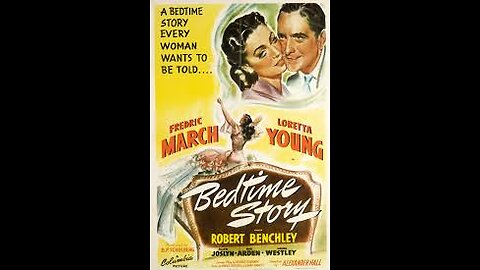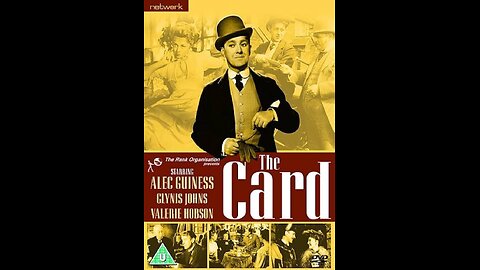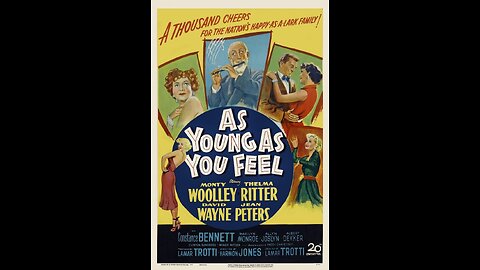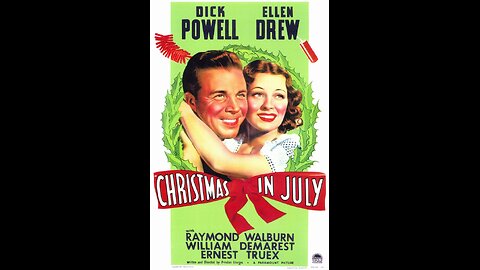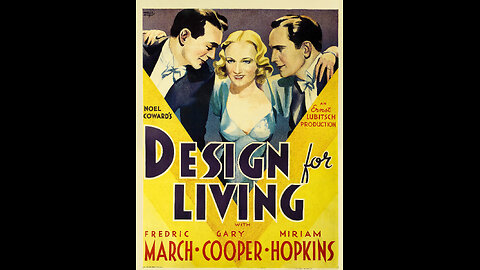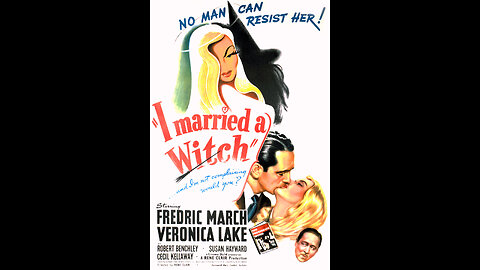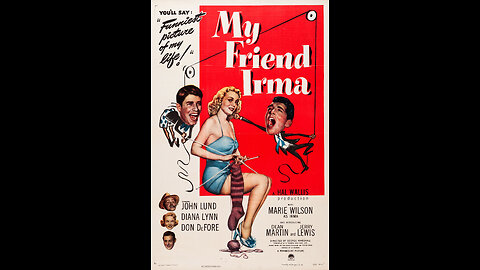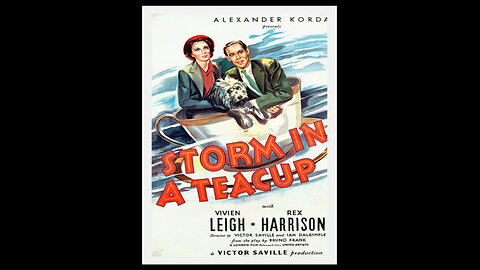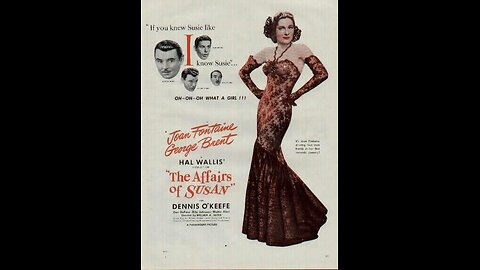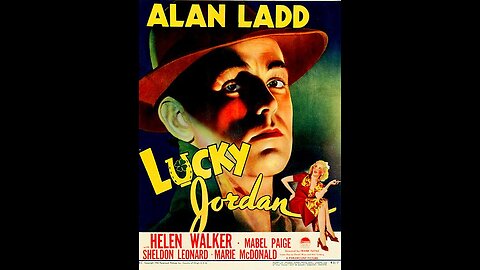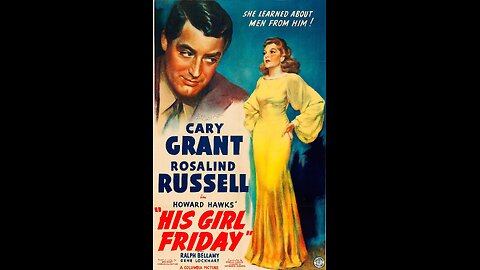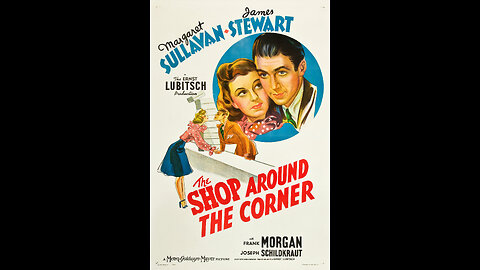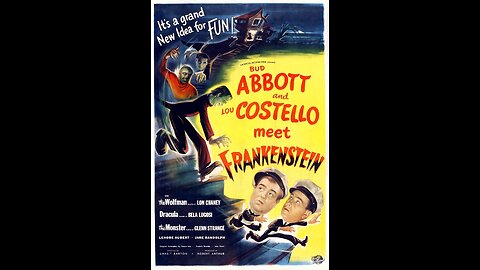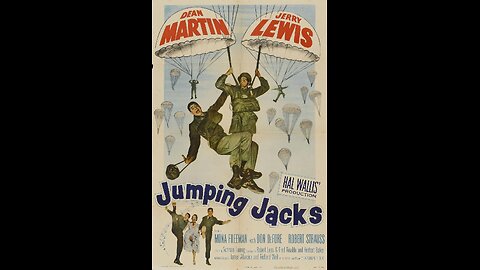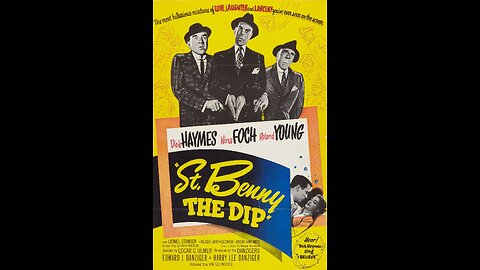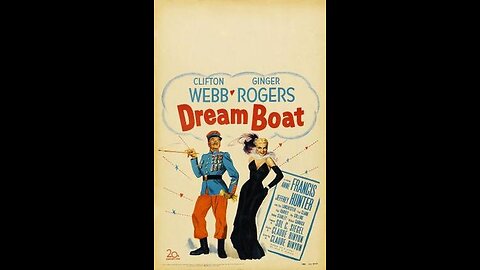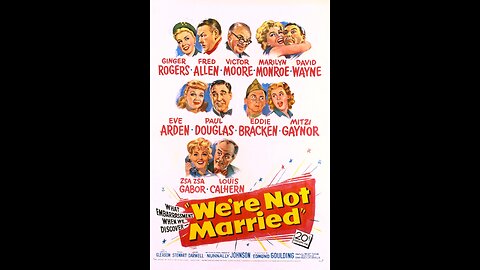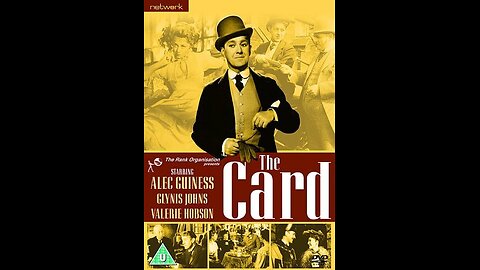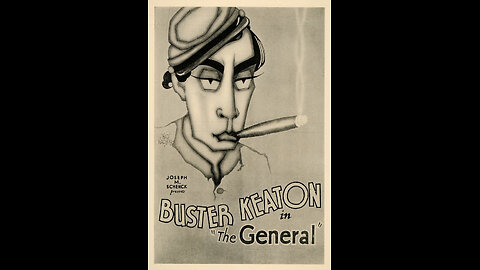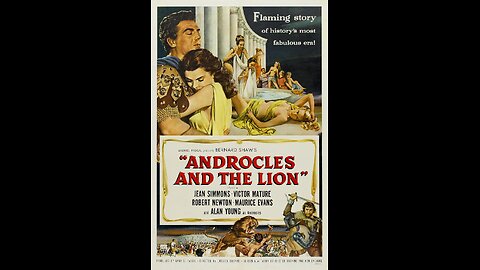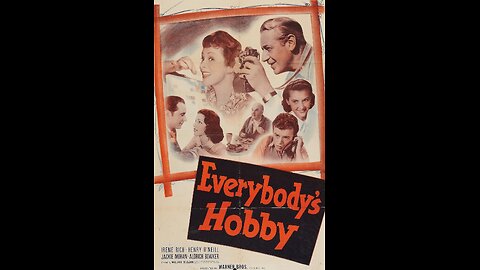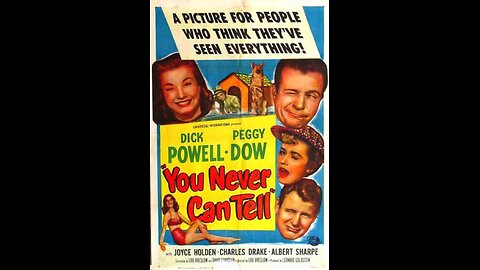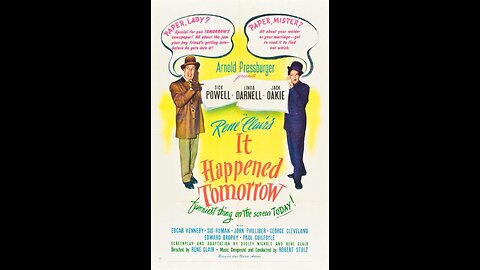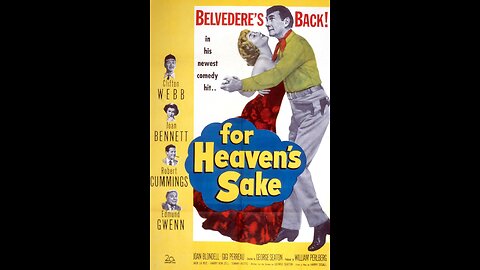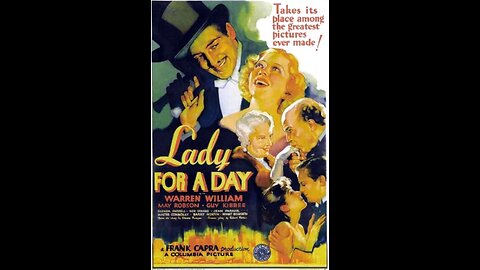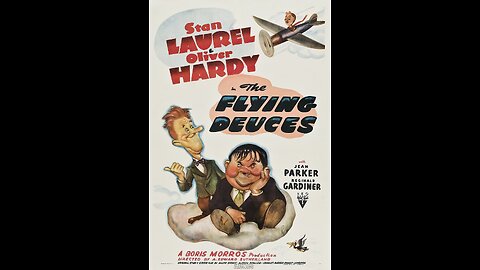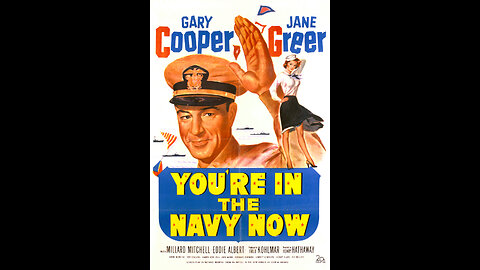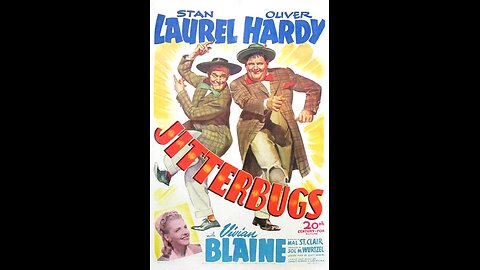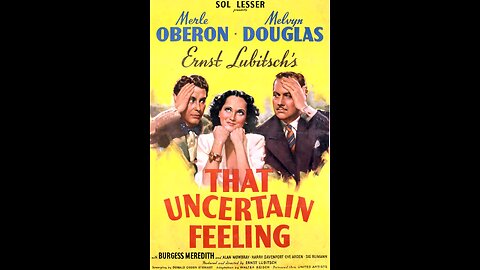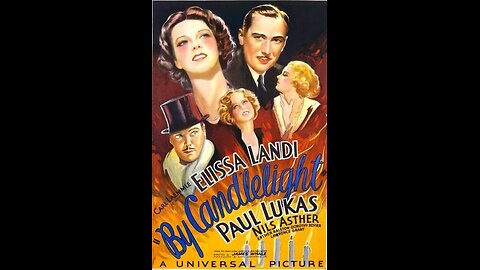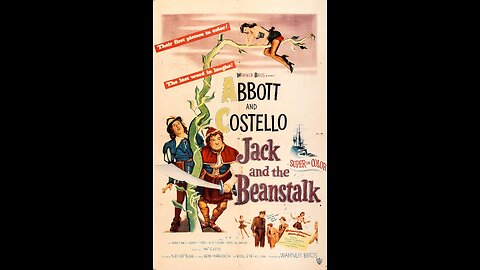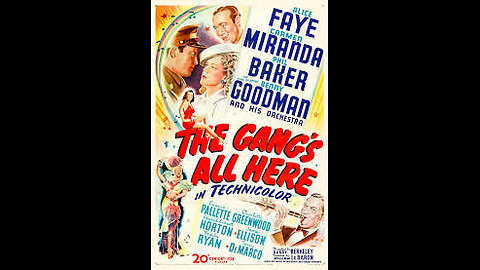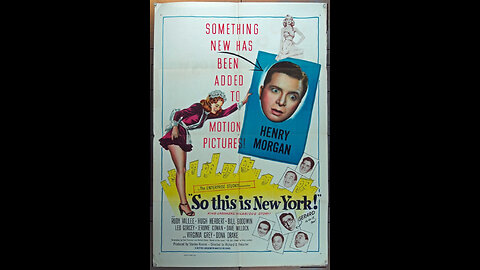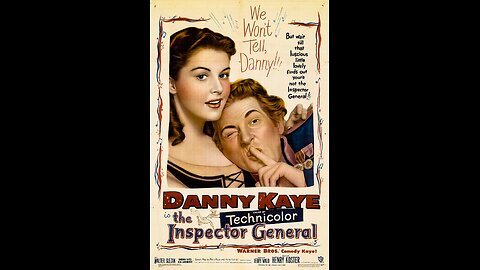Premium Only Content
This video is only available to Rumble Premium subscribers. Subscribe to
enjoy exclusive content and ad-free viewing.
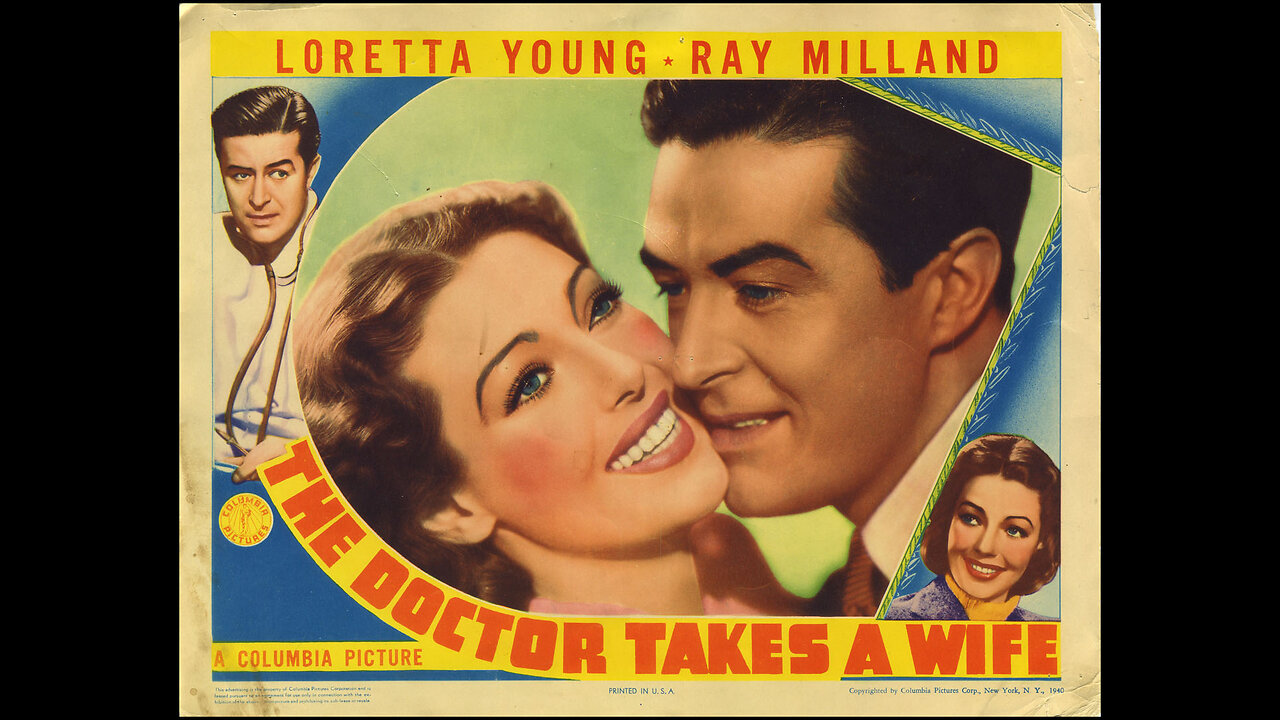
Comedy Classics
Cinema2000
- 26 / 113
1
Make Me an Offer! (1954) | Directed by Cyril Frankel
Classic Films & Movies Archive
"Make Me an Offer!" is a British comedy that follows the mischievous escapades of Charlie, an ambitious antiques dealer determined to secure a rare piece of Wedgwood pottery. Armed with a keen eye for undervalued treasures, he schemes to outbid his rivals and score the ultimate deal. Along the way, Charlie’s relentless pursuit of fortune leads to comedic mishaps, rivalry, and unexpected revelations about what truly matters.
Genre: Comedy
Director: Cyril Frankel
Cyril Frankel was a British film and television director noted for his engaging storytelling and an ability to capture quintessentially British themes. His portfolio spanned various genres, from comedies to thrillers, including work on the popular TV series "The Avengers." With "Make Me an Offer!" he delivered a charming insight into the antiques world, blending humor and character-driven charm.
Star Cast:
- Peter Finch as Charlie
- Adrienne Corri as Stella
- Mary Peach as Margaret
- Ernest Thesiger as Sir John
"Make Me an Offer!" garnered positive reviews in the UK, lauded for its witty script and lighthearted take on the antiques business. Audiences found Peter Finch’s comedic turn refreshing, given his reputation for more dramatic roles. Though not a major international commercial success, the film remains a cult favorite among enthusiasts of mid-century British comedies.
Fun Facts:
- Peter Finch, typically cast in serious or romantic roles, surprised viewers with his comedic talent.
- The film’s plot was derived from a successful radio play, helping to shape its snappy dialogue and situational humor.
- Ernest Thesiger, famous for his part in "The Bride of Frankenstein," contributed a memorable eccentricity to his role as Sir John.
- Focused on Wedgwood pottery, the movie offered an unusual but endearing glimpse into the competitive antiques trade.
- "Make Me an Offer!" influenced later British comedies that showcased quirky professions and niche subcultures, highlighting the humorous side of specialized trades.
2
The Great Moment (1944) | American biographical comedy-drama film directed by Preston Sturges
Classic Films & Movies Archive
"The Great Moment" is a 1944 American biographical comedy-drama film directed by Preston Sturges. The film is based on the life of Dr. William Thomas Green Morton, a dentist who played a pivotal role in the development of surgical anesthesia. While categorized as a biographical drama, Sturges' signature wit and humor are evident in the storytelling.
The film opens with Dr. William T. G. Morton (played by Joel McCrea), a dentist in the mid-19th century, struggling with his career and financial stability. Morton is determined to make a significant contribution to the field of medicine, and he becomes obsessed with the idea of finding a way to perform painless surgery.
Driven by his ambition, Morton experiments with various substances to achieve anesthesia, ultimately discovering the properties of ether. He convinces Dr. Charles Jackson (played by William Demarest), a charismatic but eccentric lecturer, to collaborate with him in presenting their findings to the medical community.
Morton's journey is marked by challenges, including skepticism from the medical establishment and financial difficulties. However, when he successfully uses ether to perform painless surgery in a public demonstration, he believes his moment of greatness has arrived.
The narrative unfolds through a series of flashbacks, framed by Morton's trial for patent infringement. The film explores Morton's relationships, including his romance with Elizabeth Whitman (played by Betty Field), and the ethical dilemmas associated with his pursuit of recognition.
Preston Sturges infuses the story with his trademark blend of humor and social commentary. Despite the serious subject matter, the film maintains a lighthearted tone, utilizing witty dialogue and comedic situations to engage the audience.
Joel McCrea delivers a compelling performance as the determined and sometimes flawed Dr. Morton, capturing both the character's passion for his work and the complexities of his personal life. The supporting cast, including William Demarest and Betty Field, adds depth to the narrative.
Joel McCrea (Dr. William T. G. Morton): McCrea portrays the ambitious dentist with a mix of sincerity and humor, embodying the character's quest for recognition.
William Demarest (Dr. Charles Jackson): Demarest adds comedic flair to the film as Morton's eccentric collaborator.
While "The Great Moment" wasn't as commercially successful as some of Sturges' earlier works, it has gained appreciation over the years for its unique approach to the biographical genre. Sturges' ability to infuse humor into historical narratives and Joel McCrea's charismatic performance contribute to the film's enduring appeal for audiences interested in both history and classic Hollywood comedy.
3
For the Love of Mary (1948) | Director: Frederick De Cordova
Classic Films & Movies Archive
"For the Love of Mary" (1948), directed by Frederick De Cordova, is a delightful romantic comedy that weaves a charming tale of love, laughter, and mistaken identity. Starring Deanna Durbin in the titular role, the film captures the essence of post-war optimism while delivering a delightful blend of romance and humor.
Mary Peppertree (Deanna Durbin) is a devoted secretary to the wealthy Thatch family. When her employer passes away, Mary finds herself embroiled in a series of amusing misunderstandings as she becomes the focus of the Thatch family's romantic pursuits. Complicating matters further is the arrival of an investigative reporter, Lawrence "Larry" Delavane (Edmond O'Brien), whose assignment is to uncover the truth behind the Thatch family's affairs.
Frederick De Cordova's direction brings a light-hearted and endearing touch to the narrative, allowing the comedic situations to unfold with impeccable timing. Deanna Durbin's effervescent performance adds to the film's appeal, making Mary a lovable and relatable character as she navigates the complexities of love and mistaken identities.
The supporting cast, including Don Taylor, Jeffrey Lynn, and Ray Collins, contributes to the film's comedic charm with their engaging portrayals of the Thatch family members caught up in the whirlwind of romantic entanglements.
Set against the backdrop of a post-war America, "For the Love of Mary" exudes a sense of optimism and joy, providing audiences with a delightful escape into a world where love triumphs over misunderstandings. The film's witty dialogue, romantic entanglements, and feel-good atmosphere make it a timeless classic that continues to enchant audiences with its heartwarming blend of romance and comedy.
"For the Love of Mary" remains a testament to the enduring appeal of romantic comedies from the Golden Age of Hollywood, offering a delightful cinematic experience that leaves audiences with smiles and a warm appreciation for the power of love.
4
The Whole Town's Talking (1935) | Directed by John Ford
Classic Films & Movies Archive
"The Whole Town's Talking" (1935) is a captivating blend of comedy and crime directed by John Ford, offering a delightful exploration of mistaken identity and the humorous consequences that ensue. Starring Edward G. Robinson in a dual role, the film showcases his versatility as an actor in this lighthearted yet suspenseful tale.
The story revolves around mild-mannered Arthur Ferguson Jones (Edward G. Robinson), an ordinary clerk whose life takes an unexpected turn when he happens to resemble the notorious gangster "Killer" Mannion. Mistaken for the criminal, Jones becomes unwittingly entangled in a web of chaos and intrigue as the whole town becomes convinced that he is the infamous Mannion.
As Jones grapples with his newfound notoriety, the film unfolds into a clever and entertaining exploration of identity, justice, and the quirks of human nature. With humor and charm, "The Whole Town's Talking" takes the audience on a rollercoaster ride through the consequences of mistaken identity, showcasing Robinson's comedic talents as he navigates the challenges of living a double life.
With a stellar supporting cast, including Jean Arthur and Wallace Ford, the film combines elements of screwball comedy with a crime caper, creating a cinematic experience that is both engaging and highly entertaining. "The Whole Town's Talking" remains a classic gem from the Golden Age of Hollywood, offering a perfect blend of humor, suspense, and the timeless appeal of a well-executed mistaken identity plot.
5
Princess O'Rourke (1943) | A charming romantic comedy directed by Norman Krasna
Classic Films & Movies Archive
"Princess O'Rourke" (1943) is a charming romantic comedy directed by Norman Krasna, set against the backdrop of World War II. This enchanting film tells the tale of a chance encounter that leads to an unexpected romance, blending elements of humor, romance, and a touch of fairy-tale whimsy.
The story revolves around Princess Maria (Olivia de Havilland), the heir to the throne of an unnamed European country. When her plane is forced to make an emergency landing in New York City, Maria decides to experience life as an ordinary person and escapes her royal entourage. In the city, she meets and falls for the charming pilot Eddie O'Rourke (Robert Cummings), who remains blissfully unaware of her true identity.
As Maria grapples with the dilemma of revealing her royal status, the film unfolds into a delightful exploration of love, duty, and the magic of unexpected connections. The sparkling chemistry between de Havilland and Cummings adds to the film's appeal, creating a romantic escapade that captivates audiences with its humor and heart.
"Princess O'Rourke" is not only a delightful romantic comedy but also serves as a wartime diversion, offering audiences a lighthearted respite during a challenging period in history. With its enchanting premise and charismatic performances, the film stands as a testament to the enduring allure of classic Hollywood romance.
Featuring a blend of whimsy, humor, and heartfelt moments, "Princess O'Rourke" invites viewers into a fairy-tale world where love knows no boundaries. This cinematic gem remains a delightful entry in the Golden Age of Hollywood's repertoire, showcasing the timeless appeal of love stories that transcend social status and borders.
6
The Awful Truth (1937) | Directed by the talented Leo McCarey
Classic Films & Movies Archive
"The Awful Truth" (1937) is a sparkling screwball comedy directed by the talented Leo McCarey, showcasing the effervescent chemistry between its lead stars, Irene Dunne and Cary Grant. This classic film offers a hilarious and sophisticated exploration of love, divorce, and the absurdities of modern relationships.
The story follows Lucy Warriner (Irene Dunne) and Jerry Warriner (Cary Grant), a married couple whose relationship takes an unexpected turn when suspicions of infidelity arise. In a moment of impulsive decision-making, they decide to divorce, setting off a series of madcap misadventures as they each attempt to move on with their lives.
As Lucy and Jerry navigate the precarious world of dating and courtship, their efforts to find new partners lead to a delightful array of comedic situations. The film expertly balances witty dialogue, physical comedy, and clever situational humor, making it a standout example of the screwball comedy genre.
"The Awful Truth" is celebrated for its sophisticated humor and the irresistible charm of its stars. Dunne and Grant deliver impeccable performances, infusing the film with charisma and comedic brilliance. The movie not only entertains with its laughter-inducing scenarios but also provides a nuanced commentary on the complexities of love and marriage.
With its sharp writing, impeccable timing, and the undeniable appeal of its lead actors, "The Awful Truth" has stood the test of time as a classic in the realm of romantic comedies. This cinematic gem remains a testament to the enduring popularity of screwball comedies from the Golden Age of Hollywood.
7
The Lady in Question (1940) | A captivating mystery-comedy film directed by Charles Vidor
Classic Films & Movies Archive
"The Lady in Question" (1940) is a captivating mystery-comedy film directed by Charles Vidor that weaves together elements of suspense, romance, and humor in a classic whodunit narrative. Starring the radiant Rita Hayworth and the charismatic Glenn Ford, the film takes the audience on a thrilling journey through a world of intrigue and mistaken identities.
The story revolves around a glamorous concert pianist, Joyce (Rita Hayworth), who becomes embroiled in a murder investigation when her neighbor is found dead. The plot thickens when a suave newspaper reporter, played by Glenn Ford, begins to investigate, leading to a series of amusing and suspenseful twists.
Set against the backdrop of a high-society musical event, the film skillfully blends elements of comedy and suspense, keeping the audience on the edge of their seats while delivering moments of genuine wit and charm. Rita Hayworth's magnetic presence and Glenn Ford's charismatic performance contribute to the film's overall appeal.
"The Lady in Question" stands out as a delightful entry in the mystery-comedy genre of the era, offering a perfect blend of romance, intrigue, and lighthearted humor. With its stylish cinematography, engaging plot, and the chemistry between its lead actors, the film continues to entertain audiences as a classic example of Hollywood's Golden Age cinema. Step into a world of glamour, mystery, and laughter with "The Lady in Question."
8
Where There's Life (1947) | Directed by Sidney Lanfield
Classic Films & Movies Archive
"Where There's Life" (1947) is a delightful comedy directed by Sidney Lanfield that combines elements of romance, adventure, and mistaken identity. Starring Bob Hope and Signe Hasso, this classic film delivers a blend of humor and intrigue, showcasing the wit and charm of its lead actors.
The story follows Michael Valentine (Bob Hope), an American radio personality who unexpectedly finds himself embroiled in a complex political plot. Mistaken for a missing foreign king, Valentine becomes the target of various factions vying for control. Along the way, he encounters the captivating and mysterious Anna (Signe Hasso), further complicating his predicament.
"Where There's Life" unfolds with a series of humorous escapades as Valentine navigates the dangerous world of international politics while trying to prove his true identity. Bob Hope's comedic prowess is on full display, providing audiences with a steady stream of laughs as the plot twists and turns.
The film's engaging narrative, lively pace, and charismatic performances make "Where There's Life" an entertaining cinematic experience. With its clever humor, unexpected twists, and a touch of romance, the movie captures the essence of classic screwball comedies of the era.
Join Bob Hope on a whirlwind adventure filled with laughter and intrigue in "Where There's Life." This timeless comedy remains a testament to the enduring appeal of classic Hollywood humor and the charisma of one of its legendary comedic talents.
9
Classic Films Archive Live Stream : Classic Comedy
Classic Films & Movies Archive
Laurel and Hardy were one of the most iconic and beloved comedy duos in the history of film and entertainment. The duo consisted of Stan Laurel (1890–1965) and Oliver Hardy (1892–1957), and they became synonymous with slapstick comedy during the early and mid-20th century.
10
The Great Moment (1944) | A historical comedy-drama directed by Preston Sturges
Classic Films & Movies Archive
"The Great Moment" (1944) is a historical comedy-drama directed by Preston Sturges, offering a unique and satirical take on the life of Dr. W. T. G. Morton, a pioneering figure in the field of anesthesia. Starring Joel McCrea as Dr. Morton, the film explores the challenges and triumphs of this medical innovator in a captivating and entertaining manner.
The story follows Dr. Morton's journey as he strives to introduce ether as an effective anesthesia during surgical procedures, despite facing skepticism and opposition from the medical community. McCrea's performance brings depth and humor to the character, capturing the essence of a determined and unconventional figure in the history of medicine.
Preston Sturges, known for his distinctive blend of wit and social commentary, infuses "The Great Moment" with his signature style. The film combines elements of historical drama, humor, and a touch of romance, providing audiences with an engaging and thought-provoking exploration of scientific discovery and societal resistance.
As Dr. Morton navigates the complexities of medical innovation, the film sheds light on the personal and professional challenges faced by those who dare to defy convention. "The Great Moment" stands as a testament to Sturges' storytelling prowess and the ability to tackle serious subjects with a comedic touch.
Step back in time and witness a chapter of medical history unfold in "The Great Moment." With its compelling narrative, memorable performances, and Sturges' trademark wit, this film offers a unique cinematic experience that brings to life the fascinating story of a man who changed the course of medicine against all odds.
11
The Jackpot (1950) | Directed by Walter Lang
Classic Films & Movies Archive
"The Jackpot" (1950) is a classic comedy film directed by Walter Lang, offering audiences a delightful and humorous exploration of the unexpected challenges that arise when fortune smiles on the unlikeliest of recipients. Starring James Stewart and Barbara Hale, this lighthearted romp takes viewers on a comedic journey through the complexities of newfound wealth.
The plot centers around Bill Lawrence (James Stewart), an ordinary Joe working as a TV repairman, whose life takes a dramatic turn when he wins a substantial jackpot. Suddenly thrust into the world of the rich and famous, Bill grapples with the challenges of managing his newfound fortune, dealing with newfound social circles, and navigating the pitfalls of unexpected prosperity.
Walter Lang's direction infuses the film with a blend of charm and humor, while James Stewart's affable performance adds depth to the character of Bill Lawrence. Barbara Hale provides a delightful counterpart as Bill's wife, and the film cleverly explores the comedic possibilities and social commentaries that come with a sudden windfall.
"The Jackpot" (1950) stands as a testament to the timeless appeal of rags-to-riches stories, offering audiences a humorous and heartwarming exploration of the impact of wealth on an ordinary man's life. With its engaging narrative, witty dialogue, and charismatic performances, the film remains a delightful cinematic experience that showcases the talents of its cast and the comedic sensibilities of its era.
Embark on a laughter-filled adventure with "The Jackpot," a classic comedy that proves that hitting the jackpot might be just the beginning of life's grandest escapades.
12
Sorrowful Jones (1949) | A heartwarming comedy-drama directed by Sidney Lanfield
Classic Films & Movies Archive
"Sorrowful Jones" (1949) is a heartwarming comedy-drama directed by Sidney Lanfield, featuring a charming blend of humor and sentimentality. Starring Bob Hope and Lucille Ball, this classic film offers a delightful exploration of an unlikely bond between a lovable gambler and a precocious child.
The story centers around Sorrowful Jones (Bob Hope), a small-time bookie with a penchant for comedic misadventures. When a neglected little girl named Martha Jane (Mary Jane Saunders) is left in his care, their lives take an unexpected turn. As Sorrowful reluctantly becomes a surrogate parent, their relationship evolves into a touching tale of love, responsibility, and personal growth.
Bob Hope's signature comedic timing shines as he navigates the challenges of parenthood with humor and heart. Lucille Ball adds her own brand of wit to the film, creating a dynamic on-screen chemistry that enhances the comedic and emotional moments.
Directed by Sidney Lanfield, "Sorrowful Jones" captures the essence of family, friendship, and the transformative power of unexpected connections. The film's lighthearted tone, coupled with sincere performances, makes it a timeless exploration of the human spirit.
Embark on a journey of laughter and warmth with "Sorrowful Jones," a classic film that reminds audiences of the enduring magic found in the unlikeliest of relationships. This cinematic gem continues to charm viewers with its delightful blend of comedy and heart, showcasing the talents of two iconic stars in a story that transcends generational boundaries.
13
A Lady Takes a Chance (1943) | Directed by William A. Seiter
Classic Films & Movies Archive
"A Lady Takes a Chance" (1943) is a delightful romantic comedy directed by William A. Seiter. Starring the iconic pairing of Jean Arthur and John Wayne, the film takes audiences on a charming journey through the American West. Jean Arthur plays Molly J. Truesdale, a spirited city girl looking for excitement, and John Wayne is the rugged rodeo cowboy she unexpectedly falls for.
Molly decides to leave her mundane urban life behind and takes a spontaneous trip to attend a rodeo in the West. Along the way, she crosses paths with the charismatic cowboy, Duke Hudkins (John Wayne), and what follows is a classic tale of opposites attracting. As Molly gets a taste of the unpredictable and adventurous world of rodeos, she finds herself torn between her city life and the allure of the cowboy way.
Filled with humor, romance, and the breathtaking landscapes of the American frontier, "A Lady Takes a Chance" is a feel-good classic that showcases the on-screen chemistry between Arthur and Wayne. The film captures the essence of love blossoming in unexpected places, making it a timeless and enjoyable cinematic experience for audiences of all ages.
1
comment
14
Meet John Doe (1941) | Directed by Frank Capra
Classic Films & Movies Archive
"Meet John Doe" is a classic 1941 film directed by Frank Capra that seamlessly blends comedy, drama, and social commentary.
Starring Gary Cooper as the titular character, the story follows a disenchanted and unemployed everyman who becomes an unwitting symbol of hope for a struggling nation. Barbara Stanwyck plays a savvy newspaper reporter who concocts the fictional character of John Doe to boost circulation. However, the situation takes an unexpected turn when the fabricated John Doe captures the public's imagination, leading to a movement that seeks to harness the power of collective goodwill. As the narrative unfolds, the film explores themes of individualism, community, and the impact of media on public perception.
With Capra's signature blend of wit, heart, and a touch of idealism, "Meet John Doe" remains a thought-provoking and relevant cinematic gem that resonates with audiences for its timeless exploration of the human spirit in the face of societal challenges.
15
Along Came Jones (1945) | Western Comedy directed by Stuart Heisler
Classic Films & Movies Archive
"Along Came Jones" is a 1945 Western comedy directed by Stuart Heisler. Starring Gary Cooper and Loretta Young, the film offers a unique blend of humor and action in the Old West. Melody Jones, played by Cooper, mistakenly finds himself branded an outlaw. With the help of the spirited Cherry de Longpre (Young), Jones tries to clear his name and confront the real criminals. Filled with witty dialogue and entertaining twists, "Along Came Jones" delivers a delightful Western experience that showcases the charm and charisma of its lead actors.
16
I Was a Male War Bride (1949) | A romantic comedy directed by Howard Hawks
Classic Films & Movies Archive
"I Was a Male War Bride" (1949) is a romantic comedy directed by Howard Hawks. Starring Cary Grant as Captain Henri Rochard and Ann Sheridan as Lieutenant Catherine Gates, the film revolves around the comedic challenges faced by Captain Rochard as he navigates bureaucratic obstacles and cultural clashes to marry Lieutenant Gates in post-war Europe. The story unfolds in a humorous and charming manner, exploring the unique circumstances of a male war bride.
Public Reaction:
Upon its release, the film received positive reviews for its witty humor, engaging performances by Cary Grant and Ann Sheridan, and the inventive premise. Audiences appreciated the delightful chemistry between the lead actors and the film's lighthearted approach to post-war scenarios. "I Was a Male War Bride" has endured as a classic romantic comedy, remembered for its entertaining narrative and the charismatic presence of its stars.
1
comment
17
All American (1953) | A sports comedy-drama that follows the journey of Nick Bonelli
Classic Films & Movies Archive
Director: Jesse Hibbs
Cast:
- Tony Curtis as Nick Bonelli
- Lori Nelson as Susie Ward
- Richard Long as Johnny Baker
- Mamie Van Doren as Susie Ward's Friend
- Gregg Palmer as Mr. Ward
- Anabel Shaw as Mrs. Ward
- Douglas Spencer as Mr. Bonelli
Plot Summary:
"All American" is a sports comedy-drama that follows the journey of Nick Bonelli, played by Tony Curtis, a talented high school football player with dreams of playing for a college team. Nick's skills on the football field catch the attention of college scouts, and he receives a scholarship to play at Western University.
Upon arriving at college, Nick faces the challenges of balancing academics, football practice, and navigating campus life. He quickly becomes the star quarterback, earning both admiration and rivalry from his teammates. Along the way, Nick develops a romantic interest in Susie Ward (Lori Nelson), adding a layer of personal drama to the story.
As the football season progresses, Nick must prove himself not only as an athlete but also as a team player. The film explores themes of friendship, loyalty, and the pursuit of dreams, all set against the backdrop of the competitive world of college football.
Themes:
"All American" delves into the pressures and expectations placed on student-athletes as they navigate the complexities of college life. It highlights the importance of teamwork, perseverance, and the personal growth that comes with facing challenges on and off the field.
Production and Reception:
Released in 1953, "All American" is a product of its time, reflecting the popularity of sports-themed films in the post-war era. Tony Curtis, in one of his early roles, brings charisma and energy to the character of Nick Bonelli. The film's blend of sports, romance, and humor appealed to audiences of the time.
While "All American" may not be as widely remembered as some other films of its era, it remains a notable entry in the sports comedy-drama genre, capturing the spirit of collegiate athletics in the 1950s.
18
You Belong to Me (1941) | Directed by Wesley Ruggles
Classic Films & Movies Archive
"You Belong to Me" is a 1941 romantic comedy film directed by Wesley Ruggles, featuring an ensemble cast in a delightful and heartwarming story. The film follows the charming and comedic misadventures of a radio quiz show host, Peter Kirk (played by Lee Bowman), who finds himself entangled in a love triangle.
The stellar cast includes Barbara Stanwyck, portraying the witty and independent Dr. Helen Hunt, a successful psychologist with a radio show. Stanwyck's dynamic performance brings depth and charisma to the character. Adolphe Menjou adds to the comedic charm as Paul, Peter Kirk's loyal friend, and Sterling Holloway provides additional laughs in a supporting role.
As the plot unfolds, Peter Kirk becomes the unwitting subject of one of Dr. Hunt's psychological experiments, leading to a series of comedic situations and romantic complications. The film explores themes of love, friendship, and the unpredictable nature of human emotions.
Upon its release, "You Belong to Me" received positive reviews for its delightful humor, engaging storyline, and the charismatic performances of the cast. Audiences were particularly enamored with the on-screen chemistry between Stanwyck and Bowman. The film's blend of romantic elements with comedic flair contributed to its success, making it a well-received and entertaining entry in the romantic comedy genre of the era. "You Belong to Me" remains a charming classic that continues to resonate with audiences who appreciate timeless romantic comedies.
19
Half Shot at Sunrise (1930) | Directed by Paul Sloane
Classic Films & Movies Archive
"Half Shot at Sunrise" is a 1930 American pre-Code comedy film directed by Paul Sloane. Starring the iconic comedy duo Wheeler & Woolsey, portrayed by Bert Wheeler and Robert Woolsey, the film follows the misadventures of two soldiers who go AWOL to enjoy a night of revelry in Paris.
The comedic chemistry between Wheeler and Woolsey shines as they navigate a series of humorous escapades. While public reaction at the time celebrated the film's uproarious humor and the duo's slapstick performances, "Half Shot at Sunrise" remains a delightful classic in the realm of early sound-era comedies.
20
Life with Father (1947) | Directed by Michael Curtiz
Classic Films & Movies Archive
"Life with Father" (1947) is a classic American comedy film directed by Michael Curtiz and based on the autobiographical play by Howard Lindsay and Russel Crouse. The film stars William Powell as Clarence Day Sr. and Irene Dunne as his wife, Vinnie Day, in the lead roles.
"Life with Father" is a heartwarming and humorous portrayal of the Day family's experiences in turn-of-the-century New York City. At the center of it all is Clarence Day Sr., a stern but lovable father who navigates the challenges of family life with his wife Vinnie and their four sons. The film captures the comedic and endearing moments of domesticity, from Clarence's attempts to maintain order in the household to the various eccentric characters who frequent the Day residence. As the Days face both everyday and extraordinary events, the film unfolds as a delightful exploration of family dynamics and the universal quirks that make a house a home.
- William Powell as Clarence Day Sr.
- Irene Dunne as Vinnie Day
- Elizabeth Taylor as Mary Skinner
- Edmund Gwenn as Rev. Dr. Lloyd
"Life with Father" was a critical and commercial success upon its release. Audiences embraced its charming depiction of family life, and the performances of William Powell and Irene Dunne were widely praised. The film received several Academy Award nominations, including Best Actor for William Powell and Best Art Direction. It remains a beloved classic, celebrated for its nostalgic charm, humor, and the timeless exploration of the joys and challenges of family relationships.
21
The Divorce of Lady X (1938) | Directed by Tim Whelan
Classic Films & Movies Archive
"The Divorce of Lady X" (1938) is a romantic comedy directed by Tim Whelan, starring the charismatic duo Laurence Olivier and Merle Oberon. This delightful film is a captivating blend of romance, humor, and mistaken identities, offering a charming escape to the audiences of its time.
Starring Roles:
- Laurence Olivier as Everard Logan
- Merle Oberon as Leslie Steele
Set in London, "The Divorce of Lady X" unfolds as a comedy of errors. Renowned divorce lawyer Everard Logan finds himself in a predicament when he mistakenly escorts Leslie Steele, a beautiful dress model, to a society ball, believing she is the lady he was supposed to meet. The mix-up leads to a series of amusing situations and misunderstandings.
As the night progresses, Logan and Leslie become entangled in a web of comic circumstances, complicated further by the presence of Lady Claire Mere, a client of Logan's, and her estranged husband. The plot takes unexpected turns as Logan tries to navigate the chaos while developing an unexpected connection with Leslie.
The film explores themes of love, mistaken identities, and societal expectations in a lighthearted and entertaining manner. The witty dialogue and comedic situations add to the overall charm of this classic romantic comedy.
"The Divorce of Lady X" was well-received by audiences upon its release in 1938. The film's success can be attributed to the on-screen chemistry between Laurence Olivier and Merle Oberon, who were a popular pairing in multiple films of the era. Audiences appreciated the humor, romance, and the overall escapism offered by the film, making it a delightful addition to the romantic comedy genre of its time. Today, it remains a classic example of the sophisticated and charming comedies produced during the Golden Age of Hollywood.
22
A Christmas Wish (1950) | Christmas comedy film directed by Irving Pichel
Classic Films & Movies Archive
"A Christmas Wish," also known as "The Great Rupert," is a heartwarming Christmas comedy film directed by Irving Pichel. The film was released in 1950 and is notable for its combination of live-action and stop-motion animation. Here's a detailed description:
Plot Summary:
The story revolves around the Amendola family, who are going through financial difficulties during the holiday season. The family consists of Joe (Jimmy Durante) and his wife Rosalba (Queenie Smith) along with their daughter Rosalinda (Terry Moore) and her boyfriend Pete (Tom Drake). They are struggling to make ends meet in a small apartment.
Unexpectedly, a squirrel named Rupert discovers a stash of money hidden in the wall of the Amendolas' apartment. Rupert, who has a penchant for collecting shiny objects, inadvertently scatters the money through the floorboards and into the Amendolas' apartment. The family is amazed when money seemingly falls from the ceiling.
As the Amendolas try to figure out the source of this unexpected financial windfall, the neighborhood is buzzing with excitement. Speculation arises about the mysterious benefactor, leading to a mix of joy, confusion, and comedic situations.
Meanwhile, Rosalinda dreams of becoming a successful Broadway dancer, and Pete aspires to be a successful songwriter. The newfound wealth provides opportunities for them to pursue their dreams.
Key Themes:
1. Christmas Spirit: The film embodies the spirit of Christmas, showcasing the magic of the season through unexpected acts of kindness and generosity.
2. Dreams and Aspirations: The characters' dreams and aspirations play a central role, illustrating how unexpected events can provide the chance for dreams to come true.
3. Community and Togetherness: The story emphasizes the importance of community and coming together, especially during the holiday season.
Production and Reception:
"A Christmas Wish" is known for its charming narrative and the inclusion of stop-motion animation featuring Rupert the squirrel. The film successfully blends comedy, fantasy, and holiday warmth, making it a beloved Christmas classic.
Irving Pichel's direction, coupled with the performances of the cast, contributes to the film's enduring appeal. While it may not have achieved immediate commercial success upon its release, "A Christmas Wish" has since gained recognition as a delightful and heartwarming Christmas film, often cherished by audiences during the holiday season.
23
Monsieur Beaucaire (1946) | Directed by George Marshall
Classic Films & Movies Archive
- Bob Hope as Monsieur Beaucaire
- Joan Caulfield as Princess Maria
- Patric Knowles as the Duke of Winterset
- Marjorie Reynolds as Lady Mary
- Cecil Kellaway as the King of France
Monsieur Beaucaire is a swashbuckling comedy set in 18th-century France. Bob Hope stars as the titular character, a barber who, through a series of mistaken identities, finds himself in the court of King Louis XV. When the King is unable to attend a planned tryst with the beautiful Princess Maria, played by Joan Caulfield, Beaucaire steps in to maintain the peace. However, as he takes on the guise of a nobleman, comedic chaos ensues, and Beaucaire must navigate the intricacies of courtly life while attempting to win the heart of the princess.
Monsieur Beaucaire was generally well-received by audiences, particularly for Bob Hope's comedic performance and the film's lighthearted tone. The movie's blend of historical adventure, mistaken identities, and romantic entanglements appealed to fans of Hope's signature style of humor. While not considered one of the groundbreaking classics of its time, Monsieur Beaucaire remains an enjoyable and entertaining entry in Bob Hope's filmography, showcasing his comedic talents in a period setting.
24
Road to Rio (1947) | Directed by Norman Z. McLeod
Classic Films & Movies Archive
Road to Rio is the fifth installment in the popular "Road to..." film series starring Bing Crosby, Bob Hope, and Dorothy Lamour. Directed by Norman Z. McLeod, the film follows the comedic adventures of musicians Scat Sweeney (Crosby) and Hot Lips Barton (Hope) as they find themselves entangled in a series of misadventures in Rio de Janeiro. The duo accidentally becomes implicated in a murder, leading to a humorous escape and a journey filled with romance, musical performances, and slapstick comedy.
As they navigate the Brazilian landscape, Scat and Hot Lips encounter colorful characters, including the beautiful Lucia Maria de Andrade (Lamour). The film combines elements of comedy, romance, and musical performances, characteristic of the "Road to..." series.
- Bing Crosby as Scat Sweeney
- Bob Hope as Hot Lips Barton
- Dorothy Lamour as Lucia Maria de Andrade
- Gale Sondergaard as Catherine Vail
- Frank Faylen as Johnson
- Joseph Vitale as Cardoso
Road to Rio received positive reviews upon its release, with audiences and critics praising the chemistry between Bing Crosby and Bob Hope. The film's blend of humor, musical numbers, and exotic settings contributed to its success. The witty banter and comedic timing between the two lead actors became a trademark of the series. Road to Rio remains a beloved classic, remembered for its entertainment value and the enduring partnership between Crosby and Hope.
25
Here Comes Mr. Jordan (1941) | Directed by Alexander Hall
Classic Films & Movies Archive
"Here Comes Mr. Jordan" is a 1941 fantasy romantic comedy film directed by Alexander Hall. The cast includes:
1. Robert Montgomery as Joe Pendleton
2. Evelyn Keyes as Bette Logan
3. Claude Rains as Mr. Jordan
4. Rita Johnson as Julia Farnsworth
5. Edward Everett Horton as Messenger 7013
6. James Gleason as Max Corkle
7. John Emery as Tony Abbott
8. Donald MacBride as Insp. Williams
9. Halliwell Hobbes as Sisk
10. Benny Rubin as Lefty
The story follows Joe Pendleton, a boxer who is mistakenly taken to the afterlife before his time. Mr. Jordan, the celestial guardian, endeavors to correct the error, leading to a series of comedic and heartwarming events. The film explores themes of destiny, second chances, and the cosmic order.
The Doctor Takes a Wife (1940) | Directed by Alexander Hall
Classic Films & Movies Archive
"The Doctor Takes a Wife" is a 1940 romantic comedy film directed by Alexander Hall. The main cast includes:
1. Loretta Young as June Cameron
2. Ray Milland as Dr. Timothy Sterling
3. Reginald Gardiner as Freddie
4. Gail Patrick as Gloria
5. Edmund Gwenn as Mr. Shunderson
6. Walter Kingsford as Dr. Lionel Sterling
7. Alma Kruger as Mrs. Sterling
8. Charles Coburn as Dean Harcourt
The film revolves around the premise of a newspaper woman, June Cameron, pretending to be married to a research scientist, Dr. Timothy Sterling, in order to secure a job. As their fake marriage becomes increasingly complicated, the couple navigates humorous situations that lead to unexpected romantic developments.
27
The Perfect Snob (1941) | Directed by Ray McCarey
Classic Films & Movies Archive
"The Perfect Snob" is a delightful comedy that unfolds in a small town, focusing on veterinarian Dr. Edgar Mason (Charlie Ruggles) and his daughter Chris (Lynn Bari). When Chris announces her intention to marry wealthy Freddie Browning (Alan Mowbray), orchestrated by his gold-digging wife Martha (Charlotte Greenwood), Dr. Mason hatches a plan. He hires young Mike Lord (Cornel Wilde) to romance Chris and break off the engagement. However, complications arise when Lord genuinely falls for Chris. To test her intentions, Lord enlists his friend Alexander Moreno (Anthony Quinn) to pose as a wealthy suitor, leading to a humorous and romantic entanglement.
Characterization and Performances:
The cast delivers charming performances, with Charlie Ruggles as the disapproving yet endearing father, Lynn Bari as the daughter caught in a romantic predicament, and Cornel Wilde as the earnest pursuer. Anthony Quinn adds flair as the wealthy but feigned suitor, and Charlotte Greenwood shines as the conniving Martha. Each character contributes to the comedic and romantic elements of the story.
Comedy and Romance:
The film seamlessly blends comedy and romance, creating a lighthearted and entertaining narrative. The plot's twists and turns, from the initial scheme to the introduction of the wealthy suitor Moreno, provide ample humor. The romantic tension between Lord and Chris adds depth to the story, keeping the audience engaged.
Plot Twists and Contrivances:
The narrative employs clever plot twists and contrivances that contribute to the comedic elements. From the fake telegram about Moreno's bankruptcy to the revelation of Lord's true wealth, the film navigates these twists with a light touch, maintaining an air of delightful absurdity.
Social Commentary and Satire:
Beneath its comedic surface, "The Perfect Snob" offers subtle social commentary on societal expectations and the pursuit of wealth. The film satirizes the idea of social status and the lengths some may go to secure a prosperous marriage.
Cinematography and Direction:
Directed by Ray McCarey, the film features straightforward yet effective cinematography that serves the comedic and romantic tone. The pacing is well-balanced, allowing the humor to unfold naturally, and the direction ensures that the performances shine in moments of both wit and sincerity.
Conclusion:
"The Perfect Snob" is a delightful comedy with a touch of romance that showcases the talents of its ensemble cast. The film's clever plot, charming characters, and humorous twists make it an enjoyable watch. While not necessarily a well-known classic, its ability to blend romance and comedy in a light-hearted manner adds to its charm. For fans of classic comedies with a romantic twist, "The Perfect Snob" offers an entertaining and endearing cinematic experience.
28
Roxie Hart (1942) | American comedy film directed by William A. Wellman
Classic Films & Movies Archive
"Roxie Hart" is a 1942 American comedy film directed by William A. Wellman. Starring Ginger Rogers in the title role, the film is a satirical take on the justice system and media sensationalism.
**Starring:**
- Ginger Rogers as Roxie Hart
- Adolphe Menjou as Billy Flynn
- George Montgomery as Homer Howard
- Lynne Overman as Jake Callahan
- Nigel Bruce as E. Clay Benham
- Phil Silvers as Babe
**Plot:**
Roxie Hart is a showgirl who shoots her lover but becomes a media sensation and hires charismatic lawyer Billy Flynn to turn her trial into a public spectacle.
**Public Reaction:**
"Roxie Hart" received positive reviews for Ginger Rogers' comedic performance and the film's satirical take on the legal system. While not a blockbuster, it was well-received by audiences of its time for its entertaining storyline and witty humor. The film remains a notable entry in Ginger Rogers' diverse filmography.
29
Nothing But The Truth (1941) | Directed by Elliott Nugent
Classic Films & Movies Archive
Step into the captivating world of classic Hollywood with "Nothing But The Truth," a delightful 1941 comedy starring the legendary Bob Hope and the enchanting Paulette Goddard. Directed by Elliott Nugent, this film takes audiences on a hilarious journey filled with misunderstandings, witty banter, and comedic charm.
Bob Hope as Steve Bennett: The charismatic and quick-witted Bob Hope plays the lead role of Steve Bennett. Known for his impeccable comedic timing, Hope brings his signature humor to the character, making "Nothing But The Truth" a laughter-filled escapade.
Paulette Goddard as Gwen Saunders: The talented Paulette Goddard complements Hope's performance as Gwen Saunders, adding a touch of sophistication and humor to the dynamic duo. Her on-screen chemistry with Bob Hope creates a delightful interplay that is sure to entertain audiences.
"Nothing But The Truth" revolves around Steve Bennett, a stockbroker played by Bob Hope, who finds himself entangled in a web of humorous misunderstandings. The plot takes a hilarious turn when Bennett, as a part of a practical joke, tells the truth for an entire day, leading to a series of comical situations and misunderstandings. Paulette Goddard's character, Gwen Saunders, adds an extra layer of charm and humor to the narrative as the events unfold.
Upon its release, "Nothing But The Truth" was met with positive public reaction, praised for its witty dialogue, comedic performances, and the undeniable chemistry between Bob Hope and Paulette Goddard. Audiences of the time appreciated the film's lighthearted approach to storytelling, providing a welcome escape during the challenging years of the early 1940s.
Bob Hope's comedic genius and Paulette Goddard's endearing presence were particularly highlighted in reviews, with critics and viewers alike lauding the film's ability to deliver laughter and joy. The film's success at the box office further solidified its status as a classic comedy that continues to be enjoyed by audiences today.
"Nothing But The Truth" remains a timeless piece of cinematic history, showcasing the comedic talents of two iconic actors in the golden age of Hollywood. With its enduring appeal and the charm of its lead stars, this 1941 classic is a must-watch for fans of classic comedy and those seeking a good-natured laugh from the past.
30
The Talk of the Town (1942) | Directed by George Stevens
Classic Films & Movies Archive
"The Talk of the Town" (1942), directed by George Stevens, is a delightful blend of comedy, drama, and romance. The story unfolds as Leopold Dilg (Cary Grant), a man wrongly accused of arson, seeks refuge in the home of a small-town schoolteacher, Nora Shelley (Jean Arthur). To complicate matters, a distinguished law professor, Michael Lightcap (Ronald Colman), becomes involved when he rents the house next door.
The film explores the unlikely friendship that develops among these three characters as they navigate legal challenges, moral dilemmas, and romantic tensions. As Dilg's case gains national attention, the trio finds themselves entangled in a mix of humor, suspense, and heartfelt moments.
Cary Grant delivers a charming performance as the wrongly accused fugitive, complemented by Jean Arthur's warmth and Ronald Colman's sophistication. The film showcases George Stevens' adept direction, skillfully balancing lighthearted moments with more serious themes.
"The Talk of the Town" is celebrated for its witty screenplay, engaging performances, and the exploration of justice and morality. The film deftly combines elements of screwball comedy with social commentary, making it a timeless and enjoyable classic that resonates with audiences for its humor and thought-provoking narrative.
Stars:
Cary Grant as Leopold Dilg
Jean Arthur as Nora Shelley
Ronald Colman as Professor Michael Lightcap
Edgar Buchanan as Sam Yates
Glenda Farrell as Regina Bush
Charles Dingle as Andrew Holmes
Emma Dunn as Sarah
31
Stage Door (1937) | Directed by Gregory La Cava
Classic Films & Movies Archive
"Stage Door" (1937), directed by Gregory La Cava, is a classic Hollywood comedy-drama set in the world of aspiring actresses living in a boarding house. The film brings together a stellar cast to explore the dreams, challenges, and camaraderie of young women pursuing careers on the stage.
Katharine Hepburn leads the ensemble as Terry Randall, a wealthy young woman with aspirations of becoming an actress. Ginger Rogers portrays Jean Maitland, a brassy and street-smart performer, and Adolphe Menjou takes on the role of Anthony Powell, a theatrical producer with a keen eye for talent.
The film unfolds in the boarding house where Terry and Jean reside, introducing a diverse group of aspiring actresses, each with her own ambitions and struggles. The dynamic between the characters creates a rich tapestry of friendship, rivalry, and the pursuit of artistic success.
"Stage Door" stands out for its sharp and witty dialogue, showcasing the talents of its leading ladies, especially Hepburn and Rogers. The film provides a behind-the-scenes look at the harsh realities of the entertainment industry while celebrating the resilience and camaraderie of those who dare to chase their dreams.
Gregory La Cava's direction brings a blend of humor and poignancy to the narrative, making "Stage Door" a timeless exploration of the sacrifices and triumphs inherent in the pursuit of a life in the theater. The film remains a beloved classic that captures the spirit of aspiring performers in the golden age of Hollywood.
Stars:
Katharine Hepburn as Terry Randall
Ginger Rogers as Jean Maitland
Adolphe Menjou as Anthony Powell
Gail Patrick as Linda Shaw
Constance Collier as Catherine Luther
Andrea Leeds as Kaye Hamilton
Samuel S. Hinds as Henry Sims
Lucille Ball as Judy Canfield
Eve Arden as Eve
Ann Miller as Annie
32
Holiday Affair (1949) | Directed by Don Hartman
Classic Films & Movies Archive
"Holiday Affair" (1949) is a heartwarming romantic comedy directed by Don Hartman. The film revolves around Connie Ennis (Janet Leigh), a young widow trying to provide a happy Christmas for her son, Timmy (Gordon Gebert). As Connie navigates her way through life as a single mother, she encounters two very different men vying for her affection: Carl Davis (Wendell Corey), a steady and practical attorney, and Steve Mason (Robert Mitchum), a charming and unconventional salesman.
Set against the festive backdrop of the holiday season, "Holiday Affair" explores themes of love, family, and the unexpected turns that life can take. Janet Leigh delivers a delightful performance as a woman torn between two potential paths for her future, while Robert Mitchum adds charisma and warmth to the role of the charismatic Steve Mason. The film's blend of romance, humor, and Christmas spirit has made it a beloved classic, offering audiences a timeless tale of love and second chances during the most magical time of the year.
Stars:
Robert Mitchum as Steve Mason
Janet Leigh as Connie Ennis
Wendell Corey as Carl Davis
Gordon Gebert as Timmy Ennis
Griff Barnett as Mr. Ennis
1
comment
33
The Fuller Brush Girl (1950) | Director: Lloyd Bacon
Classic Films & Movies Archive
"The Fuller Brush Girl" (1950), directed by Lloyd Bacon, is a screwball comedy starring Lucille Ball as Sally Elliot, a hapless but spirited young woman who finds herself inadvertently entangled in a web of comedic misadventures. The film is a delightful showcase of Ball's comedic talents during the early stages of her illustrious career.
Sally Elliot, a vivacious and ambitious young woman, dreams of success and independence. Her aspirations lead her to take on a job as a Fuller Brush saleswoman, despite her lack of skill in the trade. As Sally attempts to sell cleaning products door-to-door, she stumbles upon a murder scene and becomes the prime suspect. The plot takes a comedic turn as Sally, along with a bumbling newspaper reporter, played by Eddie Albert, embarks on a madcap journey to clear her name and uncover the real culprits.
Lucille Ball's Comedic Prowess: "The Fuller Brush Girl" showcases Lucille Ball's comedic brilliance. Her impeccable timing, expressive physical comedy, and charismatic presence make Sally Elliot a memorable and endearing character. The film contributes to Ball's legacy as one of the great comediennes of classic Hollywood.
Screwball Comedy Elements: The film embraces the conventions of screwball comedy, featuring a fast-paced and farcical narrative filled with mistaken identities, zany situations, and humorous misunderstandings. The comedic chaos unfolds as Sally inadvertently becomes entangled in a murder investigation.
Eddie Albert's Chemistry: Eddie Albert complements Ball's comedic energy with his own brand of charm and wit. The on-screen chemistry between Ball and Albert adds to the film's entertainment value, creating a dynamic and engaging partnership.
Satirical Take on Sales Culture: "The Fuller Brush Girl" satirizes the world of door-to-door sales, poking fun at the exaggerated efforts and challenges faced by salespeople. The film uses humor to comment on societal attitudes toward salesmanship during the postwar era.
Lloyd Bacon's Direction: Director Lloyd Bacon, known for his work in various genres, navigates the film's comedic elements with finesse. His direction allows the actors to shine in their respective roles, and he maintains a lively and entertaining pace throughout.
Cinematic Style and Visual Gags: The film incorporates visual gags and physical comedy, typical of the screwball comedy genre. From chaotic chases to humorous encounters, the visual elements contribute to the overall comedic tone of the movie.
Genre Blending: While primarily a comedy, "The Fuller Brush Girl" incorporates elements of mystery and crime, adding layers to the narrative. The fusion of genres allows the film to appeal to a broader audience while maintaining its core comedic essence.
Audience Reception: The film resonated with audiences of its time, capitalizing on Lucille Ball's rising popularity. Its success contributed to Ball's transition from supporting roles to leading comedic roles in subsequent years.
In conclusion, "The Fuller Brush Girl" (1950) is a delightful and lighthearted comedy that highlights Lucille Ball's comedic prowess. With a blend of screwball elements, witty performances, and satirical humor, the film remains a charming representation of classic Hollywood.
Stars:
Lucille Ball as Sally Elliot
Eddie Albert as Humphrey Briggs
Carl Benton Reid as Mr. Simpson
Gale Robbins as Mildred Tragg
Jeff Donnell as Mary
Jerome Cowan as Harvey Simpson
Lee Patrick as Agnes
Eddie Marr as Pete Donegan
John Litel as Inspector Simms
34
My Dear Secretary (1948) | Directed by Charles Martin
Classic Films & Movies Archive
"My Dear Secretary" (1948) is a delightful romantic comedy that captivates audiences with its charming narrative and stellar performances. Directed by Charles Martin, the film stars Laraine Day and Kirk Douglas in the lead roles. Day portrays Vera West, a successful author, and Douglas plays Owen Waterbury, a struggling novelist. The plot takes an entertaining twist when Waterbury decides to hire a beautiful secretary, leading to a series of comedic and romantic escapades. With witty dialogue and a touch of screwball humor, "My Dear Secretary" is a lighthearted journey through the ups and downs of love and ambition in the world of literature.
- Laraine Day as Vera West
- Kirk Douglas as Owen Waterbury
- Keenan Wynn as Mike Noland
- Helen Walker as Stephanie 'Steve' Gaylord
- Rudy Vallee as Charles Harris Blair
Upon its release, "My Dear Secretary" garnered positive reviews for its engaging storyline and the charismatic chemistry between Laraine Day and Kirk Douglas. The film's blend of romance and comedy struck a chord with audiences, making it a popular choice for those seeking light-hearted entertainment. Kirk Douglas, in one of his earlier roles, showcased his versatility, and Laraine Day's performance added a touch of sophistication to the film. "My Dear Secretary" remains a classic example of Hollywood's golden era romantic comedies, offering a delightful escape into the world of literary romance and laughter.
35
Never Say Die (1939) | Directed by Elliott Nugent
Classic Films & Movies Archive
"Never Say Die" (1939) is a screwball comedy film directed by Elliott Nugent, starring Martha Raye, Bob Hope, and Andy Devine. This lighthearted and entertaining film is known for its witty dialogue, comedic performances, and humorous take on the theme of hypochondria.
Bob Hope plays the lead role of Sam Bisbee, a hypochondriac who mistakenly believes he has only a short time to live. Martha Raye portrays the vivacious and eccentric nurse he hires, and Andy Devine adds to the comedy as Sam's loyal but somewhat bumbling friend.
The film's strength lies in the chemistry between the lead actors, with Bob Hope's quick-witted humor and Martha Raye's comedic timing contributing to the overall charm. The plot revolves around Sam's attempts to experience life to the fullest in his presumed final days, leading to a series of comedic situations and misunderstandings.
Elliott Nugent's direction keeps the pace lively, and the script provides ample opportunities for the cast to showcase their comedic talents. The film's humor often relies on Hope's signature one-liners and Raye's energetic physical comedy, creating a delightful and engaging experience for audiences.
While "Never Say Die" is primarily a comedy, it also touches on themes of living life to the fullest and the importance of a positive outlook. The film's escapades and absurd situations serve as a backdrop for a light-hearted exploration of these messages.
Critics may note that the film's humor may feel dated to modern audiences, and some comedic elements may rely on stereotypes prevalent in the era. However, within the context of classic screwball comedies, "Never Say Die" stands as an enjoyable example of the genre.
In conclusion, "Never Say Die" (1939) directed by Elliott Nugent is a delightful and humorous screwball comedy. Bob Hope, Martha Raye, and Andy Devine deliver entertaining performances, making it an enjoyable watch for fans of classic comedies.
36
Seven Keys to Baldpate (1935) | Directed by William Hamilton and Edward Killy
Classic Films & Movies Archive
"Seven Keys to Baldpate" (1935) is a mystery-comedy film directed by William Hamilton and Edward Killy, based on the play by George M. Cohan. The film stars Gene Raymond, Margaret Callahan, and Eric Blore. A farcical adaptation of the popular stage play, the movie blends elements of mystery, comedy, and romance.
Gene Raymond leads the cast as the central character, a novelist named William Magee, who accepts a bet to write a novel in 24 hours at the supposedly deserted Baldpate Inn. Margaret Callahan plays the role of Mary Norton, the innkeeper's daughter, and Eric Blore adds comedic flair as the bumbling caretaker, Peters.
One of the film's notable strengths is its humor, driven by the absurd situations and the quirky characters populating Baldpate Inn. Eric Blore's comedic timing and delivery contribute significantly to the film's lighthearted and farcical atmosphere. The movie unfolds as a comedic mystery, with various characters arriving at the supposedly vacant inn, each with their own hidden agendas and secrets.
The direction by William Hamilton and Edward Killy maintains a fast-paced and engaging narrative, keeping the audience entertained as the comedic chaos ensues. The film's charm lies in its ability to blend mystery and humor, providing a classic example of the screwball comedy genre.
While "Seven Keys to Baldpate" is well-received for its entertainment value, some critics might find the humor dated or reliant on theatrical conventions. Additionally, the film's reliance on farce and situational comedy may not appeal to viewers seeking a more intricate or serious mystery plot.
In conclusion, "Seven Keys to Baldpate" (1935) is a charming and amusing mystery-comedy directed by William Hamilton and Edward Killy. Gene Raymond, Margaret Callahan, and Eric Blore contribute to the film's comedic appeal, making it an enjoyable example of the genre from the 1930s.
37
The Man Who Could Work Miracles (1936) | Directed by Lothar Mendes
Classic Films & Movies Archive
"The Man Who Could Work Miracles" (1936) is a fantasy-comedy film directed by Lothar Mendes, based on the short story by H.G. Wells. The film stars Roland Young as George McWhirter Fotheringay, a humble and unassuming man who suddenly discovers that he possesses the power to perform miracles.
Roland Young's portrayal of Fotheringay is central to the film's success. His performance effectively captures the character's initial disbelief and subsequent struggles as he grapples with the implications of his newfound abilities. Young brings a mix of charm, humor, and sincerity to the role, making Fotheringay a relatable and endearing protagonist.
The narrative explores the comedic and philosophical aspects of a mortal man wielding supernatural powers. Fotheringay's attempts to use his abilities lead to both humorous and thought-provoking situations, prompting reflections on the nature of power, responsibility, and the consequences of tampering with the natural order.
Lothar Mendes' direction balances the fantastical elements with a touch of social commentary. The film offers a satirical take on the misuse of power and the societal reactions to extraordinary events. The special effects, while reflective of the filmmaking technology of the time, contribute to the whimsical atmosphere.
Despite its comedic tone, the film does delve into more profound themes, prompting viewers to consider the ethical implications of possessing omnipotent abilities. It aligns with H.G. Wells' interest in exploring the potential consequences of scientific and supernatural phenomena on individuals and society.
However, some critics might argue that the film's pacing and visual effects may feel dated to modern audiences. Additionally, the comedic and fantastical elements might overshadow the more serious philosophical undercurrents for some viewers.
In conclusion, "The Man Who Could Work Miracles" (1936) directed by Lothar Mendes, featuring Roland Young in the lead role, is a charming and thought-provoking fantasy-comedy. The film successfully blends humor with philosophical reflections, offering a delightful exploration of human nature when confronted with the extraordinary.
38
Brewster's Millions (1945) | Directed by Allan Dwan
Classic Films & Movies Archive
"Brewster's Millions," a classic comedy released in 1945 and directed by Allan Dwan, is a whimsical tale of a man faced with the extraordinary challenge of spending a massive fortune within a short period. Starring the legendary comedian Dennis O'Keefe, the film revolves around Monty Brewster, who stands to inherit an even greater fortune if he can manage to exhaust a million-dollar inheritance in just a few weeks. The catch? He must spend it all without acquiring any assets or revealing the true purpose to others.
- Dennis O'Keefe as Montague "Monty" Brewster: The affable protagonist facing the challenge of a lifetime.
- Helen Walker as Peggy Gray: Monty's love interest caught up in the whirlwind of his extravagant spending.
- June Havoc as Trixie Summers: A singer and dancer who becomes part of Monty's amusing spending spree.
- Eddie "Rochester" Anderson as Jackson: Monty's loyal and humorous valet, adding a comedic touch to the film.
"Brewster's Millions" received widespread acclaim for its clever premise, witty dialogue, and the comedic genius of Dennis O'Keefe. Audiences found joy in witnessing Monty's increasingly creative and absurd attempts to rid himself of the fortune. The film's blend of slapstick humor, clever storytelling, and O'Keefe's charismatic performance contributed to its success.
Viewers appreciated the timeless theme of the pitfalls of sudden wealth and the hilarity that ensues when attempting to spend a fortune at an extravagant pace. "Brewster's Millions" remains a cherished classic in the comedy genre, celebrated for its enduring humor and the universal appeal of its premise. The film's legacy endures as a testament to the enduring popularity of timeless comedies that continue to bring laughter to audiences across generations.
39
Honky Tonk (1941) | Directed by Jack Conway
Classic Films & Movies Archive
"Honky Tonk" (1941) is a Western comedy-drama directed by Jack Conway and stars Clark Gable, Lana Turner, and Frank Morgan. The film is set against the backdrop of the Old West and presents a mix of romance, comedy, and drama.
Clark Gable plays Candy Johnson, a charming but roguish gambler, who arrives in the town of Yellow Creek. Lana Turner portrays Elizabeth Cotton, a strong-willed woman with dreams of a better life. The film unfolds as Candy uses his wit and charisma to become involved in local politics and romance.
Director Jack Conway, known for his versatility in handling different genres, brings a dynamic touch to "Honky Tonk." The film showcases his ability to blend humor with more serious themes, creating an engaging narrative. The Western setting provides a visually appealing backdrop, and Conway captures the essence of the era.
The performances in "Honky Tonk" are notable, with Clark Gable exuding his trademark charm and charisma. Lana Turner adds depth to her character, portraying Elizabeth as a woman with both vulnerability and strength. The chemistry between the lead actors contributes to the film's overall appeal.
The film's strengths lie in its balance of humor and drama, with moments of lighthearted comedy interspersed with more serious themes of redemption and love. The supporting cast, including Frank Morgan, adds to the overall charm of the movie.
While "Honky Tonk" is generally well-regarded, some critics might argue that certain elements of the plot are predictable or that the film follows a formulaic structure common in romantic Westerns of the time.
In conclusion, "Honky Tonk" (1941), directed by Jack Conway and starring Clark Gable and Lana Turner, is a well-crafted Western that successfully blends romance, comedy, and drama. The film benefits from strong performances, engaging storytelling, and a visually appealing representation of the Old West.
1
comment
40
My Man Godfrey (1936) | Directed by Gregory La Cava
Classic Films & Movies Archive
"My Man Godfrey" (1936) is a screwball comedy film directed by Gregory La Cava and features William Powell and Carole Lombard in the lead roles. The film is a delightful and satirical exploration of class differences during the Great Depression.
Directed by Gregory La Cava, "My Man Godfrey" follows the story of Godfrey Park, a "forgotten man" living in a city dump, who is discovered by a whimsical and eccentric socialite, played by Carole Lombard. She hires him as the family butler, leading to a series of comedic events that satirize the frivolity and excesses of the upper class.
The film benefits from the dynamic performances of its lead actors. William Powell brings charm and wit to the character of Godfrey, portraying him as a sophisticated and insightful individual despite his circumstances. Carole Lombard's energetic and eccentric portrayal adds to the film's comedic brilliance.
"My Man Godfrey" is celebrated for its sharp and witty script, blending humor with social commentary. The film cleverly explores the disparity between the privileged elite and those struggling in the midst of economic hardship. The satire is delivered with sophistication, making it both entertaining and thought-provoking.
The supporting cast, including Alice Brady, Eugene Pallette, and Gail Patrick, adds to the comedic ensemble, creating a memorable group of characters. The film's narrative unfolds with rapid-fire dialogue, situational humor, and clever observations about societal norms.
While "My Man Godfrey" is widely regarded as a classic, some critics might argue that its depiction of social issues is more comedic than incisive. Additionally, the exaggerated characters and comedic situations may not resonate with everyone.
In conclusion, "My Man Godfrey" (1936), directed by Gregory La Cava and starring William Powell and Carole Lombard, is a quintessential screwball comedy that blends humor with social satire. The film's witty script, charming performances, and insightful commentary on class distinctions contribute to its enduring status as a classic of the genre.
41
Topper Returns (1941) | Directed by Roy Del Ruth
Classic Films & Movies Archive
"Topper Returns," a delightful blend of comedy and mystery directed by Roy Del Ruth, takes audiences on a supernatural adventure with a generous dose of humor. Released in 1941, this installment in the "Topper" film series stars Joan Blondell, Roland Young, and Carole Landis. When a murder occurs at the residence of the affable Cosmo Topper (Roland Young), the ghostly antics ensue as the deceased maiden, Gail Richards (Joan Blondell), takes it upon herself to solve the crime. Filled with witty banter, slapstick humor, and unexpected twists, "Topper Returns" stands as a shining example of classic Hollywood comedy.
Joan Blondell as Gail Richards: The spirited and witty ghost on a mission to uncover the truth behind her murder.
Roland Young as Cosmo Topper: The mild-mannered banker who finds himself entangled in a ghostly investigation.
Carole Landis as Ann Carrington: A lively heiress and friend of Topper caught up in the supernatural shenanigans.
Billie Burke as Clara Topper: Cosmo Topper's charming and humorous wife.
"Topper Returns" was met with enthusiastic acclaim from audiences and critics alike. Joan Blondell's energetic performance as the determined ghost added a fresh and spirited dynamic to the film. Viewers appreciated the film's clever mix of comedy and mystery, creating a unique and entertaining cinematic experience.
The comedic chemistry between Roland Young and Joan Blondell, coupled with the film's playful exploration of the afterlife, contributed to its success. "Topper Returns" remains a beloved classic that has stood the test of time, celebrated for its humor, charm, and the delightful performances of its cast. As a whimsical journey into the supernatural with a generous dose of laughter, the film continues to captivate audiences who appreciate the timeless allure of classic Hollywood comedy.
42
Appointment with Venus (1951) | Directed by Ralph Thomas
Classic Films & Movies Archive
"Appointment with Venus" (1951) is a British war comedy directed by Ralph Thomas, based on a novel by Jerrard Tickell. The film stars David Niven, Glynis Johns, and George Coulouris. Set during World War II, the movie combines elements of humor, adventure, and a touch of romance.
The plot follows a group of British soldiers tasked with rescuing a prized Jersey cow named Venus from the Nazi-occupied Channel Island of Sark. David Niven plays Major Valentine Moreland, the officer leading the mission, and Glynis Johns is Suzanne, a French farmer who becomes involved in the operation.
One of the film's strengths is its ability to blend wartime tension with lighthearted comedy. The premise of rescuing a cow may seem whimsical, but it becomes a symbol of hope and resistance against the German occupation. The script manages to find humor in the absurdity of the mission while subtly addressing the challenges faced by the islanders during the war.
David Niven's performance as Major Moreland adds a touch of charm to the film. His character's determination to save Venus and uplift the spirits of the islanders provides a compelling and endearing narrative thread. Glynis Johns complements Niven with her portrayal of Suzanne, adding a romantic subplot to the story.
The film benefits from its picturesque locations, capturing the beauty of the Channel Islands. The cinematography and production design contribute to the overall visual appeal, creating an engaging backdrop for the comedic and dramatic elements of the narrative.
However, some critics might argue that the film's tone, oscillating between comedy and war drama, may be uneven for some viewers. Additionally, the lighthearted approach to wartime events might not appeal to those seeking a more serious exploration of the historical context.
In conclusion, "Appointment with Venus" is a charming and whimsical war comedy directed by Ralph Thomas, featuring delightful performances from David Niven and Glynis Johns. The film successfully balances humor with wartime tension, offering a unique and heartwarming story set against the backdrop of Nazi-occupied Channel Islands during World War II.
43
Casanova Brown (1944) | Directed by Sam Wood
Classic Films & Movies Archive
"Casanova Brown" (1944) is a delightful romantic comedy that follows the misadventures of a young man named Casanova Brown as he navigates the complexities of love, marriage, and fatherhood. Directed with charm and wit, the film offers a whimsical exploration of relationships and the unexpected twists of fate that accompany them. Through its lighthearted humor and endearing characters, "Casanova Brown" invites audiences on a heartwarming journey filled with laughter, romance, and the joys of family life. While it may not be a groundbreaking masterpiece, the film's nostalgic appeal and timeless themes make it a delightful cinematic experience that continues to enchant audiences with its wit and warmth.
In "Casanova Brown," Gary Cooper shines in the titular role, bringing his signature charm and comedic timing to the character. Teresa Wright delivers a delightful performance as the endearing Isabel Drury, whose unexpected pregnancy sets the stage for the film's comedic escapades. Frank Morgan and Anita Louise provide excellent support, adding depth and humor to the ensemble cast. Under the direction of Sam Wood, the film maintains a breezy pace and playful tone, allowing the whimsical narrative to unfold with effortless grace.
While "Casanova Brown" may not be as well-known as some of Gary Cooper's other films, it nonetheless showcases his versatility as an actor and his ability to command the screen with his natural charisma. The film's light-hearted humor and feel-good atmosphere make it a charming addition to the romantic comedy genre, offering audiences a delightful escape into a world of love, laughter, and happy endings. While it may not be a cinematic masterpiece, "Casanova Brown" remains a beloved classic that continues to captivate audiences with its timeless appeal.
Stars, Cast, and Director:
Director: Sam Wood
Screenplay: Nunnally Johnson
Produced by: Nunnally Johnson
Starring: Gary Cooper, Teresa Wright, Frank Morgan, Anita Louise, Patricia Collinge
44
The Champion (1915) | Silent Film directed by Charlie Chaplin
Classic Films & Movies Archive
"The Champion" is a silent comedy film directed by Charlie Chaplin, released in 1915. In this short film, Chaplin plays the role of a tramp who unexpectedly finds himself in the world of boxing. The story unfolds as Chaplin's character, the Tramp, gets inadvertently involved in a boxing match after being mistaken for a challenger.
The film presents a blend of physical comedy and social commentary, characteristic of Chaplin's early works. As the Tramp navigates the chaotic world of boxing, Chaplin skillfully infuses humor into every scene, using his trademark physical comedy and facial expressions to great effect. The boxing match itself is filled with slapstick moments and absurd situations, showcasing Chaplin's comedic timing and improvisational skills.
Despite its comedic elements, "The Champion" also offers subtle commentary on themes such as class disparity and the absurdity of societal norms. Through his portrayal of the Tramp, Chaplin highlights the resilience and resourcefulness of the common man in the face of adversity.
The film's charm lies in its simplicity and Chaplin's ability to connect with audiences on a universal level. While "The Champion" may not have the elaborate sets or intricate plots of later Chaplin films, it remains a timeless classic that captures the essence of Chaplin's comedic genius.
In summary, "The Champion" is a delightful silent comedy that showcases Charlie Chaplin's unparalleled talent as both a director and performer. With its blend of humor and social commentary, the film continues to entertain audiences and serve as a testament to Chaplin's enduring legacy in the world of cinema.
45
The Man Who Came to Dinner (1942) | Directed by William Keighley
Classic Films & Movies Archive
"The Man Who Came to Dinner" is a 1942 American comedy film directed by William Keighley. The film is based on the play of the same name by George S. Kaufman and Moss Hart and features an ensemble cast.
The story revolves around Sheridan Whiteside (played by Monty Woolley), a famous and acerbic radio personality, who injures himself while visiting the home of the Stanleys in a small Ohio town. Confined to their house to recover, Whiteside turns the household upside down with his eccentric personality, demanding ways, and a parade of celebrity friends. Chaos ensues as the Stanleys try to deal with the unexpected and extended houseguest, leading to comedic situations and misunderstandings.
"The Man Who Came to Dinner" is celebrated for its witty and humorous script, adapted from the successful Broadway play. Monty Woolley's portrayal of Sheridan Whiteside is a standout, capturing the character's sharp wit and larger-than-life personality. The ensemble cast, including Bette Davis, Ann Sheridan, and Jimmy Durante, contributes to the film's comedic energy.
William Keighley's direction successfully brings the play to the screen, maintaining the theatrical charm while exploiting the visual possibilities of cinema. The film is known for its rapid-fire dialogue, clever wordplay, and the dynamic performances of its cast, creating an entertaining and enduring comedy.
The film is a classic example of screwball comedy, filled with zany characters and humorous situations. It received positive reviews upon its release and has since been regarded as one of the quintessential comedies of the 1940s. The combination of sharp writing, memorable characters, and a stellar cast has contributed to its lasting popularity.
In summary, "The Man Who Came to Dinner" is a delightful and enduring comedy featuring a talented ensemble cast and a witty script. Monty Woolley's performance as the eccentric Sheridan Whiteside remains a highlight, making the film a classic in the annals of American screwball comedy.
46
The Million Pound Note (1954) | Directed by Ronald Neame
Classic Films & Movies Archive
"The Million Pound Note" is a British comedy about an ordinary American sailor, Henry Adams, who becomes the subject of a bizarre social experiment. Two wealthy brothers give him a single £1,000,000 banknote, betting whether he can survive for a month without spending it, relying solely on the note's perceived value. The film humorously explores themes of wealth, social class, and human nature.
Genre: Comedy
Director: Ronald Neame
Ronald Neame was an accomplished British filmmaker, producer, and cinematographer. Known for his versatility, Neame directed notable films such as "The Prime of Miss Jean Brodie" and "The Poseidon Adventure." He had a talent for blending humor with deeper social commentary, evident in "The Million Pound Note." Neame's career spanned decades, earning him critical and commercial success.
Star Cast:
- Gregory Peck as Henry Adams
- Jane Griffiths as Portia Lansdowne
- Ronald Squire as Oliver Montpelier
- Wilfrid Hyde-White as Roderick Montpelier
"The Million Pound Note" was warmly received for its clever humor and Gregory Peck's charming performance. British audiences appreciated its satirical take on wealth and society, while international viewers enjoyed its lighthearted, universal appeal. The film remains a delightful classic of British cinema.
Fun Facts:
- The story is based on Mark Twain's novella "The £1,000,000 Bank Note," adapted for a British setting in this film.
- Gregory Peck, an American actor known for serious roles, demonstrated his comedic skills in this film, earning praise for his versatility.
- The fictional £1,000,000 note was a specially designed prop, as no such denomination ever existed in British currency.
- The movie's humor subtly critiques the power of perception, showing how wealth can shape societal behavior without needing to be spent.
- The film's London setting provides a charming backdrop, showcasing iconic locations and capturing the atmosphere of 1950s Britain.
47
Hobson's Choice (1954) | Directed by David Lean
Classic Films & Movies Archive
"Hobson's Choice" is a charming British comedy-drama set in late Victorian England. It tells the story of Henry Hobson, a stubborn and domineering boot shop owner, and his strong-willed eldest daughter, Maggie. Tired of her father's antics, Maggie takes charge of her life by marrying the quiet but talented bootmaker, Willie Mossop, and setting out to prove her business acumen. The film is a delightful exploration of family dynamics, independence, and romance.
Genre: Comedy-Drama
Director: David Lean
David Lean (1908–1991) was an acclaimed British filmmaker known for his meticulous craftsmanship and sweeping storytelling. He gained fame for directing intimate dramas like "Brief Encounter" before transitioning to epic films such as "Lawrence of Arabia" and "The Bridge on the River Kwai." Lean’s ability to balance grand visuals with deep character studies made him one of cinema's most celebrated directors.
Star Cast:
- Charles Laughton as Henry Hobson, the irascible shop owner
- Brenda de Banzie as Maggie Hobson, the determined and resourceful daughter
- John Mills as Willie Mossop, the shy but skilled bootmaker
"Hobson's Choice" was highly praised by critics and audiences alike for its witty script, brilliant performances, and engaging storytelling. Charles Laughton's portrayal of the cantankerous Hobson was especially celebrated, as was Brenda de Banzie's spirited performance as Maggie. The film won the British Academy Film Award (BAFTA) for Best British Film, further cementing its success.
Fun Facts:
- The film is based on Harold Brighouse’s 1916 play of the same name.
- Charles Laughton gained weight for the role of Henry Hobson to better embody the character’s pompous nature.
- The title "Hobson's Choice" refers to the expression meaning no real choice at all, reflecting the central conflicts in the story.
- David Lean filmed many scenes on location in Salford, England, providing an authentic backdrop for the narrative.
- John Mills, who played Willie, worked extensively with a dialect coach to perfect his Lancashire accent.
"Hobson's Choice" remains a classic of British cinema, blending humor, heart, and social commentary into an enduring tale of resilience and transformation.
48
Thanks for the Memory (1938) | Directed by George Archainbaud
Classic Films & Movies Archive
This romantic comedy centers on Steve and Anne Merrick, a happily married couple navigating financial challenges. When Anne decides to take a job to support their household, Steve becomes a stay-at-home husband and attempts to write a novel. The story humorously explores the role reversals and misunderstandings that arise, while showcasing the enduring love between the couple.
Genre: Romantic comedy
Director: George Archainbaud
Director bio: George Archainbaud (1890–1959) was a prolific director in Hollywood, known for his work across multiple genres including romance, comedy, and Westerns. With a career spanning silent films and talkies, Archainbaud was praised for his efficiency and versatility behind the camera.
Star cast: Bob Hope as Steve Merrick, Shirley Ross as Anne Merrick, Charles Butterworth as Biney, Otto Kruger as Gil Morrell
The film was warmly received for its lighthearted humor and relatable themes, and it solidified Bob Hope's reputation as a comedic actor. The chemistry between Hope and Shirley Ross was a highlight, and audiences appreciated the film's witty script.
Fun fact: The film features the iconic song "Thanks for the Memory," performed by Bob Hope and Shirley Ross. The song became a signature tune for Bob Hope, often associated with his career and performances, and went on to win the Academy Award for Best Original Song in 1938.
49
First Love (1939) | Directed by Henry Koster
Classic Films & Movies Archive
A delightful coming-of-age romantic comedy, "First Love" stars Deanna Durbin as Constance Harding, a young orphan who goes to live with her wealthy relatives. Amid the opulent setting, she experiences her first taste of romance when she falls for a handsome prince charming, Ted Drake. The film humorously and heartwarmingly explores themes of self-discovery, love, and class differences.
Genre: Romantic comedy
Director: Henry Koster
Henry Koster (1905–1988) was a German-born American director known for his work in musical and family-oriented films. He brought a light, sophisticated touch to Hollywood during the 1930s and 1940s and played a significant role in Deanna Durbin's success by directing many of her most memorable films.
Star cast: Deanna Durbin as Constance Harding, Robert Stack as Ted Drake, Eugene Pallette as James Clinton, Leatrice Joy as Grace Clinton
The film was a hit with audiences and critics alike, earning praise for its charm and Deanna Durbin’s captivating performance. It showcased Durbin’s singing talent and marked Robert Stack’s film debut, solidifying her as a leading star of the era.
Fun fact: "First Love" features Deanna Durbin's famous rendition of "Amapola" and includes a lavish Cinderella-style ball sequence, complete with a pumpkin carriage, adding a fairy-tale flair to the film. This scene is often credited as one of the most iconic moments in Durbin’s film career.
50
Topper Takes a Trip (1937) | Directed by Norman Z. McLeod
Classic Films & Movies Archive
This sequel to the 1937 hit "Topper" follows Cosmo Topper, a mild-mannered banker who is once again visited by the mischievous ghost Marion Kerby. Marion’s mission this time is to help Topper repair his troubled marriage while enjoying a series of comedic and supernatural escapades on the French Riviera.
Genre: Fantasy comedy
Director: Norman Z. McLeod
Norman Z. McLeod (1898–1964) was a celebrated director of the Golden Age of Hollywood, known for his knack for blending humor and fantasy. His career included classic comedies with the Marx Brothers and W.C. Fields, showcasing his ability to craft films with enduring charm and wit.
Star cast: Roland Young as Cosmo Topper, Constance Bennett as Marion Kerby, Billie Burke as Mrs. Clara Topper, Alan Mowbray as Wilkins
The film was warmly received by audiences who enjoyed its whimsical tone and lighthearted humor. Though it did not achieve the same critical acclaim as the original, it remained a delightful and entertaining follow-up, appreciated for its charming performances and comedic scenarios.
Fun fact: Cary Grant, who played Marion’s husband, George Kerby, in the first film, did not appear in this sequel. However, clips of his performance from the original were cleverly reused to maintain the character's presence.
51
Comin' Round the Mountain (1951) | Directed by Charles Lamont
Classic Films & Movies Archive
Comin' Round the Mountain is a 1951 comedy that follows a pair of bumbling entertainers who travel to the rural American countryside, where they find themselves entangled in hillbilly feuds, mountain magic, and moonshine mishaps.
Genre: Comedy
Director: Charles Lamont
Star cast: Bud Abbott, Lou Costello, Dorothy Shay, and Kirby Grant
Although not considered one of Abbott and Costello's greatest hits, Comin' Round the Mountain provided fans of the comedy duo with their trademark slapstick humor and playful banter. Critics generally found it enjoyable as lighthearted entertainment, but felt it lacked the freshness of some of their earlier works.
The production incorporated Appalachian folk culture and music, giving Dorothy Shay, a popular "Park Avenue Hillbilly" singer of the time, a prominent role that highlighted her unique musical style.
52
Arsenic and Old Lace (1944) | Directed by Frank Capra
Classic Films & Movies Archive
"Arsenic and Old Lace" is a classic black comedy film released in 1944, directed by Frank Capra. The movie revolves around Mortimer Brewster, a drama critic who discovers that his beloved aunts, Abby and Martha, have been poisoning lonely old men as an act of charity. Mortimer finds himself embroiled in a web of madness and murder as he tries to contain the situation while dealing with his eccentric family members, including his delusional brother Teddy, who believes he is Theodore Roosevelt. With the bodies piling up and chaos ensuing, Mortimer must navigate the absurdity and hilarity of his family's dark secrets.
"Arsenic and Old Lace" is a delightful romp through madness and mayhem, showcasing Frank Capra's signature blend of wit, charm, and dark humor. The film's fast-paced dialogue and zany plot twists keep audiences entertained from start to finish, while its stellar cast delivers memorable performances that elevate the material to comedic brilliance. Cary Grant shines in the role of Mortimer Brewster, bringing his trademark charisma and impeccable comic timing to the forefront. Supported by a talented ensemble cast, including Priscilla Lane as Elaine Harper and Josephine Hull and Jean Adair as the charmingly sinister Brewster sisters, "Arsenic and Old Lace" remains a timeless classic that continues to delight audiences with its macabre humor and unforgettable characters.
Cast List:
- Cary Grant as Mortimer Brewster
- Priscilla Lane as Elaine Harper
- Josephine Hull as Abby Brewster
- Jean Adair as Martha Brewster
- Raymond Massey as Jonathan Brewster
- Peter Lorre as Dr. Herman Einstein
- Jack Carson as Officer Patrick O'Hara
- John Alexander as Teddy Brewster
- Edward Everett Horton as Mr. Witherspoon
- Grant Mitchell as Reverend Harper
- Edward McNamara as Officer Brophy
- James Gleason as Lieutenant Rooney
- Vaughan Glaser as Judge Cullman
- Chester Clute as Dr. Gilchrist
- Edward McWade as Gibbs
53
If I had my way (1940) | Directed by David Butler
Classic Films & Movies Archive
"If I Had My Way" is a 1940 musical comedy film directed by David Butler and starring Bing Crosby and Gloria Jean. The film, based on a story by David Butler, follows the journey of a construction worker who becomes the guardian of his friend's daughter after a tragic accident. The film showcases the heartwarming and comedic efforts of its characters to find stability and happiness amid unforeseen challenges.
The film begins with Buzz Blackwell (Bing Crosby), Fred Johnson, and Axel Swenson as construction workers building the Golden Gate Bridge in San Francisco. The trio shares a close friendship, and Buzz and Axel help Fred raise his daughter, Pat (Gloria Jean). When Fred dies in an accident, Buzz and Axel take it upon themselves to find Pat's relatives in New York City.
Upon arriving in New York, they encounter Fred's snobbish brother, Jarvis Johnson, and his wife, Brenda, who are unwilling to take Pat in. They deceive Buzz and direct him to another relative, Joe Johnson, a former vaudevillian, and his wife, Marian. Joe and Marian warmly welcome Pat. Buzz uses money from Pat’s stock certificates to transform a failed Swedish restaurant into a successful vaudeville-themed nightclub. In the end, the nightclub's success helps resolve family tensions, and Pat finds a loving home.
"If I Had My Way" is celebrated for its delightful mix of music, comedy, and heartfelt moments. Bing Crosby's charm and vocal talents are a highlight, and Gloria Jean's performance adds a touch of innocence and warmth. The film effectively balances humor and emotion, making it an enjoyable experience for audiences of all ages.
Critics praised the film for its entertaining storyline and strong performances, particularly highlighting Bing Crosby's dual role as actor and singer. Gloria Jean's singing talent was also well-received, and the supporting cast's performances added depth to the narrative. The film was noted for its light-hearted and uplifting nature, offering a feel-good escape for viewers during its time.
Cast:
- Bing Crosby as Buzz Blackwell
- Gloria Jean as Patricia Johnson
- Charles Winninger as Axel Swenson
- El Brendel as Joe Johnson
- Allyn Joslyn as Jarvis Johnson
- Claire Dodd as Brenda Johnson
"If I Had My Way" remains a charming classic, remembered for its musical numbers and the chemistry between its lead actors. The film's combination of music, comedy, and heartfelt moments continues to resonate with fans of classic cinema.
3
comments
54
Mr. Walkie Talkie (1951) | Directed by Fred Guiol
Classic Films & Movies Archive
Mr. Walkie Talkie is a lighthearted military comedy from 1951 that continues the comedic misadventures of two well-meaning but bumbling soldiers navigating post-war army life. The film follows the unlikely duo as they attempt to follow orders, impress superiors, and survive camp routine, all while misunderstanding just about everything that comes their way. Its charm lies in its slapstick situations, humorous misunderstandings, and the enduring friendship between the central characters.
Genre: Military comedy
Director: Fred Guiol
Fred Guiol was an American director and screenwriter who began working in Hollywood during the silent era. He was associated with the Hal Roach Studios, contributing to a range of comedies that featured notable comedians like Laurel and Hardy. Over his career, Guiol displayed a knack for blending physical comedy with situational humor, helping to set the tone for early comedic cinema. Though not as widely recognized as some of his contemporaries, his work helped shape the style of mid-century comedic storytelling.
Star Cast:
William Tracy as Sgt. Doubleday
Joe Sawyer as Sgt. Ames
The reaction to Mr. Walkie Talkie was generally moderate, as audiences enjoyed the broad humor and familiar characters but found the film to offer little new in terms of plot or comedic innovation. Fans of earlier military comedies and the recurring duo of Tracy and Sawyer appreciated the antics, while critics found it pleasant but formulaic.
Fun Fact: Mr. Walkie Talkie was part of a series of low-budget military comedies produced by Hal Roach Studios, which were known for their short runtime and light, breezy storytelling. This approach allowed the studio to quickly produce multiple films featuring the same beloved characters, providing audiences with a steady stream of reliably amusing content.
55
Corky of Gasoline Alley (1951) | Directed by Edward Bernds
Classic Films & Movies Archive
Corky of Gasoline Alley is a lighthearted 1951 comedy that follows the continuing adventures of Corky, a young man navigating life, family, and friendships in a small Midwestern town. Adapted from the long-running and beloved Gasoline Alley comic strip, the film centers on Corky's attempts to find his place in the world while contending with amusing mishaps, romantic entanglements, and the well-intentioned meddling of his close-knit community. This sequel to Gasoline Alley (also released in 1951) retains the heartwarming spirit, small-town charm, and gentle humor of its source material, appealing to audiences who appreciate wholesome, character-driven storytelling.
Genre: Family-friendly comedy
Director: Edward Bernds
Edward Bernds was an American film director and screenwriter who started his career as a sound engineer during the 1920s. Moving into directing in the mid-1940s, he became known for his work on numerous short films, especially those featuring The Three Stooges. Bernds developed a reputation for blending slapstick humor with sincere character interactions, and he brought that mixture of warmth and wit to feature films as well. Over the years, his versatile career spanned various genres, including comedies, science fiction features, and family films, leaving a lasting mark on mid-century American cinema.
Star Cast:
Scotty Beckett as Corky
Jimmy Lydon as Skeezix
Don Beddoe as Walt Wallet
Susan Morrow as Nina Clock
Corky of Gasoline Alley was received positively by fans of the original comic strip and the first film. While it did not achieve blockbuster status, the movie appealed to those who appreciated its earnest, hometown feel. Audiences enjoyed the humor, modest stakes, and the familiarity of characters they had come to know and love, making it a modest success in its day.
Fun Fact:
Corky of Gasoline Alley was produced and released shortly after its predecessor, Gasoline Alley, making it one of the rare instances in Hollywood’s Golden Age in which a sequel followed so closely on the heels of the original. This quick succession allowed the same creative team to maintain the tone and authenticity of the beloved comic strip’s world.
56
G.I. Jane (1951) | Directed by Dorothy Arzner
Classic Films & Movies Archive
G.I. Jane is a 1951 American musical comedy directed by Reginald Le Borg. The film follows television producer Tim Rawlings, who is staging a musical show with the Women's Army Corps (WACs) when he is drafted into the army. After clashing with a lieutenant, Rawlings is reassigned to Alaska. He manipulates travel orders, sending the lieutenant to Alaska while redirecting a platoon of WACs to his own desert post. The strict WAC lieutenant forbids fraternization between her women and the male soldiers, leading to secretive romances among the troops.
Genre: Musical Comedy
Director: Reginald Le Borg
Reginald Le Borg was an Austrian-American director known for his work on low-budget films across various genres, including horror, musicals, and westerns. His career spanned from the 1940s to the 1970s, during which he directed numerous films and television episodes.
Star Cast:
Jean Porter as Jan Smith: Porter portrays the female lead, bringing charm and wit to her role as a WAC member.
Tom Neal as Tim Rawlings: Neal plays the resourceful television producer turned soldier, navigating military life with cunning and humor.
Iris Adrian as Lt. Adrian: Adrian delivers a strong performance as the no-nonsense WAC lieutenant enforcing strict regulations.
Jimmie Dodd as Pvt. Tennessee Jones: Dodd provides comic relief as a private, showcasing his musical talents.
Upon its release, G.I. Jane was considered a "pleasant, unpretentious musical programmer" suitable for secondary bookings. Variety noted that the film featured eight tunes that were "better than would be expected in such a budget offering." The Los Angeles Times mentioned it "offers some pleasing numbers." Overall, it was seen as a diverting hour of entertainment with catchy new songs written expressly for the film.
Fun Fact: Jimmie Dodd, who played Pvt. Tennessee Jones, later gained fame as the host of The Mickey Mouse Club. In G.I. Jane, he showcased his musical abilities, performing songs he helped write for the film.
I hope this provides a comprehensive overview of the 1951 film G.I. Jane.
57
Bedtime Story (1941) | Directed by Alexander Hall
Classic Films & Movies Archive
Bedtime Story is a lighthearted romantic comedy about a struggling playwright, Luke Drake, who writes a play inspired by his tumultuous relationship with his ex-wife, Jane. The play’s rehearsal becomes a chaotic affair as unresolved feelings, misunderstandings, and comedic mishaps blur the lines between art and reality. Set in the glamorous world of New York’s theater scene, the film explores themes of love, ambition, and second chances.
Genre: Romantic Comedy
Director: Alexander Hall
Alexander Hall (1894–1968) was a prolific American film director known for his expertise in directing comedies and light-hearted dramas. With a career spanning several decades, Hall had a knack for balancing humor and heart, evident in hits like Here Comes Mr. Jordan (1941). He was praised for his ability to draw out charming performances and create visually engaging scenes.
Star Cast:
Fredric March as Luke Drake: A charismatic and witty playwright trying to balance his professional ambitions and personal regrets.
Loretta Young as Jane Drake: A spirited and sharp-tongued actress who becomes the muse for Luke’s latest work.
Robert Benchley as Eddie Turner: Luke’s loyal but bumbling friend and confidant.
Eve Arden as Virginia Cole: A wisecracking theater producer who keeps the show (and everyone) on track.
Bedtime Story was well-received upon its release for its witty dialogue, engaging performances, and sparkling chemistry between Fredric March and Loretta Young. Critics lauded the film’s clever screenplay and its playful commentary on the theater world. It became a popular choice for audiences seeking light entertainment during World War II.
Eve Arden’s performance as the quick-witted producer stole many scenes, earning her praise from critics and audiences alike. Her role was so memorable that she often cited it as one of her personal favorites.
58
Gasoline Alley (1951) | A delightful comedy film based on the long-running comic strip
Classic Films & Movies Archive
Title: Gasoline Alley (1951)
Director: Edward Bernds
Cast: Scotty Beckett, Jimmy Lydon, Susan Morrow
Description:
"Gasoline Alley" is a delightful comedy film based on the long-running comic strip of the same name created by Frank King. Directed by Edward Bernds, the movie brings to life the everyday adventures and misadventures of the Hoople family, centered around the character Skeezix Wallet, portrayed by Jimmy Lydon.
The story revolves around Skeezix's efforts to balance his personal life with the challenges of adulthood. Living with his grandparents Walt (Don Beddoe) and Phyllis (Penny Singleton) and his best friend Corky (Scotty Beckett), Skeezix navigates the humorous and heartwarming situations that arise in the suburban neighborhood known as Gasoline Alley.
As Skeezix contemplates marriage with his girlfriend Nina (Susan Morrow), the film explores themes of love, family, and the universal experiences of growing up. The comedic situations are heightened by the eccentric and endearing characters populating Gasoline Alley, each contributing their unique quirks to the narrative.
The film captures the essence of the original comic strip, known for its warm and nostalgic portrayal of family life. It blends humor with sentiment, showcasing the timeless appeal of the Gasoline Alley characters. The chemistry between the cast members, particularly Jimmy Lydon and Scotty Beckett, adds charm to the storyline.
Director Edward Bernds infuses the film with a lighthearted and wholesome atmosphere, making it suitable for audiences of all ages. The narrative unfolds as a series of episodic adventures, mirroring the format of the comic strip, with each vignette offering a glimpse into the joys and challenges of suburban existence.
"Gasoline Alley" serves as a cinematic ode to the enduring popularity of the beloved comic strip and its ability to resonate with audiences through its relatable characters and universal themes. The film captures the spirit of a bygone era while delivering a timeless message about the importance of family, friendship, and the humorous aspects of everyday life.
59
The Caddy (1953) | A classic comedy film that showcases Dean Martin & Jerry Lewis
Classic Films & Movies Archive
Director: Norman Taurog
Stars: Dean Martin, Jerry Lewis, Donna Reed
"The Caddy" (1953) is a classic comedy film that showcases the legendary comedic duo of Dean Martin and Jerry Lewis at the height of their popularity. Directed by Norman Taurog, the film combines slapstick humor, musical performances, and a heartwarming story of friendship.
The plot revolves around Harvey Miller (Jerry Lewis), an inept and clumsy golf enthusiast who dreams of becoming a professional golfer. His best friend, Joe Anthony (Dean Martin), is a smooth-talking singer who works at a country club. Harvey's attempts to pursue his golfing dreams are hindered by his lack of skill, but his unwavering determination catches the eye of wholesome socialite Lisa (Donna Reed).
As Harvey's ambitions clash with the social expectations of the country club, Joe steps in to help his friend achieve his dreams. The film features a delightful mix of Jerry Lewis's physical comedy and Dean Martin's suave musical performances, creating a dynamic and entertaining on-screen chemistry.
The musical numbers are a highlight of "The Caddy," with Dean Martin delivering memorable performances of songs like "That's Amore." Jerry Lewis's comedic antics add a layer of humor to the musical sequences, making them both entertaining and amusing.
The film explores themes of friendship, loyalty, and pursuing one's dreams, providing a well-rounded and engaging narrative. Donna Reed's character, Lisa, adds a romantic subplot to the story, bringing warmth and heart to the film.
Norman Taurog's direction ensures a seamless blend of comedy, music, and heartfelt moments. The pacing of the film keeps audiences entertained, and the comedic timing between Martin and Lewis is a testament to their comedic prowess.
"The Caddy" remains a beloved classic, remembered not only for its entertainment value but also for capturing the charm of the Martin-Lewis partnership. The film's enduring popularity is a testament to the enduring appeal of its humor and the charisma of its iconic stars, making it a must-watch for fans of classic Hollywood comedy.
60
The Card (1952) | British comedy directed by Ronald Neame
Classic Films & Movies Archive
Director: Ronald Neame
Stars: Alec Guinness, Glynis Johns, Valerie Hobson
"The Card" (1952) is a delightful British comedy directed by Ronald Neame and based on Arnold Bennett's novel of the same name. The film features the incomparable Alec Guinness in a charismatic performance that showcases his comedic talents.
Set in the late 19th century in the fictional town of Denry, Staffordshire, the story revolves around the life of Denry Machin (Alec Guinness), a charming and ambitious young man with aspirations beyond his modest upbringing. Denry's journey begins when he decides to crash a high-society event, and through a stroke of luck, he becomes a sensation.
After being dubbed "The Card" by the local press, Denry navigates through various schemes and endeavors to climb the social ladder. His charm and resourcefulness help him overcome obstacles, including financial setbacks and romantic entanglements. Along the way, he captures the hearts of the town's residents and earns both admiration and skepticism.
Glynis Johns and Valerie Hobson deliver strong performances as the two significant women in Denry's life. Johns plays Ruth Earp, Denry's childhood sweetheart, while Hobson portrays the sophisticated widow Countess Margaret, adding romantic complications to Denry's escapades.
Alec Guinness's portrayal of Denry Machin is a masterclass in comedic timing and character development. The character's resilience, wit, and knack for turning adversity into opportunity make him an endearing and memorable figure. Guinness effortlessly brings Denry to life, infusing the character with a mix of charisma and roguish charm.
Ronald Neame's direction captures the essence of Bennett's source material, blending humor, romance, and social commentary. The film explores themes of ambition, class dynamics, and the unpredictability of fortune, all set against the backdrop of a rapidly changing society.
"The Card" is visually engaging, with period-accurate costumes and set designs that transport viewers to the Victorian era. The cinematography by Oswald Morris contributes to the film's overall charm, highlighting both the quaintness of Denry's origins and the opulence of the upper echelons of society.
The screenplay, adapted by Eric Ambler, successfully condenses Bennett's novel into a vibrant and entertaining narrative. The film's pacing keeps audiences engaged, and its witty dialogue enhances the comedic elements of Denry's misadventures.
"The Card" remains a timeless classic that showcases Alec Guinness's versatility as an actor and Ronald Neame's skill as a director. With its blend of humor, romance, and social satire, the film continues to entertain audiences, providing a lighthearted yet thought-provoking look at the pursuit of success and recognition in a changing world.
61
As Young As You Feel (1951) | A delightful & charming comedy directed by Harmon Jones
Classic Films & Movies Archive
Director: Harmon Jones
Stars: Monty Woolley, Thelma Ritter, David Wayne, Marilyn Monroe
"As Young As You Feel" (1951) is a delightful and charming comedy directed by Harmon Jones, featuring an ensemble cast led by the legendary Monty Woolley.
The story revolves around John Hodges (Monty Woolley), a 65-year-old printer who is forcibly retired from his job. Feeling unfulfilled and determined to stay active, Hodges decides to take on a new identity, claiming to be 65 years old, but he's actually only 45. He applies for a job at the very company from which he retired, leading to a series of comedic misunderstandings.
The film takes a humorous and satirical look at ageism in the workplace and society at large. As Hodges navigates the challenges of his new role, he brings a refreshing perspective to his younger colleagues, who are initially unaware of his true age. The workplace shenanigans and comedic situations that unfold keep the audience entertained throughout.
Monty Woolley delivers a standout performance as the witty and resourceful Hodges, infusing the character with charm and a zest for life. Thelma Ritter adds to the comedic ensemble with her impeccable timing and dry humor as the office cleaning lady, Della.
David Wayne and Marilyn Monroe contribute to the film's appeal with their engaging performances. Marilyn Monroe, in a supporting role, provides a glimpse of her burgeoning star power, captivating the audience with her on-screen presence.
Harmon Jones' direction keeps the pacing lively, and Norman Krasna's screenplay balances humor with a social commentary on age stereotypes. The film cleverly explores the theme of reinvention and challenges societal expectations surrounding aging.
The production design and costumes capture the essence of the 1950s, adding a nostalgic touch to the film. The musical score, composed by Cyril J. Mockridge, complements the comedic tone, enhancing the overall viewing experience.
"As Young As You Feel" is a feel-good comedy that not only entertains but also addresses societal norms and perceptions. Its timeless humor and universal themes continue to resonate with audiences, making it a classic example of the golden age of Hollywood comedies.
Overall, "As Young As You Feel" remains a testament to the enduring appeal of Monty Woolley's comedic talent and serves as a delightful exploration of the adage that age is just a number. The film's wit, charm, and memorable performances ensure its place in the pantheon of lighthearted and enduring cinematic classics.
62
Gentlemen Prefer Blondes (1953) | A classic musical comedy directed by Howard Hawks
Classic Films & Movies Archive
"Gentlemen Prefer Blondes" is a classic musical comedy film released in 1953, directed by Howard Hawks and based on the 1949 stage musical of the same name. The film stars Marilyn Monroe and Jane Russell in the lead roles and is known for its glamorous production, memorable musical numbers, and the iconic performances of its leading actresses.
Plot Summary:
The story follows two showgirls, Lorelei Lee (Marilyn Monroe) and Dorothy Shaw (Jane Russell), as they embark on a cruise from New York to Paris. Lorelei, a blonde with a penchant for diamonds, is engaged to the wealthy and besotted Gus Esmond Jr. (Tommy Noonan). However, Lorelei's fascination with diamonds and Gus's disapproving father, Sir Francis Beekman (Charles Coburn), create complications.
Dorothy, Lorelei's brunette friend, serves as the witty and more practical counterpart. As the two friends set sail, they encounter a series of comedic adventures and romantic entanglements. Lorelei catches the eye of the wealthy and persistent diamond mine owner Sir Francis "Piggy" Beekman (Elliott Reid), while Dorothy attracts the attention of the private detective Ernie Malone (Charles Coburn).
The plot revolves around misunderstandings, mistaken identities, and the pursuit of love and fortune. The film's comedic elements are enhanced by the musical numbers, extravagant costumes, and the undeniable charisma of Monroe and Russell.
Key Themes:
1. Materialism and Love: A central theme of the film is the contrast between materialism and love. Lorelei's desire for diamonds and the luxurious lifestyle clashes with the romantic ideals pursued by other characters, exploring the intersection of love and wealth.
2. Female Friendship: The bond between Lorelei and Dorothy is a significant aspect of the story. Despite their differences, they support each other through various challenges, providing a positive portrayal of female friendship.
3. Satire of Society: "Gentlemen Prefer Blondes" offers a satirical commentary on societal expectations, gender roles, and the pursuit of wealth. The film uses humor and musical numbers to poke fun at the stereotypes and conventions of the time.
4. Romantic Comedy: The movie is a classic romantic comedy with elements of farce. The characters' romantic pursuits, misunderstandings, and comedic situations contribute to the film's lighthearted and entertaining tone.
Production and Reception:
The film is known for its lavish production design, colorful costumes, and iconic musical numbers. Marilyn Monroe's performance of the song "Diamonds Are a Girl's Best Friend" became one of her signature moments and is widely recognized in popular culture.
"Gentlemen Prefer Blondes" was a commercial success and received positive reviews for its humor, performances, and musical sequences. Monroe and Russell's on-screen chemistry and comedic timing contributed significantly to the film's popularity.
In summary, "Gentlemen Prefer Blondes" is a classic Hollywood musical comedy that combines humor, romance, and satire. Marilyn Monroe and Jane Russell's performances, coupled with memorable musical numbers, have solidified the film's place as an enduring classic in the history of American cinema.
63
Private Buckaroo (1942) | American musical comedy film directed by Edward F. Cline
Classic Films & Movies Archive
"Private Buckaroo" is a 1942 American musical comedy film directed by Edward F. Cline and starring the young Donald O'Connor. Set during World War II, the film falls within the genre of wartime musical comedies that aimed to entertain audiences while boosting morale on the home front.
The story revolves around a group of recruits in basic training, including the character played by Donald O'Connor. As they undergo military training, the film incorporates musical numbers, comedy routines, and moments of camaraderie among the soldiers. The musical performances include popular tunes of the time, contributing to the lively and upbeat atmosphere of the film.
"Private Buckaroo" reflects the wartime sentiment, combining elements of patriotism, humor, and music. Donald O'Connor's energetic and charismatic performance adds to the film's appeal, making it a notable entry in the entertainment produced during the war years.
64
Christmas in July (1940) | Directed by Preston Sturges
Classic Films & Movies Archive
Christmas in July is a heartwarming comedy about Jimmy MacDonald, an ambitious office worker who dreams of a better life for himself and his fiancée, Betty Casey. Jimmy's life takes an unexpected turn when his coworkers play a prank by tricking him into believing he has won a $25,000 slogan contest. Elated, he begins spending the money he doesn't actually have, leading to a series of humorous and heartfelt events. The film explores themes of hope, ambition, and the importance of love and kindness.
Director: Preston Sturges
Preston Sturges was a pioneering writer-director known for his sharp wit and innovative storytelling. Christmas in July was his second directorial effort, following his critically acclaimed debut, *The Great McGinty* (1940). Sturges was celebrated for blending humor with social commentary and is considered one of the greatest screenwriters of Hollywood's Golden Age.
Star Cast: Dick Powell as Jimmy MacDonald, Ellen Drew as Betty Casey, Raymond Walburn as Dr. Maxford, Alexander Carr as Mr. Shindel, William Demarest as Mr. Bildocker, Ernest Truex as Mr. Waterbury
Genre: Romantic Comedy
Christmas in July was well-received by both critics and audiences for its clever humor and heartfelt message. Dick Powell's performance as the optimistic Jimmy earned particular praise, and Preston Sturges's screenplay was admired for its originality and charm. Though not as widely known as some of Sturges's later works, the film has gained appreciation over the years as a delightful and uplifting gem of 1940s cinema.
65
Design for Living (1933) | Directed by Ernst Lubitsch
Classic Films & Movies Archive
"Design for Living" is a captivating 1933 romantic comedy film directed by Ernst Lubitsch, based on the play by Noël Coward. The story revolves around a unique romantic arrangement between three unconventional individuals: Gilda, an independent interior decorator; Tom, a struggling playwright; and George, a talented painter. As they navigate the complexities of love, friendship, and ambition, the trio embarks on a whirlwind journey filled with laughter, passion, and unexpected twists of fate. Set against the backdrop of the vibrant artistic scene in Paris, "Design for Living" explores themes of creativity, desire, and the pursuit of happiness with wit, charm, and sophistication.
"Design for Living" is a delightful and sophisticated romantic comedy that deftly blends sparkling dialogue, witty banter, and sly humor to create an unforgettable cinematic experience. Director Ernst Lubitsch brings Noël Coward's sharp and insightful script to life with his trademark elegance and finesse, infusing the film with an air of sophistication and joie de vivre. The chemistry between the three leads is electric, with Gilda, Tom, and George sharing a palpable connection that sizzles on screen. The film's exploration of unconventional relationships and the pursuit of artistic fulfillment remains as fresh and relevant today as it was upon its initial release, cementing its status as a timeless classic of the romantic comedy genre.
Cast List:
- Fredric March as Tom Chambers
- Gary Cooper as George Curtis
- Miriam Hopkins as Gilda Farrell
- Edward Everett Horton as Max Plunkett
- Franklin Pangborn as Mr. Douglas
- Isabel Jewell as Plunkett's Secretary
- Jane Darwell as Curtis' Housekeeper
- Wyndham Standing as Mr. Plunkett's Butler
- Thomas Braidon as Mr. Winston
- Lionel Belmore as Doctor
- Harry Holman as Director
- Helena Phillips Evans as Landlady
- Rosita Marstini as Cleaning Lady
66
Hotel Sahara (1951) | Directed by Ken Annakin
Classic Films & Movies Archive
"Hotel Sahara" is a 1951 comedy film directed by Ken Annakin. Set in the midst of the North African desert, the movie follows the misadventures of an eclectic group of characters who find themselves stranded at the Hotel Sahara, a remote outpost in the vast expanse of the Sahara Desert. As they navigate the challenges of survival in the unforgiving terrain, the guests encounter a series of comedic obstacles and unexpected situations, leading to a whirlwind of laughter, romance, and chaos amidst the sand dunes.
"Hotel Sahara" is a delightful romp through the sands of the Sahara, offering audiences a lighthearted and entertaining escape into the world of desert comedy. Ken Annakin's direction infuses the film with whimsical charm and comedic flair, while the ensemble cast delivers memorable performances that keep viewers engaged from start to finish. With its witty dialogue, colorful characters, and picturesque desert landscapes, "Hotel Sahara" serves as a delightful cinematic oasis, providing laughter and enjoyment for audiences of all ages.
Cast List:
- Yvonne De Carlo as Yasmin Azir
- Peter Ustinov as Emad
- David Tomlinson as Count Max
- Albert Lieven as Captain Schuster
- Bill Owen as Sergeant Phipps
- Jean Anderson as Frau Schuster
- Sebastian Cabot as Ameed
- Sydney Tafler as Farid
- Martin Miller as Ahmed
- Harold Kasket as Mamoud
- Ferdy Mayne as Prince M'Buluku
- Marie Burke as Mrs. Merryweather
- Eugene Deckers as Arab Clerk
- Peter Bull as Police Inspector
67
Tonight or Never (1931) | Directed by Mervyn LeRoy
Classic Films & Movies Archive
"Tonight or Never" is a 1931 American comedy-drama film directed by Mervyn LeRoy and starring Gloria Swanson, Melvyn Douglas, and Alison Skipworth. Set against the backdrop of the opulent world of opera, the film tells the story of Nella Vago (Swanson), a successful but emotionally unfulfilled opera singer who has never experienced true love. Despite her fame and fortune, Nella feels something crucial is missing in her life. Her quest for emotional authenticity takes a turn when she encounters a mysterious man (Douglas) who makes her question her life choices and leads her to discover what she truly desires.
The film is notable for being one of Swanson's last major roles during the transition period from silent to sound films. Her performance showcases her versatility and ability to adapt to the new demands of sound acting, blending the heightened emotions of silent cinema with the nuances required by the sound era. Melvyn Douglas, in one of his early roles, provides a charming and compelling counterpoint to Swanson's character, offering a blend of humor and sincerity that complements the film's exploration of love and authenticity.
"Tonight or Never" navigates its romantic and comedic elements with grace, largely due to the capable direction of Mervyn LeRoy and the chemistry between its leads. The film, however, may feel dated to modern audiences, particularly in its pacing and some of the acting conventions of the early sound era. Nonetheless, it remains a fascinating glimpse into Hollywood's transitional period and a testament to Gloria Swanson's enduring star power.
"Tonight or Never" shines as a piece of cinematic history, offering insight into the evolution of film during a pivotal era. While it may not resonate as strongly with contemporary viewers used to faster pacing and more naturalistic performances, it serves as an important showcase for Swanson's talent and the early sound era's charm. The film skillfully blends comedy and drama, though its narrative simplicity and predictability might detract from its overall impact.
68
Monkey Business (1952) | Directed by Howard Hawks
Classic Films & Movies Archive
"Monkey Business" (1952) is a classic screwball comedy directed by Howard Hawks, known for his adeptness at directing films across various genres. This film stands out as a quintessential example of Hawks' flair for comedy, combining slapstick humor with witty dialogue and a plot that serves as a perfect vehicle for its cast's comedic talents. The story revolves around a chemist, played by Cary Grant, who stumbles upon an elixir of youth. The potion causes him and his wife, along with others who take it, to regress to their youth's carefree and reckless behavior, leading to a series of hilarious and unpredictable events.
"Monkey Business" is a testament to the golden age of Hollywood comedies, where narrative simplicity was enriched with performance depth and comedic timing. The film's humor is timeless, relying on character-driven comedy and situational absurdities rather than topical jokes, allowing it to remain fresh and engaging for contemporary audiences. Cary Grant delivers a performance that highlights his versatility, effortlessly transitioning between the dignified scientist and his mischievously youthful counterpart. Marilyn Monroe, in a supporting role, adds a layer of charm and naivety, showcasing her comedic abilities alongside her more established co-stars. The chemistry among the cast, under Hawks' direction, ensures a seamless flow of comedy and story, making "Monkey Business" a delightful watch.
- Cary Grant as Dr. Barnaby Fulton, a chemist searching for the fountain of youth.
- Ginger Rogers as Edwina Fulton, Barnaby's wife, who also experiences the rejuvenating effects of the serum.
- Charles Coburn as Oliver Oxley, Barnaby's boss, who unwittingly becomes part of the experiment.
- Marilyn Monroe as Miss Lois Laurel, Oxley's secretary, who contributes to the comedic entanglements with her innocence and beauty.
"Monkey Business" remains a highlight in the careers of its director and ensemble cast, exemplifying the charm and wit of 1950s cinema. Its blend of screwball comedy elements with a touch of fantasy creates an entertaining experience that has stood the test of time, appealing to audiences across generations.
1
comment
69
I Married a Witch (1942) | Directed by René Clair
Classic Films & Movies Archive
"I Married a Witch" (1942) is a delightful blend of comedy, romance, and fantasy, directed by René Clair. This charming film stars Fredric March and Veronica Lake as the leads, supported by a talented cast including Susan Hayward, Robert Benchley, and Cecil Kellaway. Based on Thorne Smith's novel "The Passionate Witch," the movie showcases Clair's deft touch with whimsical storytelling and his ability to craft a cinematic experience that is both light-hearted and enchantingly romantic.
The story revolves around Jennifer (Veronica Lake), a witch who, along with her father Daniel (Cecil Kellaway), is burned at the stake in the 17th century. Before her death, she curses the Wooley family, ensuring that all male descendants will be unhappy in marriage. Centuries later, Jennifer and her father return to haunt the latest Wooley scion, gubernatorial candidate Wallace Wooley (Fredric March). In a twist of fate, Jennifer falls in love with Wallace and decides to use her magical powers to win his love and end the curse she initiated.
"I Married a Witch" is a pioneering film in the fantasy-comedy genre, showcasing Clair's innovative direction and a witty screenplay that cleverly navigates the comedic potential of its premise. Fredric March delivers a commendable performance as Wallace Wooley, effectively playing the straight man to Veronica Lake's mischievous and enchanting witch. Lake, for her part, is perfectly cast, bringing a blend of allure, humor, and vulnerability to her role that makes the character unforgettable.
The chemistry between March and Lake is palpable, providing a solid foundation for the film's romantic and comedic elements to flourish. The supporting cast, especially Cecil Kellaway as the whimsically wicked father and Susan Hayward in a role that showcases her versatility, adds depth and humor to the story.
René Clair's direction is masterful, combining special effects that were quite innovative for the time with a fast-paced narrative and sharp dialogue. The film's visual style, including its use of special effects for the witches' supernatural abilities, adds to the overall charm and whimsy of the story.
- Fredric March as Wallace Wooley: The latest descendant of the Wooley family, who finds himself enchanted by Jennifer.
- Veronica Lake as Jennifer: A witch determined to make Wallace fall in love with her, despite the centuries-old curse.
- Susan Hayward: Plays a supporting role that showcases her early talent.
- Robert Benchley: Provides additional comedic relief in a memorable supporting role.
- Cecil Kellaway as Daniel: Jennifer's father, who also seeks to cause chaos for the Wooley family.
"I Married a Witch" remains a classic of the fantasy-comedy genre, beloved for its clever blend of humor, romance, and magical elements. The film's legacy is enhanced by Clair's direction and the charismatic performances of its cast, particularly Veronica Lake, whose portrayal of Jennifer has become iconic. Its enduring appeal lies in its ability to entertain and charm audiences, making it a timeless piece of cinematic artistry.
70
My Friend Irma (1949) | Directed by George Marshall
Classic Films & Movies Archive
"My Friend Irma," released in 1949, is a comedy film directed by George Marshall. It's based on the popular radio show of the same name and marks the cinematic debut of the comedy duo Dean Martin and Jerry Lewis. The film spins around the titular character, Irma Peterson, played by Marie Wilson, and her level-headed roommate Jane Stacy, portrayed by Diana Lynn.
The story follows the naive and dim-witted Irma and her adventures and misadventures in New York City alongside her roommate Jane. When Jane's boyfriend, Steve Laird (Dean Martin), and his best friend, Seymour (Jerry Lewis), enter their lives, a series of comedic mishaps ensues. Steve, an aspiring singer, tries to navigate his career with the "help" of Irma and Seymour, leading to a cascade of humorous situations.
"My Friend Irma" is notable for its lighthearted approach and comedic timing, largely driven by the chemistry between its cast members. Marie Wilson's portrayal of Irma brings charm and innocence to the character, making the audience root for her despite her bumbles. The film is significant for introducing Dean Martin and Jerry Lewis to the big screen, whose dynamic adds a vibrant layer of comedy. While the plot may tread familiar ground, the performances, especially by the comedic duo, offer a delightful viewing experience.
Cast:
- Marie Wilson as Irma Peterson
- Diana Lynn as Jane Stacy
- John Lund as Al
- Dean Martin as Steve Laird
- Jerry Lewis as Seymour
"My Friend Irma" serves as a time capsule of post-war American humor and entertainment, capturing the hearts of audiences with its blend of slapstick, situational comedy, and musical numbers. Its success led to a sequel, "My Friend Irma Goes West," continuing the zany adventures of Irma and her friends.
71
Storm in a Teacup (1937) | Directed by Victor Saville and Ian Dalrymple
Classic Films & Movies Archive
"Storm in a Teacup" is a charming British romantic comedy that combines political satire with a light-hearted love story. The film is set in a small Scottish town, where Frank Burdon (Rex Harrison), a young and idealistic journalist, finds himself at odds with the town's authoritarian Provost, William Gow (Cecil Parker). The conflict escalates when Burdon publishes an article criticizing Gow's treatment of a poor old woman and her dog, leading to a public outcry and a series of comedic yet tense encounters. Amidst the chaos, Burdon falls in love with Gow's daughter, Victoria (Vivien Leigh), complicating matters further. The film cleverly uses its small-town setting to explore larger themes of power, justice, and love.
"Storm in a Teacup" is notable for its witty script, engaging performances, and the early screen chemistry of Vivien Leigh, showcasing her talent before her breakout role in "Gone with the Wind." Rex Harrison also delivers a charismatic performance, making the dynamic between him and Leigh both compelling and delightful. The direction by Victor Saville and Ian Dalrymple ensures the film's pacing is brisk, balancing the comedic elements with its satirical underpinnings. While it may not delve deeply into the political themes it hints at, the film remains a delightful watch, thanks to its charming leads and the universal appeal of its story.
Cast:
- Vivien Leigh as Victoria Gow
- Rex Harrison as Frank Burdon
- Cecil Parker as Provost William Gow
- Sara Allgood
- Gus McNaughton
"Storm in a Teacup" stands out as an engaging piece of British cinema from the 1930s, blending romance, comedy, and a touch of social commentary with ease. Its legacy is enriched by the early performances of its leads, making it a must-watch for fans of classic film and those interested in the early work of Vivien Leigh and Rex Harrison.
72
The Affairs of Susan (1945) | Directed by William A. Seiter
Classic Films & Movies Archive
"The Affairs of Susan" is a romantic comedy film released on March 28, 1945. Directed by William A. Seiter, the film stars Joan Fontaine as the eponymous Susan, alongside George Brent, Dennis O'Keefe, Walter Abel, and Don DeFore. The screenplay, written by Thomas Monroe and Laszlo Gorog, explores the complexities of love and perception through the lens of its charming and multifaceted protagonist, Susan.
The narrative unfolds as Richard Aiken (played by George Brent), a wealthy and conservative businessman, prepares to marry Susan Darell, a woman known for her vivacious and somewhat unconventional character. However, Richard's certainty about his bride-to-be is challenged when he encounters three of Susan's former lovers, each of whom describes Susan in strikingly different terms. These accounts, presented in flashback sequences, paint Susan as a different woman in each of her past relationships—ranging from a free-spirited actress to a refined socialite, and finally, a down-to-earth girl-next-door. This exploration of Susan's diverse personalities and love affairs leads to comedic and confusing situations, ultimately questioning the nature of true love and identity.
"The Affairs of Susan" is notable for its inventive narrative structure and Joan Fontaine's versatile performance. Fontaine skillfully navigates her character's complex personas, showcasing her range as an actress and bringing depth to what might otherwise have been a conventional romantic lead. The film cleverly plays with themes of perception and the multifaceted nature of individuals within romantic relationships, making it a standout piece for its time.
While "The Affairs of Susan" was innovative in its storytelling and praised for Fontaine's performance, it also faced criticism for its somewhat superficial exploration of its central themes. The film's comedic approach to Susan's varying relationships and personalities sometimes glosses over the deeper emotional and psychological implications of its premise. Moreover, the resolution can feel rushed and overly simplistic, wrapping up complex issues in a tidy, conventional ending that may not satisfy all viewers.
"The Affairs of Susan" remains an interesting artifact from the mid-1940s, offering a blend of comedy and romance that showcases Joan Fontaine's talents. While it might not delve deeply into the complexities of identity and perception in romantic relationships, its entertainment value and unique narrative approach make it a worthwhile watch for fans of classic cinema. The film's exploration of how one woman can be seen so differently by various people in her life remains a compelling concept, even if not fully realized to its potential.
73
Lucky Jordan (1942) | Directed by Frank Tuttle
Classic Films & Movies Archive
"Lucky Jordan" is a 1942 American comedy-drama film with elements of noir, directed by Frank Tuttle. The movie stars Alan Ladd in the title role, with Helen Walker as Jill Evans, Sheldon Leonard as Slip Moran, and Mabel Paige as Annie, among others. Released on November 16, 1942, the film showcases Ladd in one of his early leading roles, capitalizing on his burgeoning stardom.
The film follows Lucky Jordan, a suave and cynical gangster who dodges the draft during World War II, only to find himself caught up in a series of unexpected adventures and misadventures. The story takes Jordan from New York to a military camp and eventually overseas, where he becomes embroiled in espionage and a plot involving Nazi agents. Despite his selfish intentions, Jordan's experiences lead him to a gradual change of heart, turning him into an unlikely hero. Helen Walker's character, Jill Evans, plays a significant role in his transformation, providing both a romantic interest and a moral compass.
Alan Ladd shines in the role of Lucky Jordan, bringing a mix of toughness and charm that would define his career in film noir and action genres. His performance successfully balances the character's initial self-interest with his eventual patriotic turn, making for a compelling character arc. Helen Walker provides a strong counterbalance to Ladd, delivering a nuanced performance that adds depth to the story.
The direction by Frank Tuttle is adept at navigating the film's shifts from comedy to drama to action, maintaining a coherent tone that keeps the audience engaged. The screenplay manages to inject humor and wit into the narrative, making "Lucky Jordan" an entertaining watch that also offers commentary on patriotism and personal transformation during a time of global conflict.
While "Lucky Jordan" is generally well-regarded for its performances and unique blend of genres, it does face some criticism. Some contemporary viewers might find the film's portrayal of its themes somewhat dated, particularly its handling of patriotism and the character's transformation from gangster to hero. The depiction of Nazis and the espionage plot can feel simplistic or stereotypical by today's standards.
Additionally, the film's attempt to mix different genres—comedy, drama, noir—while largely successful, can sometimes result in tonal inconsistencies that might not appeal to all audiences. These shifts in tone can occasionally detract from the film's overall impact and coherence.
"Lucky Jordan" stands as an interesting artifact of its time, showcasing Alan Ladd's star power and the film industry's efforts to blend entertainment with patriotic themes during World War II. Its mix of humor, drama, and action, anchored by strong performances and a charismatic lead, makes it a noteworthy, if occasionally uneven, contribution to the cinema of the early 1940s.
74
His Girl Friday (1940) | Directed by Howard Hawks
Classic Films & Movies Archive
"His Girl Friday" is a fast-paced, screwball comedy film released in 1940, directed by Howard Hawks. Renowned for its sharp wit, rapid-fire dialogue, and strong performances, the film has become a classic of American cinema, embodying the spirit and innovation of early 20th-century filmmaking.
The plot revolves around Walter Burns (played by Cary Grant), a cunning newspaper editor who learns that his ex-wife and former star reporter, Hildy Johnson (played by Rosalind Russell), is about to remarry a bland insurance man named Bruce Baldwin (played by Ralph Bellamy) and plans to leave the newspaper business for good. Determined to sabotage her upcoming marriage and keep her in the journalism world, Walter entices Hildy into covering one last story: the impending execution of Earl Williams, a man convicted of murder under dubious circumstances.
As Hildy investigates the story, she finds herself drawn back into the adrenaline-fueled world of news reporting and the battle of wits with her ex-husband, leading to a series of comedic situations and rapid exchanges that showcase the characters' intelligence, tenacity, and underlying affection for each other.
"His Girl Friday" is celebrated for its innovative use of overlapping dialogue, a technique that adds to the dynamic pace of the film and emphasizes the chaotic environment of a newsroom. Cary Grant and Rosalind Russell deliver standout performances, their chemistry and timing perfecting the art of screwball comedy. Grant's portrayal of Walter Burns is both charming and scheming, while Russell's Hildy Johnson is a groundbreaking character for the era, portraying a strong, intelligent, and independent woman who can match wits with any man.
Howard Hawks' direction is masterful, seamlessly blending comedy, romance, and drama while maintaining a brisk pace that keeps viewers engaged from start to finish. The screenplay, adapted from the play "The Front Page" by Ben Hecht and Charles MacArthur, is lauded for its sharp dialogue and for transforming the character of Hildy Johnson from male to female, adding a fresh and dynamic element to the story.
While "His Girl Friday" is widely regarded as a masterpiece of its genre, some modern viewers might critique the film's portrayal of gender dynamics and ethical journalism practices through a contemporary lens. The relentless pursuit of a news story at the expense of personal privacy and the manipulation involved in Walter's attempts to win Hildy back might be viewed critically by audiences today. Furthermore, the film's fast-paced dialogue, though innovative and engaging, can sometimes overwhelm viewers, making it difficult to catch every witty exchange on the first watch.
Released in 1940 and directed by Howard Hawks, "His Girl Friday" remains an iconic screwball comedy, praised for its sharp script, dynamic pacing, and the electrifying performances of Cary Grant and Rosalind Russell. Its blend of humor, romance, and commentary on the journalism industry has ensured its status as a classic of American cinema. Despite the evolution of social norms and media ethics, the film's energetic storytelling and character dynamics continue to delight audiences, making it a timeless piece of film making.
75
Charley's Aunt (1941) | Directed by Archie Mayo
Classic Films & Movies Archive
"Charley's Aunt" is a lively and humorous film adaptation of Brandon Thomas's classic play, directed by Archie Mayo. Set in the late 19th century, the story follows two Oxford undergraduates, Charley Wykeham and Jack Chesney, who persuade their friend Babbs Babberley to impersonate Charley's Brazilian aunt. The plan is concocted to provide a chaperone for a visit from their respective sweethearts, Amy and Kitty. However, the ruse becomes increasingly complicated when the real aunt arrives unexpectedly, leading to a series of comedic misunderstandings and romantic entanglements. The film sparkles with farcical situations and slapstick humor, largely driven by Babbs's outlandish impersonation.
"Charley's Aunt" is a delightful romp that capitalizes on mistaken identities and the timeless appeal of cross-dressing comedies. Archie Mayo directs with a keen sense for comedic timing, making the most of the theatrical source material to deliver a film that is both engaging and uproariously funny. Jack Benny shines in the role of Babbs, bringing a comedic genius and a touch of pathos to his portrayal of the reluctant aunt. His performance is both exaggerated and endearing, serving as the comedic heart of the film. The supporting cast, including Kay Francis, James Ellison, and Anne Baxter, contribute solid performances that complement Benny’s antics. The production values are high, with period costumes and sets that convincingly recreate the charm of Victorian England.
While the film may not delve deep into character development, its primary focus is on entertainment and hilarity, which it delivers in spades. "Charley's Aunt" remains a beloved example of early 1940s comedy, retaining its ability to entertain audiences with its light-hearted and whimsical plot.
Cast:
- Jack Benny as Babbs Babberley
- Kay Francis as Donna Lucia d'Alvadorez
- Anne Baxter as Amy Spettigue
- James Ellison as Jack Chesney
- Richard Haydn as Charley Wykeham
- Edmund Gwenn as Stephen Spettigue
"Charley's Aunt" from 1941 stands as a testament to the enduring appeal of classic farce, offering audiences a charming escape with plenty of laughs and whimsical plot twists.
76
The Shop Around the Corner (1940) | Directed by Ernst Lubitsch
Classic Films & Movies Archive
"The Shop Around the Corner" is a romantic comedy directed by Ernst Lubitsch, set in a quaint gift shop in Budapest. The film tells the story of Alfred Kralik and Klara Novak, two employees at the shop who, despite being constantly at odds with each other at work, are unaware that they are each other’s romantic pen pal. The story unfolds with witty dialogue and poignant moments, highlighting the irony and sweetness of their unknown mutual affection.
Lubitsch's direction shines in "The Shop Around the Corner," bringing his celebrated "Lubitsch Touch" to the fore through subtle humor and clever storytelling. The film is lauded for its character-driven narrative and the strong performances of its lead actors. It balances elements of comedy and drama, making it a timeless classic that resonates with audiences for its exploration of relationships and the human condition. The movie's blend of charm, wit, and emotional depth has made it a beloved staple in the romantic comedy genre.
Ernst Lubitsch, renowned for his sophisticated and elegant directorial style, guides the film with a deft hand, masterfully capturing the nuances of romance and comedy.
Cast:
- James Stewart as Alfred Kralik
- Margaret Sullavan as Klara Novak
- Frank Morgan as Hugo Matuschek
- Joseph Schildkraut as Ferencz Vadas
- Sara Haden as Flora
This ensemble brings to life a delightful narrative, each adding depth and humor to their roles, with Stewart and Sullavan's chemistry being particularly noteworthy. Their performances contribute significantly to the film's enduring appeal and critical acclaim.
2
comments
77
It Happens Every Spring (1949) | Directed by Lloyd Bacon
Classic Films & Movies Archive
"It Happens Every Spring" is a light-hearted sports comedy directed by Lloyd Bacon, centered on the accidental discovery by a college professor that leads to comedic chaos. The story follows Vernon Simpson, a chemistry professor who, while experimenting in his laboratory, creates a substance that repels wood. Realizing the potential of his discovery in baseball, he decides to become a pitcher under the pseudonym King Kelly, leading to a series of humorous and unexpected events as he becomes a major league sensation.
The film is a delightful blend of science fiction and sports comedy, offering a unique premise that sets it apart from typical sports films. Directed by Lloyd Bacon, known for his ability to handle both comedy and action, the film efficiently capitalizes on its whimsical storyline to produce a series of comedic situations that are both entertaining and engaging. Ray Milland delivers a charming performance, bringing a mix of earnestness and sly wit to his role, which is central to the film's appeal. "It Happens Every Spring" is often praised for its originality and humorous approach to baseball, making it a fun and enjoyable watch for audiences.
Lloyd Bacon, a versatile director with a flair for managing comedic and dynamic sequences, directs the film with a light touch that complements its playful script.
Cast:
- Ray Milland as Prof. Vernon K. Simpson / King Kelly
- Jean Peters as Deborah Greenleaf
- Paul Douglas as Monk Lanigan
- Ed Begley as Edgar Stone
- Ted de Corsia as Jimmy Dolan
The ensemble cast brings vitality and humor to the film, with Milland leading with a particularly memorable performance. Their interactions and comic timing add layers of enjoyment to the film, making "It Happens Every Spring" a classic in the sports comedy genre.
78
The Beautiful Blonde from Bashful Bend (1949) | Directed by Preston Sturges
Classic Films & Movies Archive
"The Beautiful Blonde from Bashful Bend" (1949) is a comedy Western that tells the story of Freddie Jones, a feisty, sharp-shooting saloon singer. After a series of misunderstandings and mishaps involving her quick temper and even quicker trigger finger, Freddie finds herself on the run. Disguised as a schoolteacher, she arrives in a small town where her attempts to lay low lead to even more trouble and a hilarious string of events. The film is a lively mix of slapstick, romance, and Western shenanigans.
Star Cast:
- Betty Grable as Freddie Jones
- Cesar Romero as Blackie Jobero
- Rudy Vallee as Judge Alfalfa J. O'Toole
- Olga San Juan as Conchita
- Hugh Herbert as Doctor
Director: Preston Sturges
Public Reaction: "The Beautiful Blonde from Bashful Bend" was a colorful and entertaining film that brought the vibrant energy of Betty Grable to the forefront. Audiences enjoyed the blend of humor and Western adventure, along with the playful direction of Preston Sturges. While the film received mixed reviews from critics, with some noting its chaotic plot, fans appreciated Grable's performance and the film's slapstick humor. It was seen as a fun, light-hearted romp that appealed to those looking for a comedy with a Western twist.
79
The Sun Shines Bright (1953) | Directed by John Ford
Classic Films & Movies Archive
"The Sun Shines Bright" (1953) is a comedy-drama film directed by John Ford, who considered it one of his personal favorites. It's an adaptation of several works by the American author Irvin S. Cobb, particularly drawing from his "Judge Priest" stories. The film stars Charles Winninger in the central role and revisits the setting and some characters from Ford's earlier 1934 film "Judge Priest."
The film is set in the post-Reconstruction South and follows the life of Judge William Pittman Priest (Charles Winninger), an aging and kindly judge known for his wit and wisdom in handling the affairs of his small Kentucky town. As the town prepares for a major election, Judge Priest faces various personal and professional challenges. He deals with racial tensions, personal vendettas, and the political machinations of those who want to see him ousted from the bench. The narrative weaves through comedic and dramatic scenes, highlighting themes of community, justice, and racial reconciliation.
"The Sun Shines Bright" received mixed reviews upon its release. Critics praised Ford's direction and the film's ability to handle sensitive themes with a mix of humor and pathos. However, some viewed it as overly sentimental and criticized its nostalgic portrayal of the Old South, which could be seen as glossing over the harsh realities of the period, particularly regarding racial issues. Despite these criticisms, the film has been appreciated for its storytelling and the performance of Charles Winninger.
While "The Sun Shines Bright" may not be among John Ford’s most famous works, it showcases his adeptness at blending comedy with serious social commentary. The film's portrayal of community and morality, along with its handling of racial issues, though considered dated by modern standards, provides a snapshot of the era's attitudes and cinematic styles. It is characterized by Ford's usual visual flair and strong character-driven narrative, making it a worthwhile watch for fans of classic cinema and Ford’s oeuvre.
Cast
Charles Winninger as Judge William Pittman Priest
Arleen Whelan as Lucy Lee Lake
John Russell as Ashby Corwin
Stepin Fetchit as Jeff Poindexter
Russell Simpson as Dr. Lewt Lake
Ludwig Stössel as Herman Felsburg
"The Sun Shines Bright" is a film that reflects John Ford’s romanticized view of the past, mixed with his characteristic deep humanism. For those interested in Ford's work or the history of American cinema's portrayal of the South, this film offers valuable insights and enduring performances.
80
Abbott and Costello Meet Frankenstein (1948) | Directed by Charles Barton
Classic Films & Movies Archive
"Abbott and Costello Meet Frankenstein" is a classic horror-comedy film that brings together the iconic comedy duo, Bud Abbott and Lou Costello, with the legendary monsters of Universal Studios. In this hilarious yet thrilling adventure, Abbott and Costello find themselves caught in a series of misadventures when they encounter Dracula, Frankenstein's monster, and the Wolf Man. As chaos ensues, the duo must navigate their way through a series of comedic encounters while trying to outwit the monstrous foes.
This film is a delightful blend of humor and horror, showcasing Abbott and Costello's comedic talents alongside the iconic monsters of Universal Studios. The clever script and witty performances make for an entertaining watch, appealing to both fans of classic comedy and horror alike. "Abbott and Costello Meet Frankenstein" remains a beloved cult classic, praised for its timeless humor and memorable moments.
Cast:
- Bud Abbott as Chick Young
- Lou Costello as Wilbur Grey
- Bela Lugosi as Count Dracula
- Lon Chaney Jr. as Lawrence "Larry" Talbot (The Wolf Man)
- Glenn Strange as Frankenstein's monster
- Lenore Aubert as Dr. Sandra Mornay
- Jane Randolph as Joan Raymond
- Frank Ferguson as Mr. McDougal
1
comment
81
Jumping Jacks (1952) | Directed by Norman Taurog
Classic Films & Movies Archive
"Jumping Jacks" is a 1952 comedy film that stars the dynamic duo of Dean Martin and Jerry Lewis in one of their most entertaining escapades. Directed by Norman Taurog, the film follows Hap Smith (Jerry Lewis), a nightclub entertainer who replaces his friend Chick Allen (Dean Martin) at a military camp show. The situation spirals into comedic chaos when Hap has to pretend to be a soldier, leading to a series of hilarious misadventures that test their friendship and disrupt the military base.
"Jumping Jacks" is a standout in the Martin and Lewis filmography, primarily due to its perfect blend of slapstick, timing, and the palpable chemistry between the leads. Norman Taurog, who directed several Martin and Lewis films, plays to the duo's strengths, creating scenes that maximize their comedic talents. While the plot is predictably light and serves mainly as a vehicle for gags, the energetic performances and comic set pieces make it a delightful watch. The film was well received for its humor and remains a favorite among fans of classic comedy.
Norman Taurog, an experienced director known for his work with musicals and comedies, especially involving young talents and dynamic duos like Martin and Lewis. His direction in "Jumping Jacks" is adept, keeping the comedy flowing smoothly and the energy high.
Cast:
- Dean Martin as Chick Allen
- Jerry Lewis as Hap Smith
- Mona Freeman as Betsy Carter
- Don DeFore as Lieutenant Kelsey
- Robert Strauss as Sergeant McClusky
Dean Martin's suave, laid-back charm contrasts wonderfully with Jerry Lewis's manic, bumbling antics, creating a comedic synergy that is the hallmark of their films together. The supporting cast, including Mona Freeman and Don DeFore, provides solid performances that anchor the main duo's hijinks.
82
St. Benny the Dip (1951) | Directed by Edgar G. Ulmer
Classic Films & Movies Archive
"St. Benny the Dip" is a 1951 comedy film that combines elements of crime and humor within a religious setting. Directed by Edgar G. Ulmer, the story revolves around three small-time crooks, Benny, Monk, and Matthew, who are on the run from the police. By chance, they take refuge in an abandoned church, posing as priests to evade capture. As they interact with the local community and perform their improvised clerical duties, the trio begins to reconsider their dishonest ways, leading to unexpected consequences and comedic situations.
"St. Benny the Dip" is notable for its unique blend of comedy and moral questioning, delivered with a light-hearted touch. Edgar G. Ulmer, known for his work in film noir and low-budget productions, brings a distinctive flair to this film, creating a comedy that is both entertaining and thought-provoking. The film cleverly uses its premise to explore themes of redemption and personal transformation, making it more than just a simple comedy. While it might not have the polish of major studio productions, its charm and earnest performances provide a satisfying viewing experience.
Edgar G. Ulmer, a director with a knack for maximizing limited resources and delivering impactful stories within the constraints of lower-budget films. His direction in "St. Benny the Dip" showcases his ability to weave complex themes into accessible narratives.
Cast:
- Dick Haymes as Benny
- Nina Foch as Linda Kovacs
- Roland Young as Monk
- Lionel Stander as Matthew
- Freddie Bartholomew as Reverend Wilbur
Dick Haymes delivers a compelling performance as Benny, effectively capturing the character's cunning and eventual moral awakening. Nina Foch adds depth and a romantic interest to the storyline. The rest of the cast, including veterans like Roland Young and Lionel Stander, contribute significantly to the humor and humanity of the film, making "St. Benny the Dip" a memorable entry in the early '50s comedic scene.
83
Dreamboat (1952) | Directed by Claude Binyon
Classic Films & Movies Archive
"Dreamboat" is a comedy film directed by Claude Binyon, set in the early 1950s. The story revolves around Thornton Sayre, a former silent film star whose life takes a surprising turn when old movies featuring him as a romantic lead begin airing on television. Embarrassed and concerned about the impact on his current, respectable role as a college professor, Sayre sets out to stop the broadcasts. His journey leads to a series of humorous confrontations and reflections on fame and identity, with plenty of laughs along the way.
"Dreamboat" cleverly critiques the clash between a dignified personal life and celebrity status, using wit and satire that resonates with audiences even today. Clifton Webb delivers a brilliant performance, masterfully portraying the sophistication and exasperation of his character. The film benefits from sharp dialogue and a well-paced plot, making it an engaging watch from start to finish. While it may not delve deeply into the emotional complexities of its characters, it successfully entertains and amuses, making it a standout comedy of its era.
Claude Binyon, known for his work in comedies and romantic films, directs "Dreamboat" with a light touch and a keen sense for comedic timing. His direction ensures that the film moves smoothly, balancing the comedic elements with moments of genuine character development.
Cast:
- Clifton Webb as Thornton Sayre / Dreamboat
- Ginger Rogers as Gloria Marlowe
- Anne Francis as Carol Sayre
- Jeffrey Hunter as Bill Ainslee
- Elsa Lanchester as Dr. Mathilda Coffey
The ensemble cast, led by Clifton Webb and Ginger Rogers, brings a dynamic energy to the film. Webb’s portrayal of a man struggling with his past public persona is both humorous and endearing, while Rogers adds charm and a sharp wit, playing a pivotal role in the comedic conflict. Together, they create a memorable cinematic experience that highlights the absurdities of fame and the personal costs associated with it.
1
comment
84
We're Not Married! (1952) | Directed by Edmund Goulding
Classic Films & Movies Archive
"We're Not Married!" is a delightful romantic comedy directed by Edmund Goulding that weaves together the stories of five couples who discover that their marriages are not legally valid due to a clerical error. The film explores the reactions of each couple as they grapple with the news—some seeing it as a chance to escape their unions, while others realize how deeply they value their relationships. As the narrative unfolds, the couples face a variety of humorous and heartwarming decisions.
The film is well-regarded for its clever script and ensemble cast, effectively using a multi-narrative structure to explore different facets of love and marriage. Each story varies in tone, from comedic to poignant, providing a balanced mix that appeals to a wide audience. "We're Not Married!" shines in its ability to mix humor with genuine emotional depth, a testament to Goulding's directorial skill and the strong performances from the cast. It stands out as a light-hearted yet insightful look at relationships and the social norms surrounding marriage.
Edmund Goulding, known for his adeptness in handling both drama and comedy, directs the film with a keen eye for character-driven stories. His experience in the industry brings a polished touch to the film, smoothly linking the separate stories with a cohesive theme.
Cast:
- Ginger Rogers as Ramona Gladwyn
- Fred Allen as Steve Gladwyn
- Victor Moore as Justice of the Peace Melvin Bush
- Marilyn Monroe as Annabel Norris
- David Wayne as Jeff Norris
- Eve Arden as Katie Woodruff
- Paul Douglas as Hector Woodruff
The standout performances by Ginger Rogers and Marilyn Monroe, among others, provide charismatic and engaging portrayals that highlight the comedic and dramatic tensions in the film. The chemistry among the actors adds a layer of authenticity and entertainment, making "We're Not Married!" a memorable romantic comedy from the early 1950s.
1
comment
85
The Card / The Promoter (1952) | Directed by Ronald Neame
Classic Films & Movies Archive
"The Promoter" (1952), also known as "The Card," is a British comedy-drama film directed by Ronald Neame. The movie is based on the novel of the same name by Arnold Bennett. The film follows the ambitious and charming Edward Henry "Denry" Machin, who schemes his way up the social ladder in a small English town through a series of clever and humorous exploits.
Denry Machin, played by Alec Guinness, starts off as a lowly clerk but quickly ascends the social ranks with his wit and cunning. He first makes a name for himself by altering his exam results to get a better job, then becomes involved in various entrepreneurial ventures, including launching a local dance and running a luxury hotel. Along the way, he navigates romantic entanglements and the intricacies of social politics, using his charm and resourcefulness to outmaneuver his rivals and achieve his ambitions.
"The Promoter" is a delightful and witty film that showcases Alec Guinness's versatility and charm. The film's strength lies in its sharp script and engaging portrayal of a quintessentially British underdog story. The direction by Ronald Neame is crisp, and the film is well-paced, capturing the social dynamics and humor of early 20th-century England. The movie's success can also be attributed to its strong supporting cast, which adds depth and color to the narrative.
Critics have praised "The Promoter" for its clever adaptation of Arnold Bennett's novel and Alec Guinness's charismatic performance. The film is noted for its humorous and satirical take on social climbing and ambition. Reviewers have highlighted the film's ability to balance comedy with more serious social commentary, making it an entertaining yet thought-provoking piece. The cinematography and period detail have also been commended for bringing the early 1900s setting to life.
Cast:
- Alec Guinness as Edward Henry "Denry" Machin
- Glynis Johns as Ruth Earp
- Valerie Hobson as Countess of Chell
- Petula Clark as Nellie Cotterill
- Edward Chapman as Mr. Duncalf
- Veronica Turleigh as Mrs. Machin
"The Promoter" remains a classic example of British cinema from the early 1950s, combining humor, social commentary, and strong performances to create a memorable and engaging film.
86
The General (1926) | Directed by Clyde Bruckman & Buster Keaton
Classic Films & Movies Archive
"The General" is a 1926 American silent comedy film directed by Clyde Bruckman and Buster Keaton, who also stars in the film. Set during the American Civil War, the film follows Johnnie Gray, a train engineer whose beloved locomotive, "The General," is stolen by Union spies. With his fiancée Annabelle Lee inadvertently taken along, Johnnie sets out on a daring adventure to recover both his train and his girl. Known for its remarkable physical comedy and elaborate stunts, "The General" is considered one of Keaton's masterpieces.
Johnnie Gray (Buster Keaton) is a train engineer for the Western & Atlantic Railroad. When the Civil War breaks out, he attempts to enlist in the Confederate Army but is rejected because his occupation is deemed too valuable. Mistakenly thought to be a coward by his fiancée Annabelle Lee (Marion Mack) and her family, Johnnie's chance to prove himself comes when Union spies steal his train, "The General," with Annabelle aboard. Johnnie embarks on a single-handed pursuit, showcasing his ingenuity and bravery in a series of comedic and thrilling escapades to rescue both his locomotive and Annabelle.
"The General" is widely regarded as one of the greatest silent films ever made, showcasing Buster Keaton's exceptional talent for physical comedy and his innovative use of visual storytelling. The film combines humor with impressive action sequences, making it a timeless classic. Its meticulous attention to detail, historical accuracy, and daring stunts set it apart as a significant achievement in early cinema. Keaton's performance is both stoic and expressive, blending comedy with a poignant sense of determination and love.
Upon its initial release, "The General" received mixed reviews and was a commercial disappointment. However, over time, it has been re-evaluated and is now hailed as a cinematic masterpiece. Critics praise its elaborate chase scenes, technical precision, and Keaton's daring stunts, which were performed without the use of doubles or special effects. Modern reviews highlight the film's innovative direction and Keaton's unique brand of physical comedy. The American Film Institute lists it among the greatest American films, and it holds a place in the National Film Registry for its cultural, historical, and aesthetic significance.
Cast:
- Buster Keaton as Johnnie Gray
- Marion Mack as Annabelle Lee
- Glen Cavender as Captain Anderson
- Jim Farley as General Thatcher
- Frederick Vroom as Southern General
- Charles Henry Smith as Annabelle's Father
- Frank Barnes as Annabelle's Brother
"The General" stands as a testament to Buster Keaton's genius in blending comedy with adventure, offering an engaging and visually stunning portrayal of one man's quest during the Civil War. Its legacy endures as a cornerstone of silent film artistry and comedic brilliance.
1
comment
87
Androcles and the Lion (1952) | Directed by Chester Erskine
Classic Films & Movies Archive
"Androcles and the Lion" is a 1952 RKO Radio Pictures film directed by Chester Erskine and produced by Gabriel Pascal. The screenplay, adapted by Chester Erskine, is based on the play of the same name by George Bernard Shaw. This comedy-drama tells the story of Androcles, a gentle Christian tailor played by Alan Young, who befriends a lion in the Roman Empire. When Androcles is captured and sentenced to be thrown to the lions in the Colosseum, his unexpected friendship with the lion saves him from certain death, leading to a humorous yet poignant exploration of themes like compassion, faith, and humanity.
"Androcles and the Lion" is a delightful film that combines humor with a moral lesson, typical of Shaw's works. The film is notable for its faithful adaptation of the play, preserving Shaw's wit and satirical edge. Alan Young delivers a charming performance as Androcles, embodying the character's innocence and kindness. Jean Simmons and Victor Mature provide strong support, bringing depth to their roles as Lavinia and Captain. The film's direction by Chester Erskine ensures a seamless blend of comedy and drama, while the production design effectively evokes the grandeur of ancient Rome.
Upon its release, "Androcles and the Lion" received generally positive reviews from critics. The New York Times praised the film for its "lively and amusing adaptation" and commended the performances of the cast, particularly Alan Young. Critics appreciated the film's lighthearted approach to serious themes and its ability to entertain while delivering a thoughtful message. The film's visual style, costume design, and faithful adherence to Shaw's original dialogue were also highlighted as strengths. Over the years, it has been regarded as a successful adaptation of a literary work to the screen, maintaining the play's essence and appeal.
Cast:
- Alan Young as Androcles
- Jean Simmons as Lavinia
- Victor Mature as Captain
- Robert Newton as Ferrovius
- Elsa Lanchester as Megaera
- Reginald Gardiner as Lentulus
- *Gene Lockhart as Menagerie Keeper
"Androcles and the Lion" stands as an endearing classic that successfully merges Shaw's sharp wit with cinematic storytelling, providing audiences with a film that is both entertaining and thought-provoking. The performances, especially by Alan Young and Jean Simmons, contribute to the film's lasting appeal as a charming and insightful comedy-drama.
88
Three Blind Mice (1938) | Directed by William A. Seiter
Classic Films & Movies Archive
"Three Blind Mice" is a romantic comedy film directed by William A. Seiter and released in 1938. The film stars Loretta Young, Joel McCrea, David Niven, and Stuart Erwin. The screenplay, written by Brown Holmes and Lynn Starling, is based on a play by Stephen Powys. The story follows three sisters who inherit a modest sum of money and decide to embark on a lavish vacation in California, where they each hope to find a wealthy husband.
The story revolves around three sisters, Joan (Loretta Young), Kay (Ruth Hussey), and Elizabeth (Marjorie Weaver), who use their small inheritance to take a luxurious trip to California, pretending to be wealthy heiresses. Their goal is to marry rich men. Joan quickly attracts the attention of a handsome and wealthy man, Steve Harrington (Joel McCrea). However, complications arise when another wealthy suitor, David Halsey (David Niven), enters the picture, and Joan starts to develop genuine feelings for one of them. The sisters' deception leads to a series of comedic misunderstandings and romantic entanglements.
"Three Blind Mice" is noted for its charming and lighthearted narrative, enhanced by strong performances from its lead cast. Loretta Young shines in her role as Joan, bringing both elegance and humor to the character. Joel McCrea and David Niven provide excellent support, delivering witty and engaging performances. The film's direction by William A. Seiter ensures a brisk pace and maintains a balance between comedy and romance, making it an enjoyable watch.
Upon its release, "Three Blind Mice" received positive reviews for its entertaining storyline and delightful performances. Critics praised the chemistry among the lead actors and the film's witty dialogue. The screenplay was highlighted for its cleverness in blending romance and humor. Contemporary reviews often describe the film as a delightful and charming romantic comedy that stands out for its engaging plot and charismatic cast.
Cast:
- Loretta Young as Joan Crawley
- Joel McCrea as Steve Harrington
- David Niven as David Halsey
- Ruth Hussey as Kay Crawley
- Marjorie Weaver as Elizabeth Crawley
- Stuart Erwin as Mike Brophy
"Three Blind Mice" remains a notable film from the late 1930s, offering a delightful mix of romance and comedy with standout performances by its talented cast. The film's lighthearted approach and engaging storyline continue to be appreciated by audiences and critics alike.
1
comment
89
Everybody's Hobby (1939) | Directed by William C. McGann
Classic Films & Movies Archive
"Everybody's Hobby" is a 1939 comedy directed by William C. McGann. The film centers on the Gillis family, each of whom has a unique and consuming hobby. The father, Henry Gillis, is a photography enthusiast; the mother, Mary Gillis, raises birds; the son, Robert, is an amateur radio operator; and the daughter, Irene, loves automobiles. Their tranquil suburban life takes a turn when their hobbies inadvertently get them entangled in a local crime and mystery, leading to a series of humorous and adventurous situations.
Cast:
- Irene Rich as Mary Gillis
- Henry O'Neill as Henry Gillis
- Jackie Moran as Robert Gillis
- Jean Sharon as Irene Gillis
- Aldrich Bowker as Grandpa Casey
- Peggy Shannon as Mrs. Finch
"Everybody's Hobby" is a light-hearted and charming comedy that captures the whimsical nature of suburban family life in the late 1930s. The film is noted for its humorous take on the everyday obsessions that can turn mundane lives into unexpected adventures. William C. McGann’s direction brings a cheerful and brisk pace to the narrative, ensuring that the film remains engaging throughout its runtime. The performances by the ensemble cast are endearing, with each actor contributing to the overall warmth and humor of the story.
At the time of its release, "Everybody's Hobby" was well-received by audiences and critics alike. Reviewers appreciated the film's comedic take on family dynamics and its lighthearted approach to storytelling. The film was praised for its relatable characters and the amusing situations they find themselves in due to their hobbies. Irene Rich and Henry O'Neill were particularly noted for their performances as the Gillis parents, bringing a sense of authenticity and charm to their roles.
In retrospect, "Everybody's Hobby" is seen as a delightful period piece that offers a glimpse into the pastimes and family life of the 1930s. Modern critics recognize the film for its simplicity and the way it humorously portrays the quirks of its characters. While it may not be a groundbreaking film, "Everybody's Hobby" continues to be appreciated for its warmth, humor, and nostalgic value. The film remains a testament to the enduring appeal of family-centered comedies and the universal nature of personal hobbies.
90
Holy Matrimony (1943) | Directed by John M. Stahl
Classic Films & Movies Archive
"Holy Matrimony" is a 1943 comedy film directed by John M. Stahl. Based on Arnold Bennett's novel "Buried Alive," the film tells the story of Priam Farll, a reclusive and renowned English artist who seeks to escape his public life. When his valet, Henry Leek, unexpectedly dies, Farll seizes the opportunity to assume Leek's identity and live a quiet, anonymous life. However, complications arise when Farll, now posing as Leek, finds himself unexpectedly married to a widow named Alice Chalice. The film humorously navigates the misunderstandings and challenges that ensue as Farll adjusts to his new life.
Cast:
- Monty Woolley as Priam Farll
- Gracie Fields as Alice Chalice
- Laird Cregar as Clive Oxford
- Una O'Connor as Mrs. Leek
- Franklin Pangborn as Mr. Pennington
- Alan Mowbray as Mr. Crepitude
- Eric Blore as Mr. Weedon
"Holy Matrimony" is a charming and witty comedy that showcases the talents of its cast and the skillful direction of John M. Stahl. Monty Woolley delivers a delightful performance as the eccentric and reclusive artist Priam Farll, perfectly balancing the character's desire for anonymity with the humorous predicaments he encounters. Gracie Fields brings warmth and humor to her role as Alice Chalice, creating a delightful on-screen chemistry with Woolley. The film's screenplay is sharp and engaging, filled with clever dialogue and amusing situations that keep the audience entertained.
Upon its release, "Holy Matrimony" received positive reviews from critics. Monty Woolley's performance was widely praised for its comedic timing and depth, with many noting his ability to bring both humor and pathos to the role. Gracie Fields was also commended for her charming portrayal of Alice Chalice. The film's direction by John M. Stahl was highlighted for maintaining a light-hearted and engaging tone throughout. Critics appreciated the film's witty script and the strong supporting performances, particularly those of Laird Cregar and Una O'Connor.
In modern retrospectives, "Holy Matrimony" is regarded as a classic comedy from the 1940s. Contemporary critics and audiences continue to enjoy the film's humor and the delightful performances of its cast. The film is seen as a testament to the era's ability to blend comedy with poignant moments, creating a story that is both entertaining and heartwarming. "Holy Matrimony" remains a beloved example of mid-20th century comedy, celebrated for its wit, charm, and enduring appeal.
91
You Can Never Tell (1951) | Directed by Lou Breslow
Classic Films & Movies Archive
"You Can Never Tell" is a 1951 comedy mystery film directed by Lou Breslow. The story revolves around Ellen Crane, a spirited young woman, who finds herself entangled in a series of bizarre and humorous events when she becomes the unexpected heir to a fortune. Along with her skeptical fiancé, Jeff Langan, Ellen must navigate a web of quirky characters, hidden motives, and unexpected twists to uncover the truth behind her inheritance. The film combines elements of comedy, romance, and mystery, offering a light-hearted yet engaging narrative.
Cast:
- Dick Powell as Jeff Langan
- Peggy Dow as Ellen Crane
- Charles Drake as Charles "Charlie" Gordon
- Joyce Holden as Gloria Langan
- Albert Sharpe as Horace Willoughby
- Raymond Walburn as J.P. Gordon
- Jane Darwell as Mrs. Willoughby
"You Can Never Tell" is an entertaining blend of comedy and mystery, marked by its witty dialogue and charming performances. Lou Breslow's direction keeps the pace brisk, ensuring that the film maintains a lively and engaging tone throughout. Dick Powell and Peggy Dow share a delightful on-screen chemistry, bringing humor and warmth to their roles. Powell's portrayal of the skeptical yet supportive fiancé, Jeff Langan, complements Dow's energetic and determined Ellen Crane. The supporting cast, including Charles Drake and Joyce Holden, adds to the film's comedic appeal with their colorful and amusing characters.
Upon its release, "You Can Never Tell" received generally positive reviews from critics. The film was praised for its clever screenplay, engaging storyline, and strong performances, particularly those of Dick Powell and Peggy Dow. Critics appreciated the film's ability to balance comedy and mystery, creating an entertaining experience for audiences. The direction by Lou Breslow was commended for maintaining a light-hearted and whimsical tone that suited the film's narrative.
In modern retrospectives, "You Can Never Tell" is often recognized as a charming and enjoyable film from the early 1950s. Contemporary critics and audiences appreciate the film's humor, engaging plot, and the chemistry between the lead actors. While it may not be as well-known as some of its contemporaries, the film remains a delightful example of mid-century comedy-mystery, offering a pleasant viewing experience for fans of classic cinema.
92
On Approval (1944) | Directed by and starring Clive Brook
Classic Films & Movies Archive
"On Approval" is a 1944 British comedy film directed by and starring Clive Brook. The film is an adaptation of the 1926 play by Frederick Lonsdale. Set in the 1890s, it follows the humorous escapades of two wealthy, yet eccentric, couples. The story centers around Maria Wislack, a wealthy widow, and her friend, Helen Hale, who decide to test their suitors' compatibility by taking them on a trial period 'on approval' at Maria's Scottish island estate. The suitors, Richard Halton and George, Lord Dalroy, face a series of comedic misadventures and romantic entanglements as they try to prove themselves worthy.
- Clive Brook as George, Duke of Bristol
- Beatrice Lillie as Maria Wislack
- Googie Withers as Helen Hale
- Roland Culver as Richard Halton
"On Approval" is a sophisticated and witty comedy that captures the essence of British humor and high society manners. Clive Brook's direction maintains a light, breezy pace, while his dual role as director and lead actor showcases his versatility and talent. The film’s screenplay is filled with sharp, clever dialogue that brings out the humorous aspects of the characters' interactions and predicaments.
Beatrice Lillie delivers a standout performance as Maria Wislack, bringing her signature comedic timing and charm to the role. Her chemistry with Clive Brook and the rest of the cast adds depth and humor to the narrative. Googie Withers and Roland Culver provide strong supporting performances, adding to the film's overall appeal. The elegant costumes and settings enhance the period atmosphere, making the film a visual delight.
Upon its release, "On Approval" received positive reviews from critics who praised its wit, charm, and performances. Critics appreciated the film’s adherence to the spirit of Frederick Lonsdale's original play while adding a cinematic flair. Beatrice Lillie's performance was particularly lauded for its comedic brilliance, with many considering it one of her best screen roles. Clive Brook's direction and his portrayal of George were also well-received, highlighting his ability to balance humor with a touch of sophistication.
The film was recognized for its smart and entertaining script, which effectively brought out the humor and eccentricities of the characters. The interplay between the lead actors and their comedic timing was highlighted as a major strength of the film.
In modern retrospectives, "On Approval" is celebrated as a classic British comedy. Contemporary critics and film historians appreciate its witty dialogue, strong performances, and the way it captures the social mores of the time. The film remains a delightful example of mid-20th-century British cinema, showcasing the comedic talents of its cast and the adept direction of Clive Brook. It continues to be enjoyed by audiences for its humor, charm, and timeless appeal.
93
It Happened Tomorrow (1944) | Directed by René Clair
Classic Films & Movies Archive
"It Happened Tomorrow" is a 1944 fantasy comedy film directed by René Clair. The film follows the story of Larry Stevens, a young newspaper reporter who mysteriously receives the next day's newspaper in advance, allowing him to foresee and report news before it happens. As Larry uses this newfound power to advance his career and impress the lovely Sylvia Smith, he quickly discovers that knowing the future isn't as beneficial as it seems, especially when the headlines predict his own imminent death.
Cast:
- Dick Powell as Larry Stevens
- Linda Darnell as Sylvia Smith
- Jack Oakie as Uncle Oscar Smith
- Edgar Kennedy as Inspector Mulrooney
- Edward Brophy as Jake Schomberg
- George Cleveland as Pop Benson
- Sig Ruman as Mr. Beckstein
"It Happened Tomorrow" is a delightful blend of fantasy, comedy, and romance, showcasing René Clair's masterful direction and his ability to weave charm and wit into the narrative. The film's premise of foreseeing the future provides ample opportunities for humor and suspense, which are skillfully balanced throughout the storyline.
Dick Powell delivers a charismatic performance as Larry Stevens, capturing the character's ambition, curiosity, and eventual anxiety as he grapples with the implications of his unique gift. Linda Darnell is enchanting as Sylvia Smith, adding warmth and charm to the romantic subplot. Jack Oakie provides solid comedic support as Uncle Oscar, enhancing the film's light-hearted tone.
Upon its release, "It Happened Tomorrow" received positive reviews from critics who praised its inventive plot, engaging performances, and the deft direction of René Clair. The film was lauded for its clever integration of fantasy elements into a romantic comedy framework, creating a unique and entertaining cinematic experience. Critics highlighted the chemistry between Dick Powell and Linda Darnell, as well as the strong supporting performances from the cast.
The film's whimsical take on the concept of knowing the future resonated with audiences, who appreciated its blend of humor, romance, and suspense. René Clair's direction was commended for maintaining a brisk pace and a light-hearted yet thought-provoking tone.
In modern retrospectives, "It Happened Tomorrow" is regarded as a classic example of 1940s fantasy comedy. Contemporary critics and film historians appreciate the film's inventive storytelling, charming performances, and the seamless blend of different genres. The film remains a testament to René Clair's directorial talent and his ability to create timeless, entertaining cinema that continues to captivate audiences.
94
Tall, Dark & Handsome (1941) | Directed by H. Bruce Humberstone
Classic Films & Movies Archive
"Tall, Dark & Handsome" is a 1941 comedy film directed by H. Bruce Humberstone. The film blends elements of comedy and gangster drama, offering a unique and entertaining twist on mobster movie tropes.
The plot centers around Shep Morrison (played by Cesar Romero), a suave and charismatic gangster known for his sharp wit and impeccable style. Despite his involvement in the criminal underworld, Shep is depicted as a likable anti-hero who often ends up helping the people around him. The film explores Shep's complicated life as he navigates love, loyalty, and the demands of his business, all while maintaining his charm and a light-hearted approach to his dubious profession.
"Tall, Dark & Handsome" is noted for its clever integration of humor and gangster elements, which creates an engaging and amusing cinematic experience. Cesar Romero's performance is a highlight, bringing charisma and depth to his role. The film cleverly subverts some of the typical expectations of a gangster film, adding layers of irony and wit that distinguish it from more traditional entries in the genre.
The film was well-received upon its release, particularly for its innovative mix of comedy with the gangster genre. Critics praised Romero's performance and the film's ability to maintain a light-hearted tone while presenting a storyline that could have easily veered into darker territories. It was seen as a refreshing and enjoyable movie that stood out for its creativity and entertainment value.
Cast:
- Cesar Romero as Shep Morrison
- Virginia Gilmore as Judy O'Brien
- Charlotte Greenwood as Aunt Letty
- Milton Berle as Frosty Welch
- Sheldon Leonard as Pretty Willie Williams
"Tall, Dark & Handsome" continues to be appreciated for its unique take on the gangster genre, blending comedy and crime in a way that showcases the versatile talents of its cast, particularly Cesar Romero.
95
The Meanest Man in the World (1943) | Directed by Harry Beaumont
Classic Films & Movies Archive
"The Meanest Man in the World" is a 1943 comedy-drama directed by Harry Beaumont, featuring a blend of humor and heartfelt moments. The film stars a prominent cast led by Walter Brennan, portraying a cantankerous and miserly old man named J.J. Ralston. Ralston's life is turned upside down when he unexpectedly inherits a large sum of money and becomes involved in a series of comedic and dramatic situations that challenge his grumpy demeanor.
J.J. Ralston (Walter Brennan) is a notoriously grumpy and stingy old man known as the meanest man in town. His life takes an unexpected turn when he inherits a fortune from a distant relative. Despite his initial resistance, Ralston is forced to deal with the newfound wealth and the complications it brings. He encounters various characters who try to benefit from his wealth, leading to a series of humorous and touching situations. Through these encounters, Ralston’s character begins to evolve, revealing a more complex and endearing side to his personality.
Cast:
Walter Brennan as J.J. Ralston
Joan Leslie as Ellen McAllister
James Gleason as Ed
Charles Winninger as The Reverend
Evelyn Ankers as Marie
Dick Foran as Tony
"The Meanest Man in the World" is noted for its engaging combination of comedy and drama, highlighting Walter Brennan's exceptional performance as the irascible J.J. Ralston. Brennan’s portrayal is both humorous and nuanced, capturing the essence of a curmudgeonly character who undergoes significant personal growth.
The film’s screenplay, adapted from the play by William H. Smith and Norman Krasna, effectively balances comedy with moments of genuine emotion. The supporting cast, including Joan Leslie and James Gleason, contribute strong performances that complement Brennan’s lead role.
The direction by Harry Beaumont is praised for maintaining a lively pace and ensuring that the film’s comedic elements are well-timed. The film’s cinematography by Karl Freund and musical score by Charles Previn further enhance the overall viewing experience.
Critics have appreciated the film’s ability to blend humor with heartwarming moments, although some have noted that its premise and character arcs are somewhat predictable. Despite this, "The Meanest Man in the World" remains a charming and entertaining film from the early 1940s, showcasing the talents of its lead actor and offering audiences a light-hearted escape.
"The Meanest Man in the World" is a notable entry in 1940s cinema, combining comedy and drama in a story that explores themes of personal redemption and the impact of wealth on character. With strong performances, particularly from Walter Brennan, and a well-executed narrative, the film stands out as a memorable example of mid-century American film comedies.
---
Title: The Meanest Man in the World
Date of Production: 1943
Director: Harry Beaumont
Producer: Robert Sisk
Screenplay: Fred F. Finklehoffe (based on the play by William H. Smith and Norman Krasna)
Music: Charles Previn
Cinematography: Karl Freund
Editing: James E. Newcom
Production Company: Universal Pictures
Genre: Comedy / Drama
Running Time: 81 minutes
Language: English
96
For Heaven's Sake (1950) | Directed by George Seaton
Classic Films & Movies Archive
"For Heaven's Sake" is a romantic comedy directed by George Seaton. The film features a celestial twist where angels intervene in the lives of a married couple to rekindle their romance and ensure the birth of their child. The movie blends humor and heart with its whimsical portrayal of divine intervention.
The film was well-received for its charming storyline and the performances of its star-studded cast. It stands out for its lighthearted approach to themes of love and destiny, making it a delightful watch for audiences of all ages.
George Seaton's direction in "For Heaven's Sake" showcases his deft hand at blending romance and comedy with a fantastical element. The film is praised for its witty script and engaging performances. Clifton Webb, Joan Bennett, and Robert Cummings deliver memorable roles, creating a believable and endearing dynamic on screen. The movie’s imaginative narrative and heartwarming resolution contribute to its lasting appeal in the romantic comedy genre.
Cast:
- Clifton Webb as Charles
- Joan Bennett as Lydia Bolton
- Robert Cummings as Jeff Bolton
- Edmund Gwenn as Arthur
- Joan Blondell as Daphne
- Gigi Perreau as Item
- Jack La Rue as Tony Clark
- Tommy Rettig as Joe
This entry provides a comprehensive overview of the film, highlighting its key attributes and the contributions of its cast and crew.
1
comment
97
Lady for a Day (1933) | Directed by Frank Capra
Classic Films & Movies Archive
"Lady for a Day" is a heartwarming comedy-drama directed by Frank Capra. The film tells the story of Apple Annie, a poor street vendor whose life takes a dramatic turn when her friends help her pose as a wealthy lady to impress her daughter visiting from Europe. The movie is based on the short story "Madame La Gimp" by Damon Runyon and features themes of friendship, deception, and transformation.
"Lady for a Day" received critical acclaim for its touching narrative and strong performances. The film was noted for its blend of humor and sentimentality, making it a box office success and earning several Academy Award nominations.
Frank Capra's direction in "Lady for a Day" exemplifies his talent for crafting stories with deep emotional resonance and humor. The film's standout performance by May Robson as Apple Annie is both poignant and compelling, capturing the character's vulnerability and strength. Warren William and Guy Kibbee provide excellent support, contributing to the film's charm and appeal. The screenplay's balance of comedy and drama, along with Capra's adept storytelling, makes "Lady for a Day" a classic that continues to resonate with audiences.
Cast:
- May Robson as Apple Annie
- Warren William as Dave the Dude
- Guy Kibbee as Judge Henry G. Blake
- Glenda Farrell as Missouri Martin
- Ned Sparks as Happy McGuire
- Jean Parker as Louise
- Walter Connolly as Count Romero
- Barry Norton as Carlos
This entry offers a detailed look at the film, highlighting its significant elements and contributions from the cast and crew.
98
The Flying Deuces (1939) | Directed by A. Edward Sutherland
Classic Films & Movies Archive
This comedy film, directed by A. Edward Sutherland, stars the iconic duo of Stan Laurel and Oliver Hardy. The plot centers around Oliver Hardy, who, heartbroken over a failed romance, decides to join the French Foreign Legion to forget his troubles. Stan Laurel, his loyal friend, joins him in this misadventure. The pair's bumbling attempts at military life lead to a series of hilarious escapades, including a daring but chaotic attempt to fly a military aircraft.
*The Flying Deuces* was well-received for its humor and the chemistry between Laurel and Hardy. Critics and audiences appreciated the film's slapstick comedy and the dynamic performances of the leading duo. It has since become a beloved classic in the Laurel and Hardy filmography, often praised for its timeless humor and entertaining storyline.
- Stan Laurel as Stan
- Oliver Hardy as Ollie
- Jean Parker as Georgette
- Reginald Gardiner as Francois
*The Flying Deuces* stands out as a prime example of Laurel and Hardy's comedic genius. The film's blend of physical comedy, witty dialogue, and absurd situations showcases the talents of the legendary pair. Despite the simplicity of the plot, the film remains engaging due to the charming and endearing performances of Laurel and Hardy. Their ability to create humor from everyday situations ensures the film's enduring popularity. *The Flying Deuces* is a testament to the duo's impact on the comedy genre and continues to be enjoyed by audiences of all ages.
99
You're in the Navy Now (1951) | Directed by Henry Hathaway
Classic Films & Movies Archive
"You're in the Navy Now" (1951) is a lighthearted comedy directed by Henry Hathaway that stars Gary Cooper alongside Jane Greer. The film is set during World War II and follows the misadventures of Lt. John Harkness (played by Cooper), an inexperienced naval officer assigned to command a decrepit steam engine. Despite its comedic overtones, the film offers a humorous yet respectful glimpse into naval life and the challenges faced by its personnel.
Critically, the film received mixed reactions. While some appreciated its charming cast and the comedic elements, others found it lacked depth and the narrative was somewhat predictable. However, Gary Cooper's performance was generally well-received, highlighting his versatility in adapting to both dramatic and comedic roles.
The supporting cast includes Eddie Albert, Ray Collins, and Jack Webb, each contributing to the ensemble dynamic that makes the film's comedic situations more engaging. Overall, "You're in the Navy Now" is considered a light entertainment piece that serves more as a nostalgic look back at naval antics than a significant cinematic achievement.
100
Jitterbugs (1943) | Directed by Malcolm St. Clair
Classic Films & Movies Archive
"Jitterbugs" is a classic comedy film starring the iconic duo Stan Laurel and Oliver Hardy. The story follows Stan and Ollie as traveling musicians who find themselves caught up in a scheme involving a con artist, a beautiful young woman, and a batch of counterfeit money. The film begins with Stan and Ollie driving through the American West in their dilapidated car, struggling to make a living by playing music at local venues. Their fortunes take a surprising turn when they encounter Malcolm Bennett, a slick con man who persuades them to join him in a scheme to sell a bogus miracle drug. As they travel together, they meet Susan Cowan, a young woman trying to track down the criminals who swindled her mother. Soon, the three of them are embroiled in a series of madcap adventures, complete with disguises, mistaken identities, and plenty of slapstick comedy. The film culminates in a chaotic showdown where Stan and Ollie must use all their wits to outsmart the crooks and save the day.
"Jitterbugs" is one of the many films featuring the beloved comedy duo Laurel and Hardy, known for their physical comedy and endearing on-screen chemistry. Directed by Malcolm St. Clair, the film blends the slapstick humor that made Laurel and Hardy famous with elements of musical comedy, reflecting the popular trends of the time. The title "Jitterbugs" refers to a popular dance style of the 1940s, which is featured prominently in the film. The movie is set against the backdrop of the American landscape during World War II, and while it is primarily a lighthearted comedy, it also touches on themes of deception and trust in a world where appearances can be deceiving.
"Jitterbugs" is celebrated for its energetic performances and classic Laurel and Hardy humor. The duo's ability to generate laughs through physical comedy, timing, and their well-established character dynamics is on full display. The film also benefits from the supporting performances, particularly from Vivian Blaine as the resourceful Susan Cowan and Robert Bailey as the fast-talking Malcolm Bennett. The musical numbers, including the dance sequences, add an additional layer of entertainment and are well-integrated into the narrative. While "Jitterbugs" may not be the most famous of Laurel and Hardy's films, it is a solid entry in their filmography and showcases the enduring appeal of their comedic style.
"Jitterbugs" received positive reviews upon its release, with critics praising the film's humor, pacing, and the performances of the lead actors. The film was noted for its ability to combine the traditional elements of Laurel and Hardy's comedy with the musical and dance trends of the 1940s, creating a film that appealed to a wide audience. Over time, "Jitterbugs" has continued to be appreciated by fans of classic comedy and remains a favorite among those who enjoy the timeless humor of Laurel and Hardy. The film is often cited as an example of the duo's versatility and their ability to adapt to different cinematic styles while staying true to their comedic roots.
Cast:
- Stan Laurel as Stan
- Oliver Hardy as Ollie
- Vivian Blaine as Susan Cowan
- Robert Bailey as Malcolm Bennett
- Douglas Fowley as Chester Wright
- Noel Madison as Tony Queen
- Lee Patrick as Dorcas
101
Here Come the Huggetts (1948) | Directed by Ken Annakin
Classic Films & Movies Archive
"Here Come the Huggetts" is a British comedy film and the first in a series about the Huggett family, a working-class household dealing with the everyday trials and tribulations of post-war Britain. The film blends humor with social commentary, focusing on the dynamics within the family as they navigate their way through the changing landscape of post-war society.
The film was well-received for its charming depiction of British family life, providing a nostalgic glimpse into the era. Its relatable characters and humorous take on the challenges of daily life struck a chord with audiences, making it a popular success at the time. The Huggetts became a beloved family in British cinema, leading to several sequels.
Ken Annakin's direction balances humor with subtle social commentary, showcasing the resilience and warmth of the Huggett family. The performances, particularly by Jack Warner and Kathleen Harrison, anchor the film with authenticity and heart. Petula Clark, in one of her early roles, also shines, adding a youthful energy to the cast. The film is a testament to post-war British cinema's ability to capture the spirit of the times while entertaining audiences.
"Here Come the Huggetts" stands as an enduring example of British comedy, highlighting the importance of family and community in the face of societal change.
Star Cast:
- Jack Warner as Joe Huggett
- Kathleen Harrison as Ethel Huggett
- Petula Clark as Susan Huggett
- Jane Hylton as Jane Huggett
- Susan Shaw as Pet Huggett
- Jimmy Hanley as Jimmy Gardner
- Diana Dors as Diana Hopkins
102
Mr. Peabody and the Mermaid (1948) | Directed by Irving Pichel
Classic Films & Movies Archive
"Mr. Peabody and the Mermaid" is a romantic fantasy-comedy film that tells the whimsical story of Arthur Peabody, a middle-aged man who, during a vacation in the Caribbean, catches a beautiful mermaid while fishing. As Arthur tries to keep the mermaid a secret, he finds himself enchanted by her presence, leading to a series of humorous and romantic misadventures that challenge his notions of reality and rekindle his sense of wonder.
The film is a charming and lighthearted exploration of fantasy within the context of midlife crisis. William Powell delivers a delightful performance as the befuddled yet endearing Mr. Peabody, bringing his trademark wit and warmth to the role. Ann Blyth, as the silent and innocent mermaid, creates a captivating and mysterious presence on screen, contributing to the film's fairy-tale atmosphere.
"Mr. Peabody and the Mermaid" stands out as a unique entry in the fantasy genre of the 1940s. Irving Pichel's direction balances humor with a gentle touch of the fantastical, crafting a film that feels both magical and grounded. The chemistry between Powell and Blyth is subtly handled, with the film's blend of comedy and fantasy making it an enjoyable experience. While not a major box office hit, the film has since gained a cult following for its imaginative story and endearing performances. It remains a noteworthy example of Hollywood's mid-century foray into whimsical storytelling.
Full Star Cast:
- William Powell as Arthur Peabody
- Ann Blyth as Lenore, the Mermaid
- Irene Hervey as Polly Peabody
- Andrea King as Cathy Livingston
- Clinton Sundberg as Mike Fitzgerald
- Art Smith as Dr. Harvey
- Hugh French as Philandering Husband
103
Lady in a Jam (1942) | Directed by Gregory La Cava
Classic Films & Movies Archive
"Lady in a Jam" (1942) is a romantic comedy directed by Gregory La Cava, known for his lighthearted and witty films. The movie stars Irene Dunne as a scatterbrained heiress and Patric Knowles as the down-to-earth geologist who falls for her despite her quirky and impractical nature. Set against the backdrop of the Arizona desert, the film follows a classic screwball comedy structure, mixing romance with sharp dialogue and humorous misunderstandings.
Irene Dunne plays Jane Palmer, a frivolous and spendthrift heiress who has squandered her fortune and finds herself on the verge of bankruptcy. Her eccentric behavior prompts her guardians to send her to a psychiatrist, who suggests taking her to Arizona to get her mind off her financial woes. There, she meets Dr. Enright (Patric Knowles), a serious-minded geologist who becomes fascinated by Jane’s whimsical nature. As they strike up a friendship, Jane decides to rekindle her family’s abandoned gold mine, convinced she can strike it rich again.
Amid the comedic situations that arise from Jane’s plans to restart the gold mine, a romance blossoms between her and Enright. The movie’s charm lies in its playful banter, the stark contrast between Jane’s chaotic lifestyle and Enright’s sensible demeanor, and the eventual realization that they complement each other despite their differences.
"Lady in a Jam" is an entertaining example of the screwball comedy genre, with Irene Dunne’s energetic performance anchoring the film’s charm. Known for her impeccable comedic timing, Dunne excels as the free-spirited and somewhat clueless Jane Palmer, whose erratic behavior drives much of the film’s humor. Dunne’s portrayal balances the character’s absurdity with a likability that keeps the audience engaged in her antics.
Patric Knowles provides a solid foil to Dunne’s character, playing the straight man to her eccentric heiress. His character, Dr. Enright, is rational and pragmatic, which makes his growing affection for the unpredictable Jane all the more amusing. Knowles’ understated performance allows Dunne to shine while also providing the film with a grounding presence that contrasts with the chaos around him.
The supporting cast, particularly Ralph Bellamy as Jane’s exasperated suitor Stanley Gardner, and Eugene Pallette as the blustering Billings, add to the comedic dynamic. Bellamy, in particular, plays his usual role of the charming but hopeless romantic rival, a staple in many comedies of the era.
Director Gregory La Cava, known for films like *My Man Godfrey*, brings his signature light touch to the film, creating a breezy and enjoyable viewing experience. While the plot is somewhat predictable, the witty dialogue and playful chemistry between the leads keep the film entertaining. The Arizona desert setting also provides a fresh and visually interesting backdrop for the film’s antics, adding an element of adventure to the otherwise lighthearted narrative.
Upon its release, "Lady in a Jam" received generally positive reviews. Critics praised Irene Dunne’s performance, with many noting her ability to effortlessly transition between comedic and romantic moments. Her portrayal of the scatterbrained heiress was seen as one of the film’s strongest assets, with her impeccable timing and natural charm making the character relatable despite her impracticality.
Patric Knowles and Ralph Bellamy also earned praise for their supporting roles, with critics appreciating the balance of personalities that added to the film’s humor. However, some reviewers felt that the film’s plot was thin and formulaic, relying heavily on the charm of its stars to carry the story.
Overall, the film was regarded as a fun, lighthearted romp that delivered the expected laughs, even if it didn’t break new ground in the screwball comedy genre.
"Lady in a Jam" may not be as well-known today as some of the other screwball comedies of the 1940s, but it remains a charming example of the genre, particularly for fans of Irene Dunne. The film showcases Dunne’s comedic talents and her ability to bring depth to otherwise frivolous characters.
For those who enjoy classic Hollywood romantic comedies with witty banter and endearing characters, "Lady in a Jam" offers a delightful escape. While it may not be considered one of Gregory La Cava’s most iconic films, it still holds a place in the pantheon of light, feel-good movies from Hollywood’s Golden Age. The film is also notable for its desert setting, which adds a unique twist to the otherwise typical city-based screwball comedy format.
Full Cast:
- Irene Dunne as Jane Palmer
- Patric Knowles as Dr. Enright
- Ralph Bellamy as Stanley Gardner
- Eugene Pallette as Billings
- Queenie Vassar as Grandma
- Samuel S. Hinds as Dr. E. G. Jane
- Edward Norris as Chet
- Jane Garland as Kitty Gardner
104
Keep 'Em Flying (1941) | Directed by Arthur Lubin
Classic Films & Movies Archive
"Keep 'Em Flying" (1941) is a wartime comedy starring the iconic comedy trio Bud Abbott and Lou Costello, who play their classic roles as bumbling sidekicks in this patriotic film set against the backdrop of World War II. Released just weeks before the attack on Pearl Harbor, the movie reflects the spirit of the time, blending humor with patriotic fervor and encouraging support for the United States’ military efforts. The film was part of a series of military-themed comedies starring Abbott and Costello, aimed at providing levity during a time of heightened tension.
Abbott and Costello play Blackie Benson (Bud Abbott) and Heathcliff (Lou Costello), two circus performers who find themselves joining the United States Army Air Corps after their friend, Jinx Roberts (played by Dick Foran), becomes a cadet pilot. The duo inadvertently follows Jinx into military training, bringing their usual brand of slapstick comedy and chaos into the military setting. Their misadventures involve running into trouble with their superior officers, fumbling through flight training, and tangling with a pair of love interests, twin sisters played by Martha Raye.
Despite the comedic hijinks, "Keep 'Em Flying" also features musical numbers and aerial stunt sequences that add to the film's entertainment value. The movie's lighthearted approach to military life helped bolster morale on the home front while emphasizing the importance of supporting the U.S. war effort.
"Keep 'Em Flying" is a quintessential Abbott and Costello comedy, filled with their trademark fast-paced banter, slapstick humor, and physical comedy. While the plot is thin and primarily serves as a backdrop for the comedic duo’s antics, their performances carry the film, delivering the laughs that their audience expected. Their chemistry is on full display as Abbott plays the straight man to Costello’s bumbling fool, a dynamic that made them one of the most popular comedy teams of the time.
The film’s military setting allows for a variety of humorous situations, particularly involving the discipline and training regimens of the Army Air Corps. Abbott and Costello’s fish-out-of-water antics in the world of military aviation provide plenty of opportunities for gags, whether they’re trying to operate complex equipment or accidentally causing havoc during training exercises.
Martha Raye, playing twin sisters, brings a comedic presence of her own, adding another layer of humor to the film. Her energetic performances as both love interests for Abbott and Costello contribute to the film’s lighthearted and romantic subplots. The aerial stunts and musical numbers, including a memorable performance by Carol Bruce, round out the film’s appeal, making it more than just a straight comedy.
Arthur Lubin’s direction ensures that the pacing remains brisk, keeping the laughs coming while also including enough spectacle with the flying sequences to keep the action lively. The film’s emphasis on patriotism and the military's role in defending the country struck a chord with audiences, particularly as the United States was on the brink of entering World War II.
"Keep 'Em Flying" was well-received by audiences and critics upon its release, particularly for its ability to provide much-needed humor during a time of national uncertainty. Abbott and Costello were already established stars by this point, and their fans appreciated the familiar formula of their comedy routines. The film’s lighthearted take on military life, combined with its slapstick humor, made it a crowd-pleaser.
Critics praised the performances of Abbott and Costello, noting that while the film did not break new ground, it delivered exactly what audiences wanted: a fun, entertaining escape from the growing tensions of the world stage. The film’s aerial sequences and musical interludes were also highlighted as elements that helped elevate it beyond a typical comedy. Martha Raye’s dual roles were another point of praise, with her lively and comedic performance adding to the film’s charm.
Some reviewers felt that the plot was flimsy and primarily served as a vehicle for the comedy duo’s antics, but this was generally accepted as part of the appeal. The film’s patriotic undertones were seen as appropriate for the time, adding to its success at the box office.
"Keep 'Em Flying" is one of several films Abbott and Costello made during World War II that supported the war effort through humor and entertainment. Like their other military-themed comedies (Buck Privates and In the Navy), this film is remembered as part of a larger body of work that helped boost morale on the home front.
Though not considered one of their most iconic films, "Keep 'Em Flying" remains a beloved entry in Abbott and Costello’s filmography, particularly for fans of their slapstick humor. The film's blend of comedy, romance, and musical numbers, along with its patriotic message, make it a valuable artifact of early 1940s American cinema.
For modern viewers, the film offers a nostalgic look back at a time when comedy served as both entertainment and a means of uplifting the national spirit. Its lighthearted portrayal of military life during a serious time in world history provides a unique contrast to more dramatic wartime films of the era.
Full Cast:
- Bud Abbott as Blackie Benson
- Lou Costello as Heathcliff
- Dick Foran as Jinx Roberts
- Martha Raye as Gloria Phelps / Barbara Phelps (Twins)
- Carol Bruce as Linda Joyce
- William Gargan as Craig Morrison
- Charles Lang as Colonel Castle
- Bill Shirley as Tom Lawson
105
That Uncertain Feeling (1941) | Directed by Ernst Lubitsch
Classic Films & Movies Archive
"That Uncertain Feeling" (1941) is a romantic comedy directed by Ernst Lubitsch. The film centers on Jill Baker, played by Merle Oberon, a woman who leads a seemingly comfortable life with her successful but somewhat dull husband, Larry Baker (Melvyn Douglas). Despite their contentment, Jill becomes increasingly frustrated by the monotony of her marriage, compounded by her nervous habit of hiccuping when anxious.
Seeking help for her hiccups, Jill visits a psychoanalyst who encourages her to explore her dissatisfaction. Soon after, she meets the eccentric and temperamental pianist Alexander Sebastian (Burgess Meredith), whose bohemian lifestyle and artistic personality contrast sharply with her husband's. Drawn to Sebastian’s flamboyance, Jill begins to question her marriage, leading to a comedic exploration of love, desire, and the uncertainties that come with trying to make the right choices.
Filled with witty dialogue and Lubitsch's signature charm, the film satirizes psychoanalysis and relationships, offering a lighthearted look at the complexities of love and marital doubt.
106
My Sister Eileen (1942) | Directed by Alexander Hall
Classic Films & Movies Archive
"My Sister Eileen" (1942) is a classic comedy directed by Alexander Hall, starring Rosalind Russell, Brian Aherne, and Janet Blair. The film is based on the Broadway play and the series of short stories by Ruth McKenney.
The story revolves around two sisters from Ohio, Ruth Sherwood (Rosalind Russell), an aspiring writer, and her younger sister, Eileen Sherwood (Janet Blair), a hopeful actress, who move to New York City to pursue their dreams. They settle in a rundown basement apartment in the bohemian Greenwich Village, filled with eccentric neighbors and chaotic city life.
While Ruth tries to get her writing career off the ground, she faces constant rejection, whereas Eileen's stunning beauty attracts plenty of male attention, much to Ruth's frustration. Brian Aherne plays Robert Baker, a magazine editor who takes an interest in Ruth's work and becomes romantically involved in the sisters' lives.
The film balances witty humor with the warmth of the sisters' bond as they deal with the unpredictable challenges of city life. Russell shines as the sharp and determined Ruth, while Blair brings charm and innocence to Eileen. "My Sister Eileen" is a delightful comedy that captures the trials, tribulations, and joys of chasing big dreams in the bustling city of New York.
107
By Candlelight (1933) | Directed by James Whale
Classic Films & Movies Archive
"By Candlelight" (1933) is a romantic comedy film that blends light-hearted romance with mistaken identities and farcical situations. It is based on the play *Candle Light* by Siegfried Geyer, and its engaging story and lively performances make it a standout example of 1930s romantic farce.
The film revolves around Josef, a devoted butler, who serves a prince. While traveling, Josef meets Marie, a maid, and the two fall in love. Both characters, however, pose as their employers—Josef pretends to be the prince, and Marie pretends to be a countess—leading to a series of comedic misunderstandings and romantic entanglements. As the mistaken identities unfold, the two must navigate their deceptions while grappling with their feelings for each other. The film builds up to a charming resolution where both characters’ true identities are revealed, and love triumphs despite the initial pretense.
Star Cast:
- Paul Lukas as Josef, the butler who masquerades as a prince.
- Elissa Landi as Marie, the maid who pretends to be a countess.
- Nils Asther as Prince Alfred von Romer, Josef’s employer.
- Esther Ralston as Baroness von Ballin, a socialite involved in the romantic mix-up.
Director:
The film was directed by James Whale, best known for his work in horror films such as *Frankenstein* and *The Invisible Man*. In *By Candlelight*, Whale showcases his versatility by directing a romantic comedy with the same attention to detail and flair that defined his horror projects. His sharp direction complements the witty script and comedic timing of the cast.
*By Candlelight* is celebrated for its sophisticated humor, clever plot, and delightful performances, making it a fine example of 1930s romantic comedies.
108
Danger – Love at Work (1937) | Directed by Otto Preminger
Classic Films & Movies Archive
"Danger – Love at Work" (1937) is a screwball romantic comedy that blends wit and humor with a lighthearted romantic plot. The film revolves around a young, ambitious lawyer who becomes involved with a quirky, eccentric family in the hopes of securing a major real estate deal.
The story follows Henry MacMorrow, a junior attorney tasked with getting the Pemberton family to agree to sell their land to his client. However, the Pembertons are an unconventional and scatterbrained family, complicating the process. As Henry navigates the family's unpredictable antics, he becomes romantically entangled with the family's daughter, Toni Pemberton. Throughout the film, Henry's attempts to complete the business deal are continuously thwarted by the family’s antics, leading to a series of comedic misunderstandings. Ultimately, romance blossoms between Henry and Toni, overshadowing the business at hand.
- Jack Haley as Henry MacMorrow, the lawyer trying to complete the land deal.
- Ann Sothern as Toni Pemberton, the daughter of the eccentric Pemberton family and Henry's love interest.
- Mary Boland as Mrs. Pemberton, the eccentric matriarch of the Pemberton family.
- Edward Everett Horton as Uncle Alan, another quirky member of the Pemberton family.
The film was directed by Otto Preminger, who later became known for his work in film noir and dramas. In *Danger – Love at Work*, Preminger demonstrates his skill at directing fast-paced comedy with quirky characters and a romantic storyline.
"Danger – Love at Work" is a charming and whimsical example of 1930s screwball comedies, combining witty dialogue, eccentric characters, and lighthearted romance.
109
Jack and the Beanstalk (1952) | Directed by Jean Yarbrough
Classic Films & Movies Archive
"Jack and the Beanstalk" (1952) is a comedic fantasy film featuring the iconic comedy duo Abbott and Costello. It is a reimagining of the classic fairy tale with a humorous twist, combining slapstick comedy with adventure and fantasy elements. This film was made during the height of Abbott and Costello's popularity and is notable for its playful combination of live-action with the classic fairy tale narrative.
The story begins with Abbott and Costello’s characters, Jack and Dink, who are tasked with babysitting a young boy. While babysitting, the boy asks Jack to read him the story of *Jack and the Beanstalk*. As Jack begins to tell the story, he imagines himself as the hero, and the film transitions into the fantasy world of the fairy tale. In this imagined world, Jack (Costello) climbs the magical beanstalk to a giant's castle in the clouds after trading his cow for magic beans. With Dink (Abbott) by his side, Jack embarks on a series of comedic adventures as they try to outwit the giant and rescue a princess.
The film makes use of vibrant Technicolor to enhance its fantasy sequences and is remembered for its lively musical numbers and humor typical of Abbott and Costello's style.
- Bud Abbott as Dink (Jack's sidekick)
- Lou Costello as Jack (the hero who climbs the beanstalk)
- Shaye Cogan as The Princess, who is held captive by the giant
- James Alexander as The Prince, who aids Jack in the adventure
- Buddy Baer as The Giant, the antagonist who Jack must defeat
- Dorothy Ford as Polly, Jack’s love interest before the fairy tale begins
Jean Yarbrough directed the film. Yarbrough frequently worked with Abbott and Costello, and his direction in *Jack and the Beanstalk* allowed the comedic duo's slapstick humor to shine in the whimsical fantasy setting.
The film combines classic fairy tale storytelling with Abbott and Costello’s signature comedic style, making it a family-friendly movie with plenty of humor and adventure.
110
The Gang's All Here (1943) | Directed by Busby Berkeley
Classic Films & Movies Archive
The Gang's All Here is a vibrant Technicolor musical comedy directed by Busby Berkeley, known for his elaborate surreal musical sequences. Set during World War II, the film is a romantic romp that revolves around the characters Edie Allen, a nightclub singer, and Andy Mason, a soldier on leave. The story kicks off when Andy falls for Edie, but their romance is complicated by misunderstandings and his engagement to another woman. Packed with extravagant dance numbers, vibrant sets, and catchy songs, the film is particularly famous for its over-the-top production, including the iconic "The Lady in the Tutti Frutti Hat" performance featuring Carmen Miranda and giant bananas.
The film is a feast for the eyes with its mix of patriotic themes, comedic elements, and romantic entanglements, reflecting the escapism audiences sought during wartime.
Cast:
Alice Faye as Edie Allen – A glamorous nightclub singer who becomes the object of Andy's affections.
Carmen Miranda as Dorita – Known for her larger-than-life personality and elaborate fruit-themed costumes, she delivers one of the film’s most iconic musical numbers.
Phil Baker as Phil Baker – A comedian and nightclub emcee, he adds humor to the story.
Benny Goodman as Himself – The legendary jazz musician, leading his orchestra and providing the film’s swing soundtrack.
James Ellison as Andy Mason – A soldier on leave who falls in love with Edie, despite already being engaged.
Sheila Ryan as Vivian Potter – Andy’s fiancée, creating romantic tension in the storyline.
Eugene Pallette as Andrew Mason Sr. – Andy’s father, adding family drama and a subplot about wealth and social expectations.
Director:
Busby Berkeley – Famous for his innovative and extravagant musical choreography, Berkeley directs this film with his signature flair for large-scale synchronized dance sequences and surreal imagery. His unique style is showcased in the film's complex and imaginative musical numbers.
Public Reaction:
The Gang's All Here was well-received for its vibrant musical numbers and sheer spectacle, which provided a much-needed escape for audiences during the difficult years of World War II. The film’s lavish Technicolor visuals, particularly Carmen Miranda’s performance, became an iconic part of Hollywood’s golden age of musicals. Though the plot was considered light and frothy, critics and audiences alike praised the film for its entertainment value and Busby Berkeley's innovative choreography.
Carmen Miranda’s appearance cemented her status as a Hollywood star, and her "Lady in the Tutti Frutti Hat" number became a pop-culture phenomenon. While not necessarily a critical darling for its story, the film's visual and musical flair left a lasting impression on the audience, who loved its joyous escapism during a time of war.
111
So This is New York (1948) | Directed by Richard Fleischer
Classic Films & Movies Archive
So This is New York is a satirical comedy based on the 1920s novel "The Big Town" by Ring Lardner. The film follows small-town couple Ernie and Ella Finch as they visit New York City with dreams of mingling with high society and striking it rich. However, they quickly discover that the bustling metropolis is filled with con artists, social climbers, and dubious characters. The movie humorously skewers the pretensions and vanities of big-city life, as the naive couple becomes entangled in various schemes. Directed with a light comedic touch, the film offers a sharp commentary on the clash between small-town simplicity and urban sophistication.
Cast:
Henry Morgan as Ernie Finch – A small-town man who becomes overwhelmed by the fast-paced life of New York City.
Rudy Vallée as Herbert Daley – A slick and wealthy businessman who plays a key role in the Finches' misadventures.
Billie Burke as Mrs. Minerva Proctor – A socialite who befriends the Finches, pulling them into the whirlwind of New York society.
Virginia Grey as Ella Finch – Ernie's wife, who shares his ambitions of making it big in the city but quickly learns the pitfalls of high society.
Leo Gorcey as Jimmy Ralston – A schemer who adds to the chaos with his various get-rich-quick ideas.
Hugh Herbert as Lester Schupper – A quirky character who becomes involved in the Finches' escapades.
Director:
Richard Fleischer – Known for his versatility across genres, Fleischer brings a satirical tone to this comedy, highlighting the absurdities of New York high society and the disconnect between small-town and city life. His direction is fast-paced, allowing the film's humor and wit to shine through in its portrayal of urban culture.
Public Reaction:
Upon its release, So This is New York was appreciated for its witty and sharp humor, though it did not achieve major commercial success. Critics praised Henry Morgan’s deadpan delivery and the film’s clever satire of New York’s upper class. The movie’s humorous take on the cultural divide between small towns and big cities resonated with audiences, especially those familiar with the rapid changes in post-war America. Over time, it has gained a reputation as an underrated gem, appreciated for its comedic timing and satirical edge.
112
The Housekeeper's Daughter (1939) | Directed by Hal Roach
Classic Films & Movies Archive
The Housekeeper's Daughter is a comedy crime film directed by Hal Roach. The story revolves around Hilda, the beautiful but naïve daughter of a housekeeper, who unwittingly becomes involved in a murder mystery when she moves to New York City with her mother. As Hilda navigates the big city, she finds herself caught between a gang of criminals and a group of bumbling reporters, all trying to solve a high-profile murder case. With a mix of romance, slapstick comedy, and crime-solving, the film is a lighthearted and humorous take on the classic murder mystery genre.
The film is noted for its comedic timing, quirky characters, and lively pace, blending romance, crime, and farce into an entertaining package.
Cast:
Joan Bennett as Hilda – The innocent and attractive daughter of a housekeeper, who becomes entangled in a murder case and captures the attention of multiple suitors.
Adolphe Menjou as Vincent – A wisecracking newspaper reporter who tries to solve the murder while wooing Hilda.
John Hubbard as Jimmie – A naive young man who also has feelings for Hilda, adding to the romantic entanglements.
William Gargan as Ed O’Malley – Another reporter involved in the investigation and trying to outwit his competition.
George E. Stone as Moroni – A small-time criminal who plays a part in the unfolding murder mystery.
Victor Mature as Johnny – A gangster whose actions lead to trouble for Hilda and those around her.
Director:
Hal Roach – Known for his work in comedies, particularly with the *Our Gang* series, Roach brings his talent for slapstick and humorous situations to *The Housekeeper’s Daughter*. His direction gives the film its fast-paced comedic energy, blending crime and romance with witty dialogue and physical humor.
Public Reaction:
The Housekeeper's Daughter was well-received for its humor and lighthearted tone. Audiences enjoyed Joan Bennett’s charming portrayal of Hilda, and the film's mix of crime-solving and romantic comedy elements made it an entertaining watch. The quirky characters, particularly the bumbling reporters and the inept criminals, provided plenty of laughs.
Critics praised the film's energetic pacing and sharp dialogue, with Adolphe Menjou’s performance as the fast-talking reporter Vincent receiving special mention for his comedic timing. While not a major hit, *The Housekeeper's Daughter* found success as a feel-good comedy, appealing to audiences looking for a fun and breezy film during the late 1930s.
113
The Inspector General (1949) | Directed by Henry Koster
Classic Films & Movies Archive
"The Inspector General" is a 1949 musical comedy directed by Henry Koster, based on the 1836 play by Russian author Nikolai Gogol. The film follows a bumbling fool mistaken for an undercover government official, leading to a series of comedic misunderstandings and corrupt officials scrambling to save themselves.
Star Cast:
Danny Kaye as Georgi, a hapless wanderer who is mistaken for the powerful Inspector General.
Walter Slezak as Yakov, the town's corrupt mayor who fears exposure.
Barbara Bates as Leza, a local woman who takes a liking to Georgi.
Elsa Lanchester as Maria, the mayor's wife, who also becomes involved in the unfolding farce.
Gene Lockhart as Colonel Castine, one of the local officials.
Director: Henry Koster
Public Reaction: "The Inspector General" was well-received for its lighthearted humor and the charming performance of Danny Kaye, who brought his signature blend of slapstick, music, and wit to the role of Georgi. Audiences enjoyed the film's lively pacing, engaging musical numbers, and humorous critique of corruption. Critics praised Kaye's comedic timing, though some felt that the plot lacked depth. The film became a beloved example of post-war musical comedies, and Kaye's performance has remained one of the highlights of his career.
The Doctor Takes a Wife (1940) | Directed by Alexander Hall
1 year ago
95
"The Doctor Takes a Wife" is a 1940 romantic comedy film directed by Alexander Hall. The main cast includes:
1. Loretta Young as June Cameron
2. Ray Milland as Dr. Timothy Sterling
3. Reginald Gardiner as Freddie
4. Gail Patrick as Gloria
5. Edmund Gwenn as Mr. Shunderson
6. Walter Kingsford as Dr. Lionel Sterling
7. Alma Kruger as Mrs. Sterling
8. Charles Coburn as Dean Harcourt
The film revolves around the premise of a newspaper woman, June Cameron, pretending to be married to a research scientist, Dr. Timothy Sterling, in order to secure a job. As their fake marriage becomes increasingly complicated, the couple navigates humorous situations that lead to unexpected romantic developments.
Loading comments...
-
 LIVE
LIVE
I_Came_With_Fire_Podcast
11 hours agoTrump SABOTAGE, LA FIRE CHIEF SUED, and BIDEN’S LAST F-U!
336 watching -
 2:59:47
2:59:47
Joker Effect
3 hours agoUkraine in a video game? Hardest thing I have done. S.T.A.L.K.E.R.2 Heart of Chornobyl,
27.1K4 -
 1:15:22
1:15:22
Flyover Conservatives
23 hours agoEczema, Brain Fog, B.O., and Gas… Eating Steak and Butter Creates Ultimate Health Hack - Bella, Steak and Butter Gal | FOC Show
27.2K -
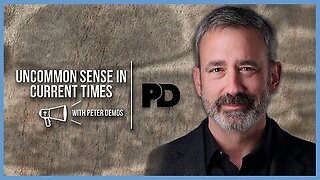 51:58
51:58
PMG
7 hours ago $0.94 earned"Can the Government Learn from Elon Musk’s 70% Labor Cut? A Deep Dive into Inefficient Agencies"
18.6K -
 LIVE
LIVE
Amish Zaku
6 hours agoRumble Spartans #10 - New Year New Maps
201 watching -
 1:04:58
1:04:58
In The Litter Box w/ Jewels & Catturd
1 day agoNo Tax On Tips! | In the Litter Box w/ Jewels & Catturd – Ep. 722 – 1/17/2025
141K32 -
 5:35:39
5:35:39
Dr Disrespect
12 hours ago🔴LIVE - DR DISRESPECT - WARZONE - CRAZY CHALLENGES
164K33 -
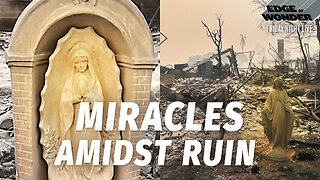 1:16:30
1:16:30
Edge of Wonder
8 hours agoLA Fire Updates: Miracles Amidst the Devastation
39.1K13 -
 54:54
54:54
LFA TV
12 hours agoBanning Mystery of the Ages | TRUMPET DAILY 1.17.25 7pm
33.3K7 -
 1:47:13
1:47:13
2 MIKES LIVE
6 hours ago2 MIKES LIVE #168 Open Mike Friday!
29K2
